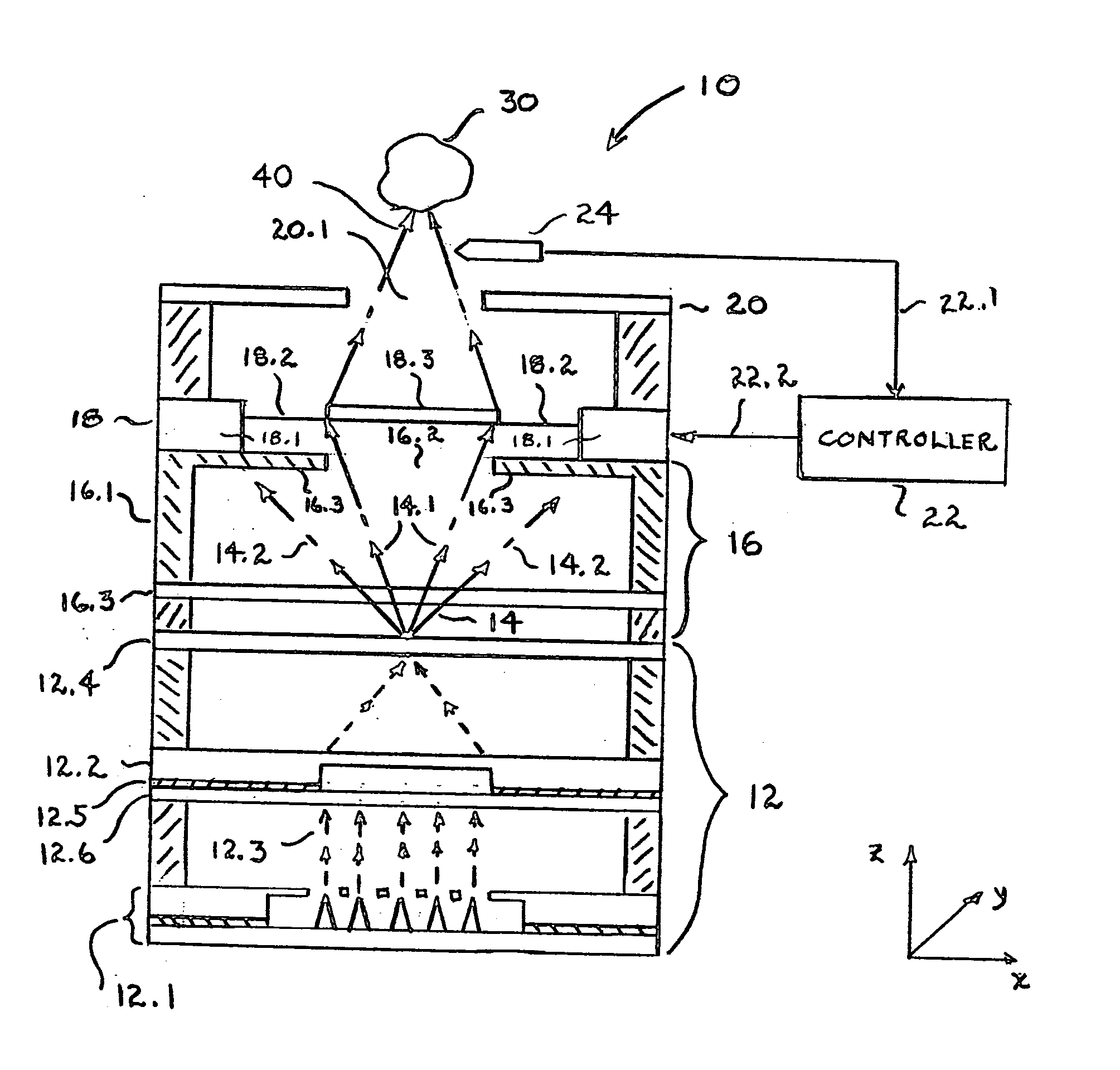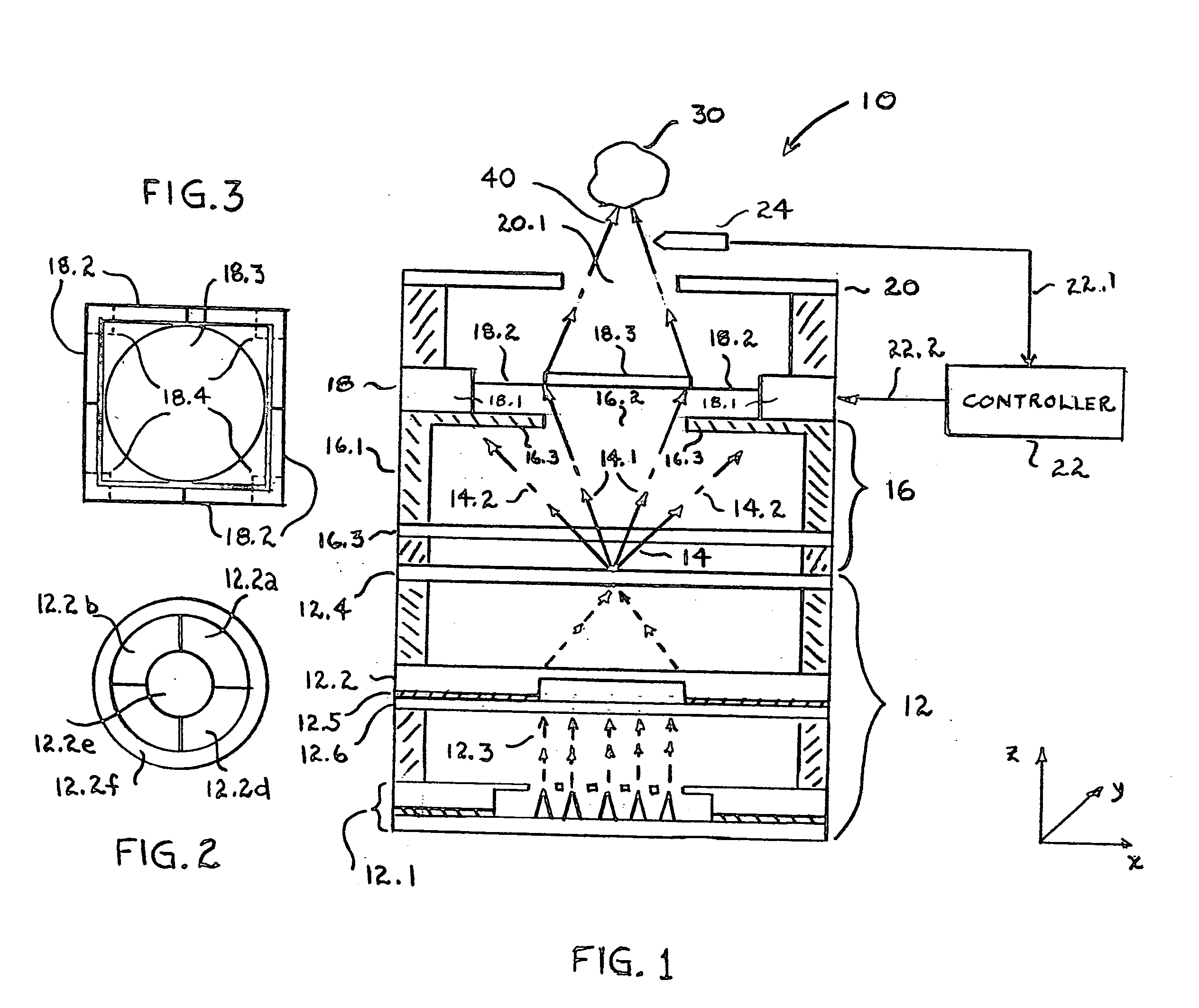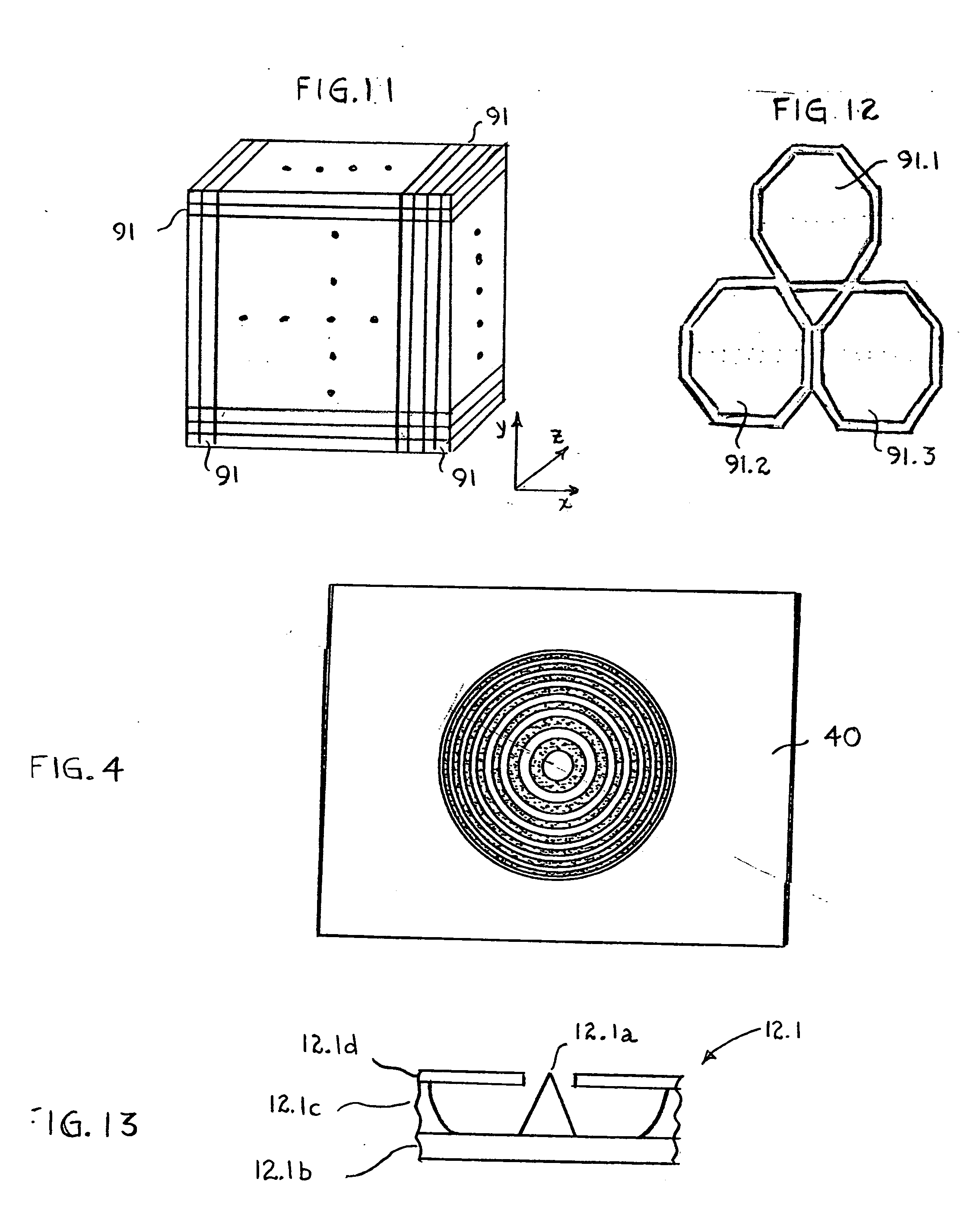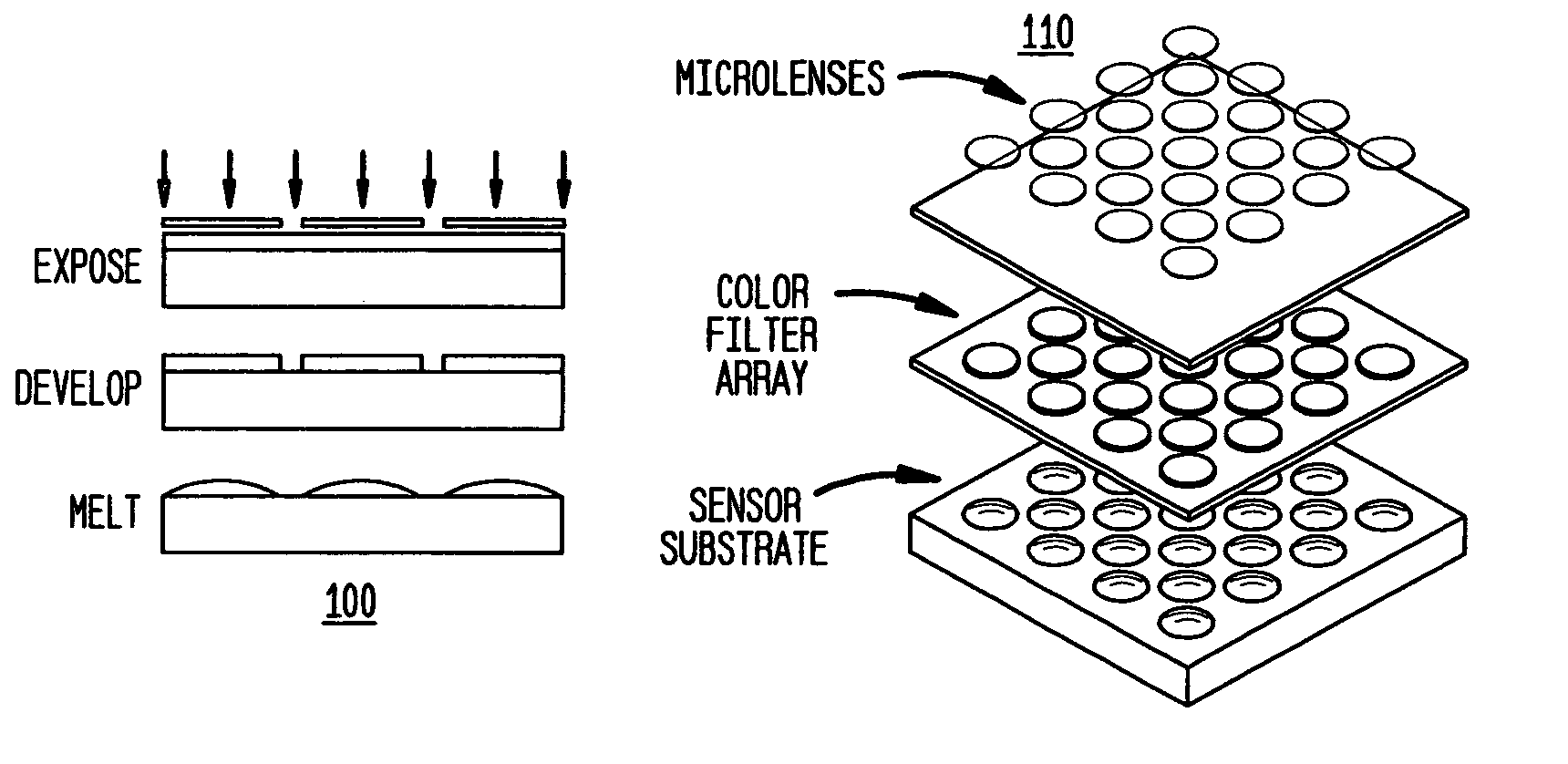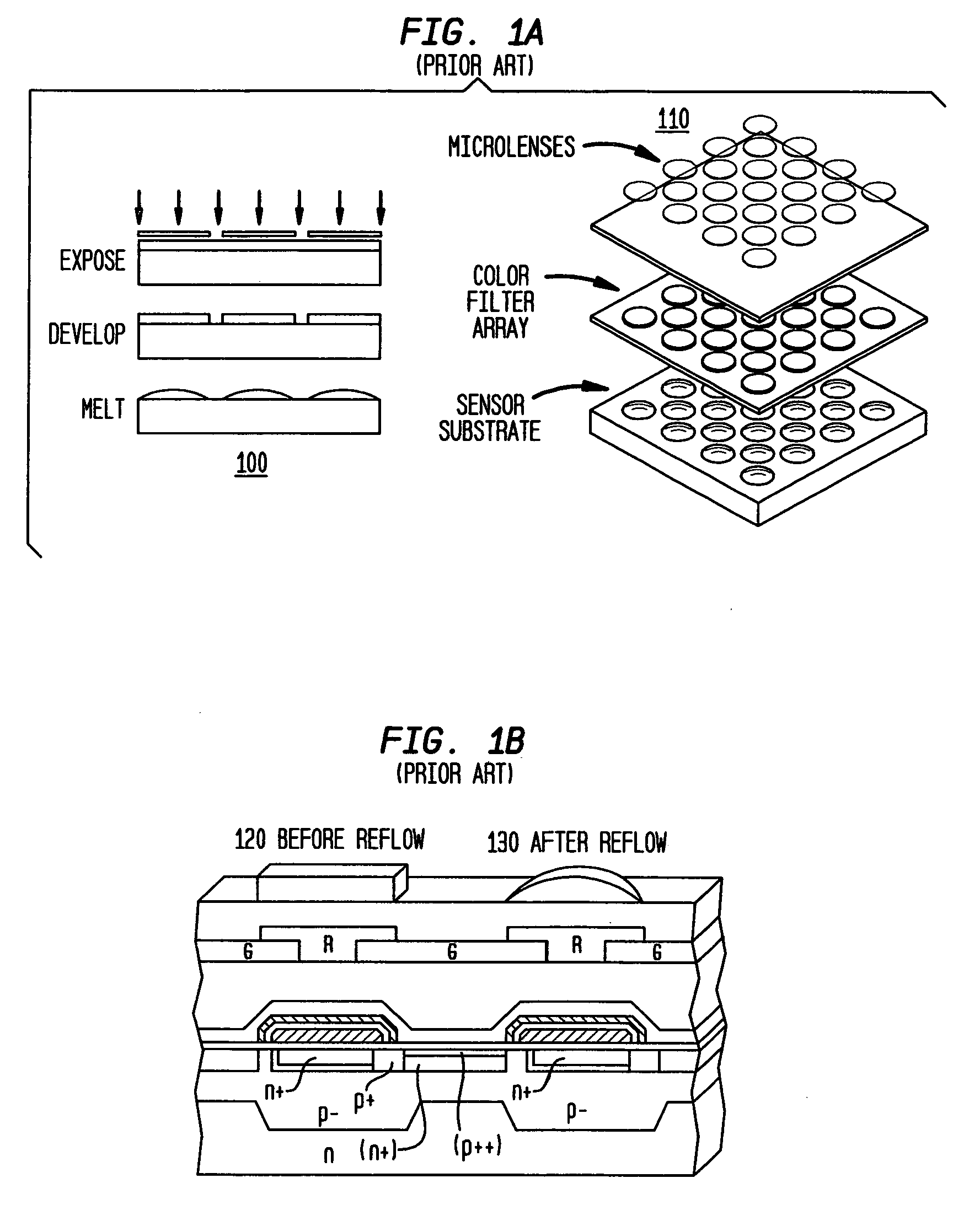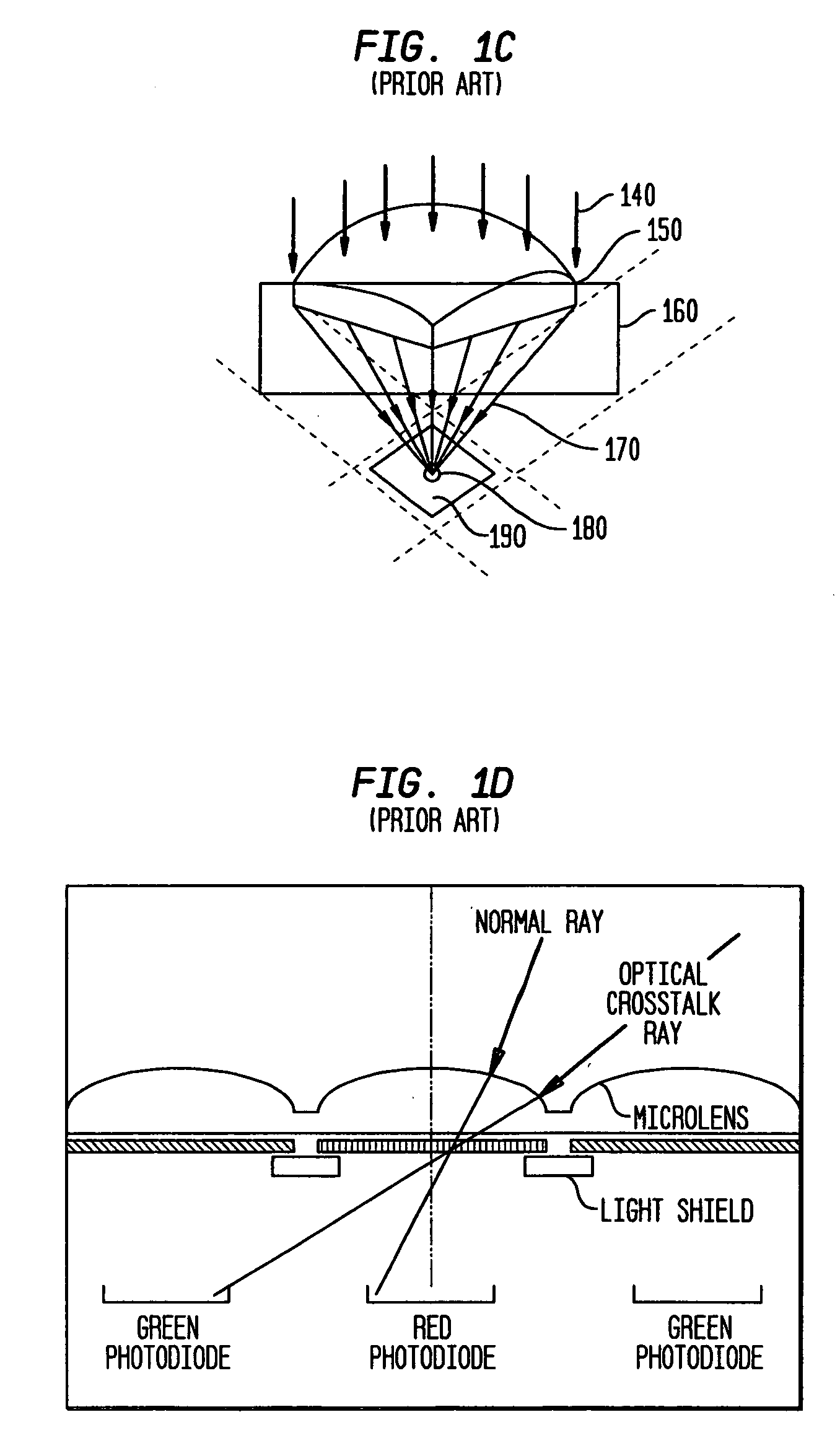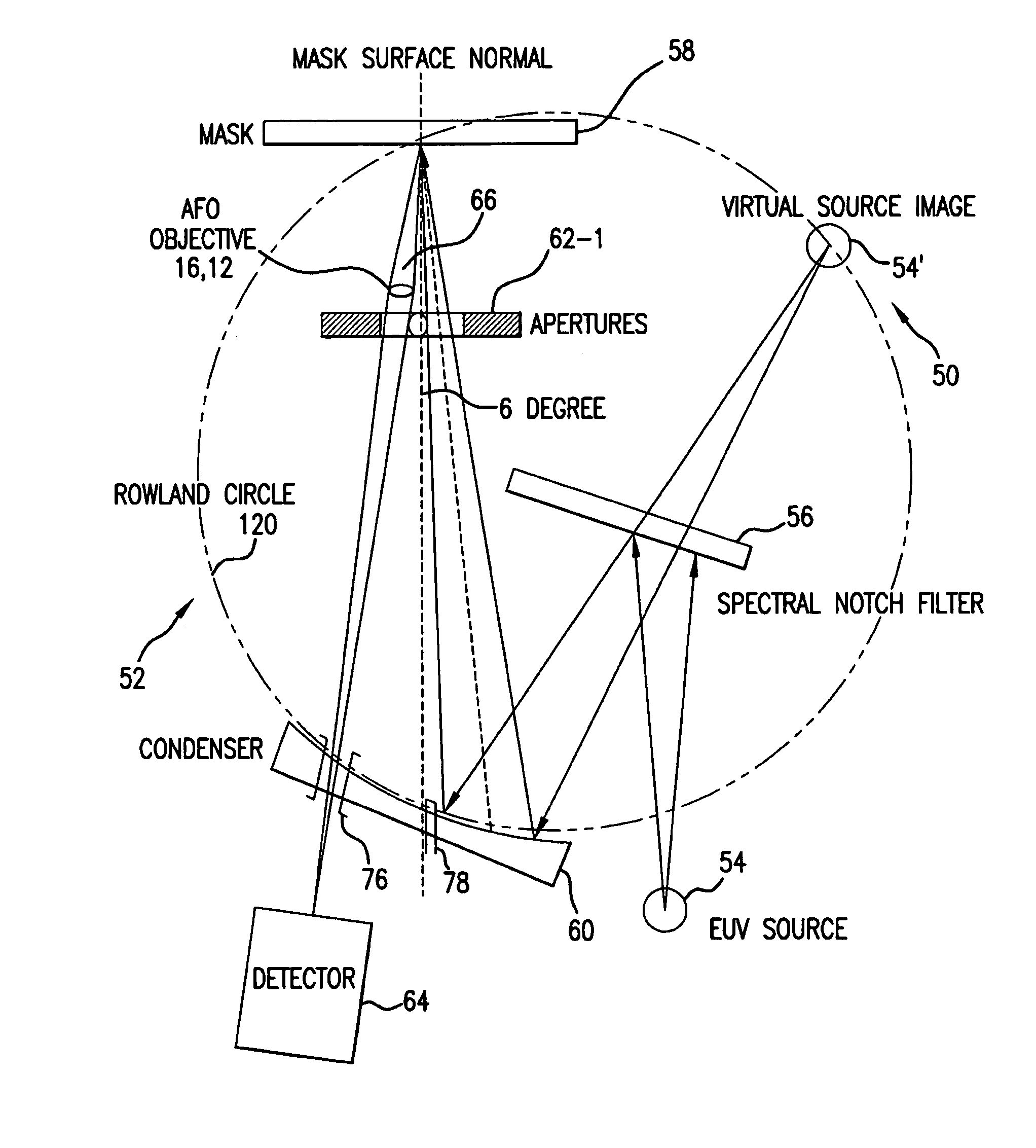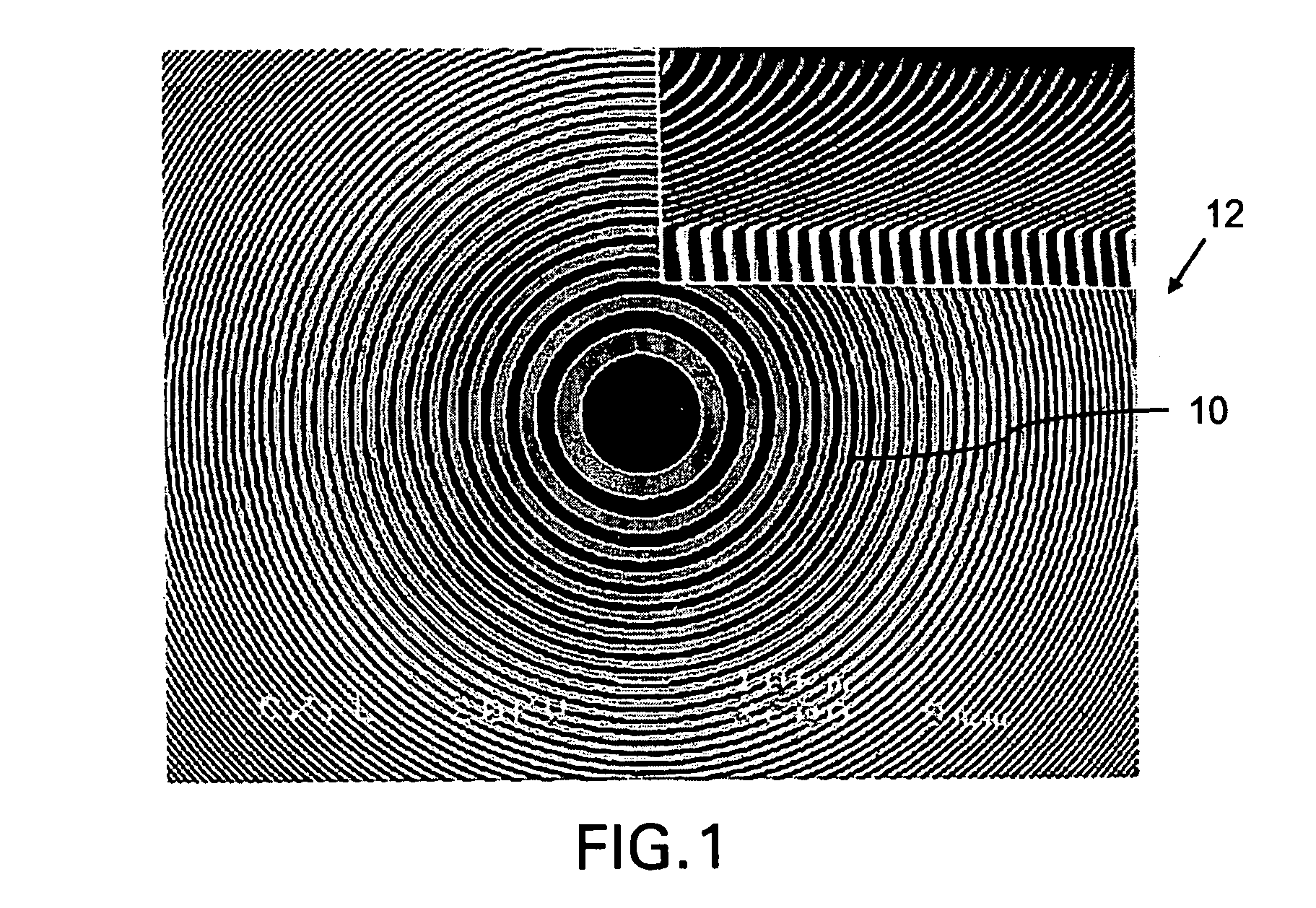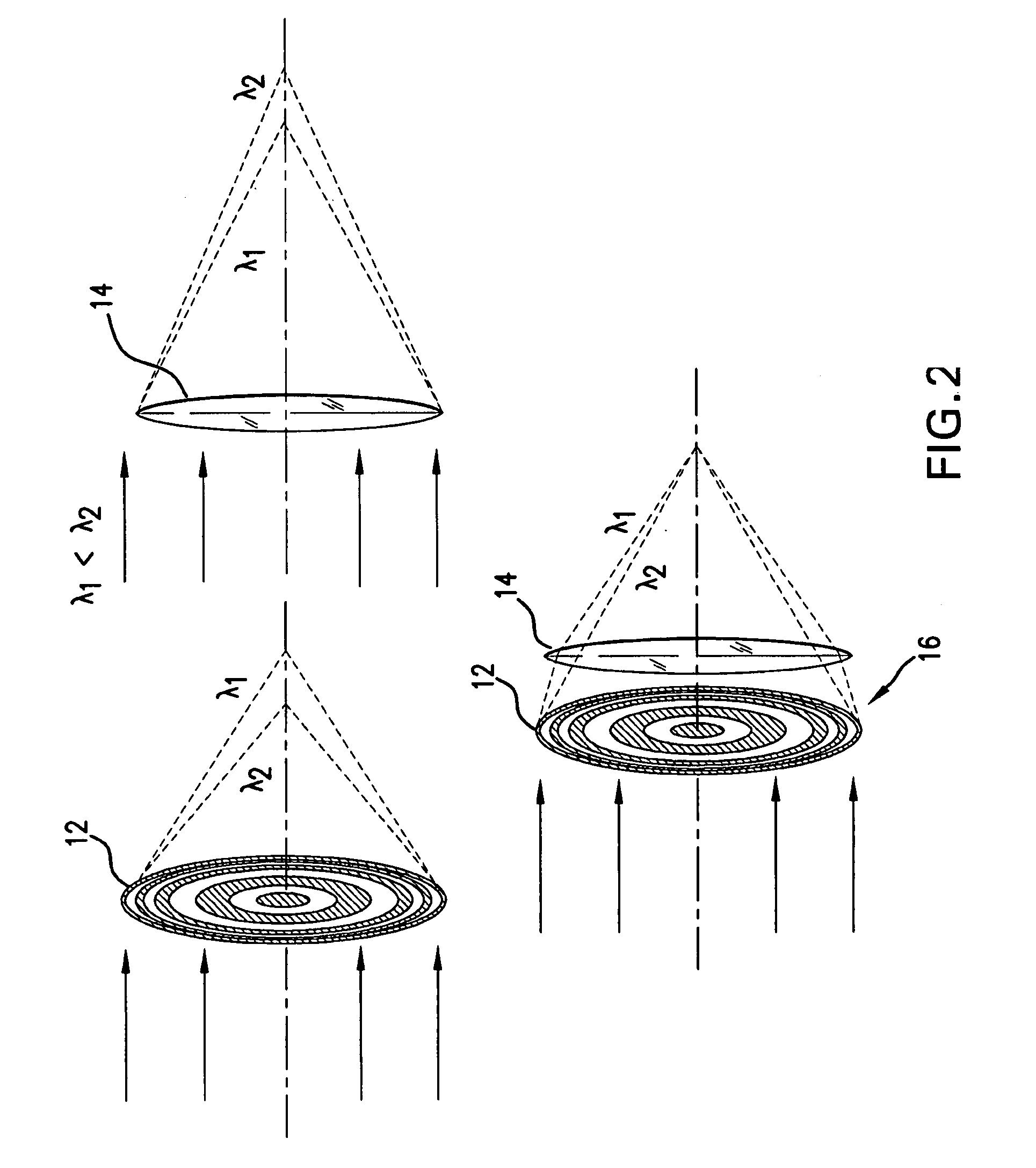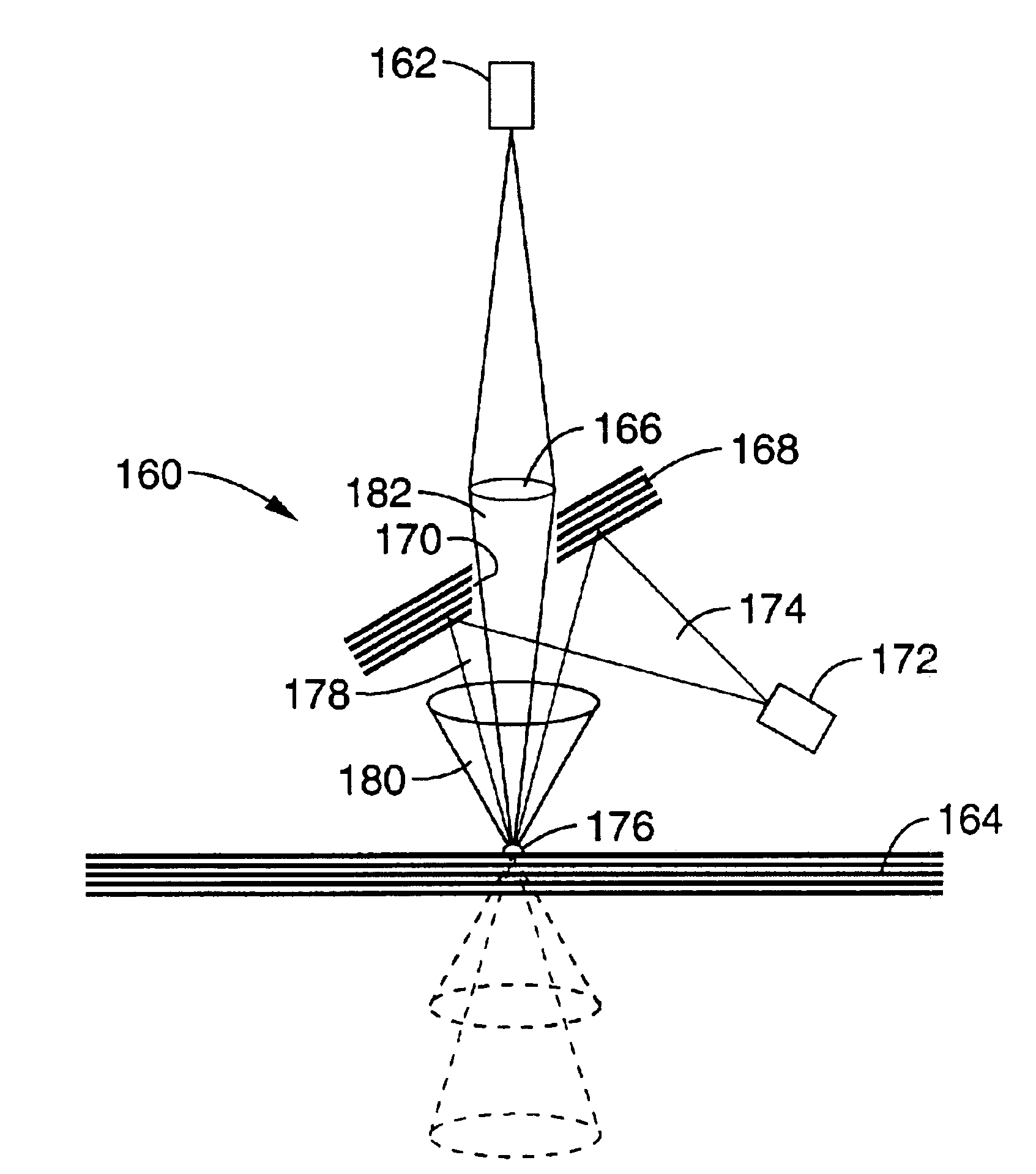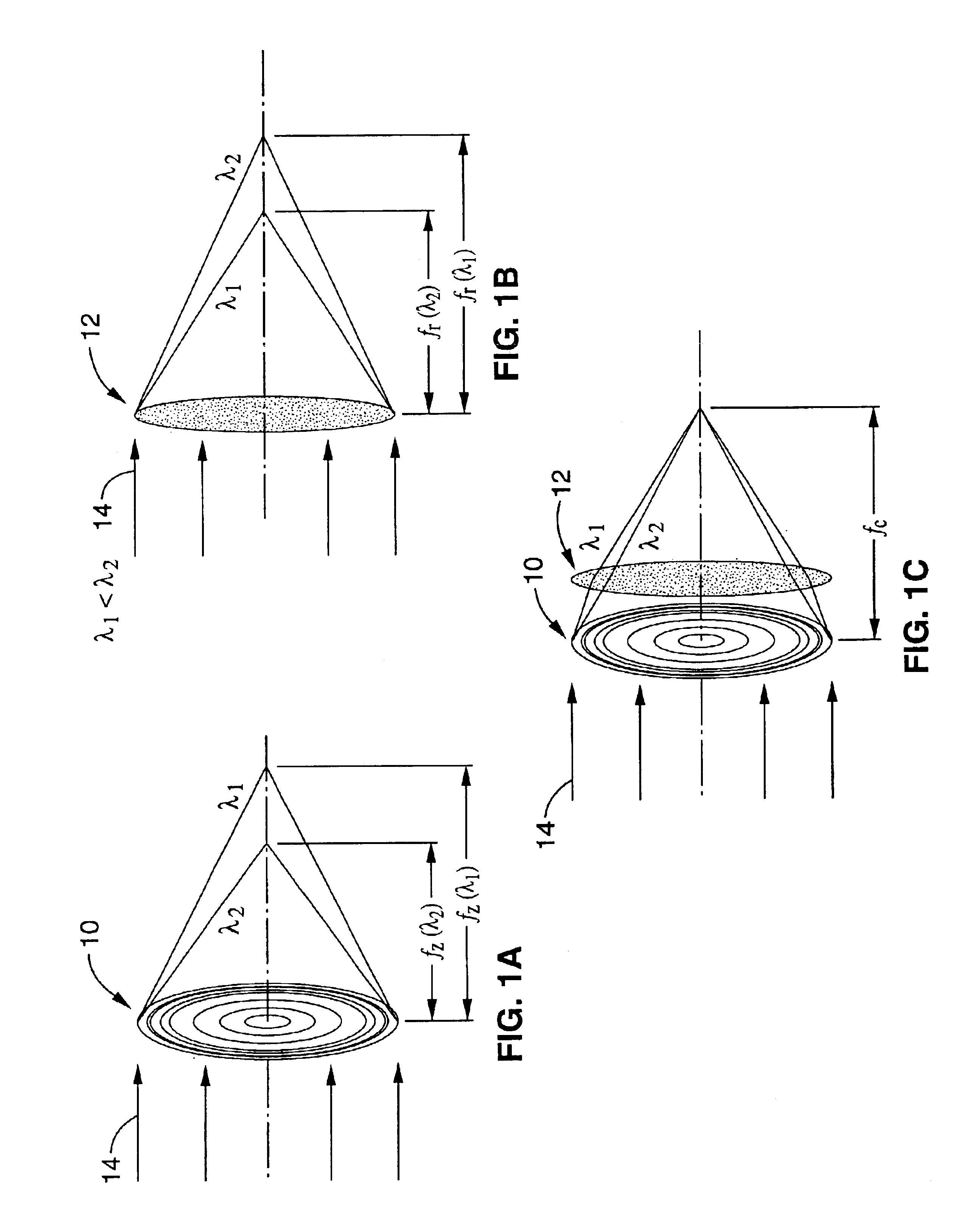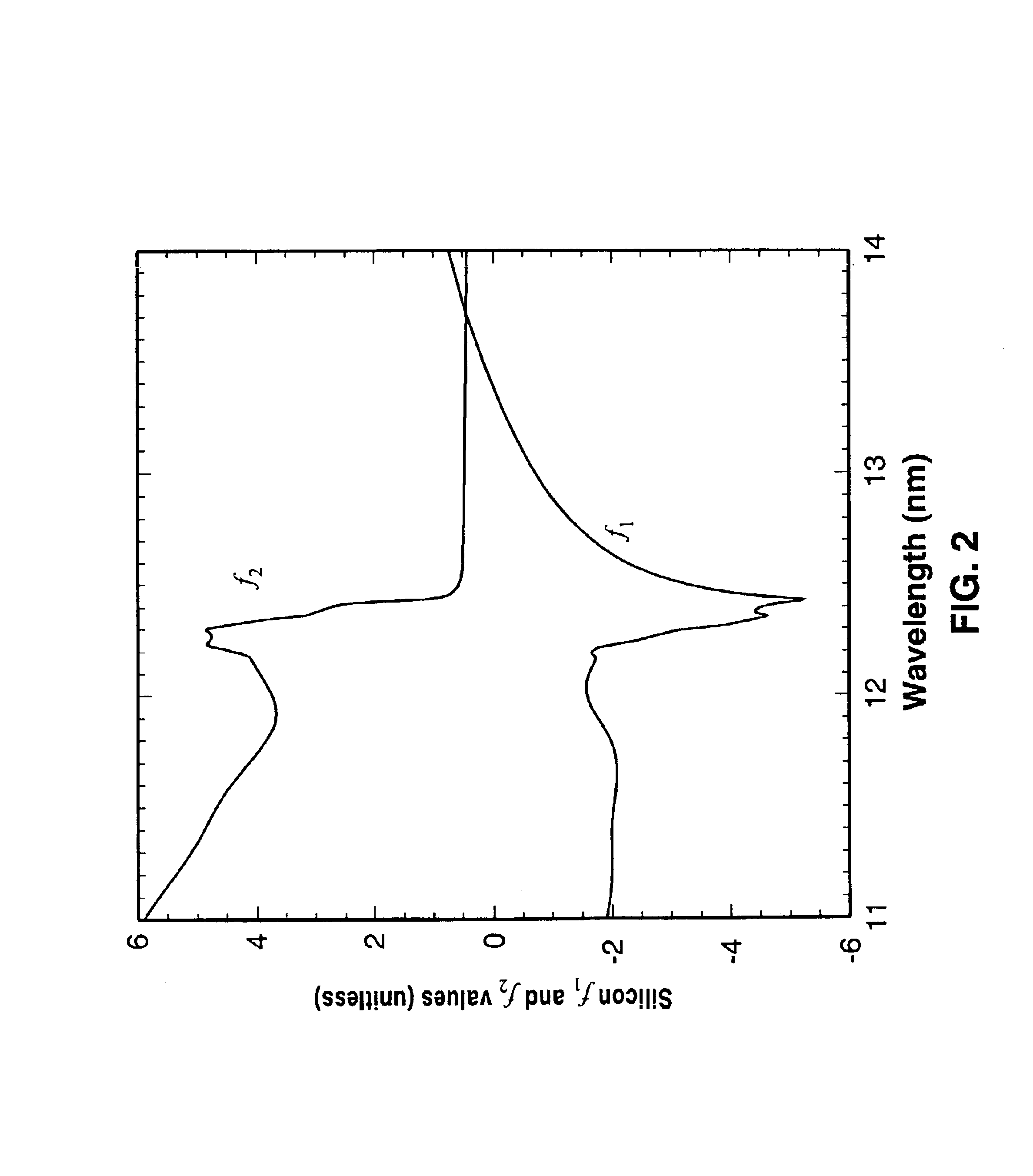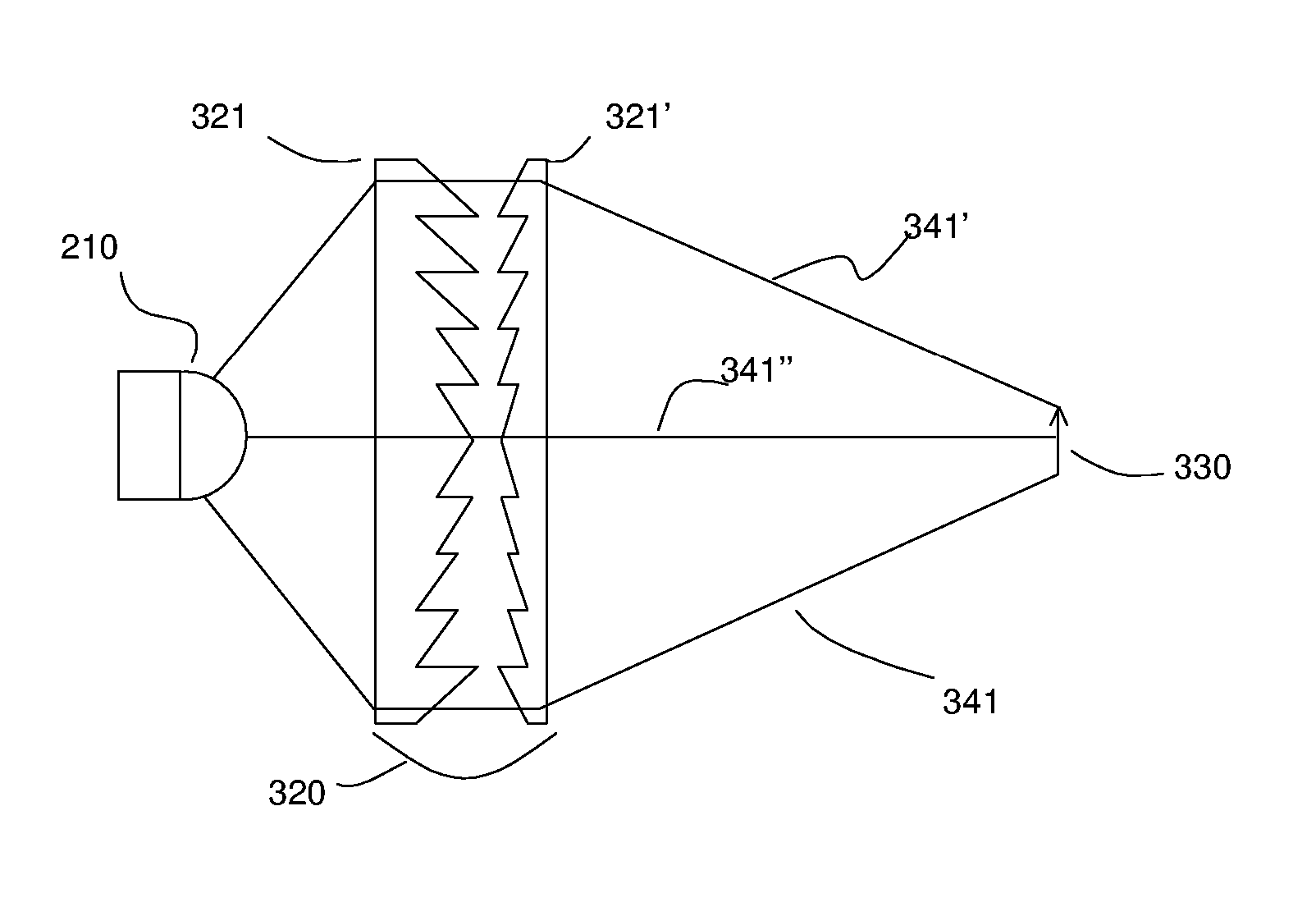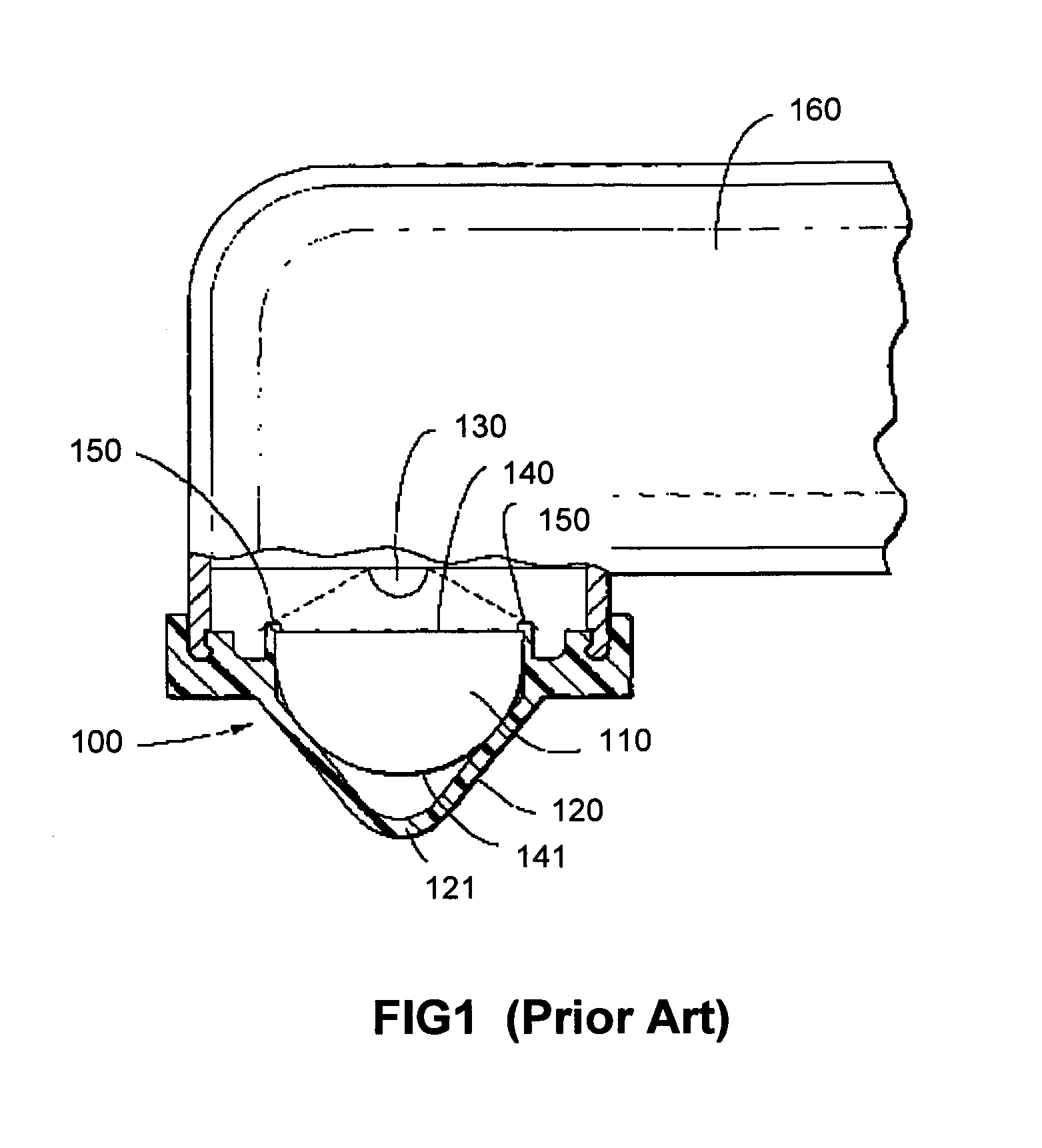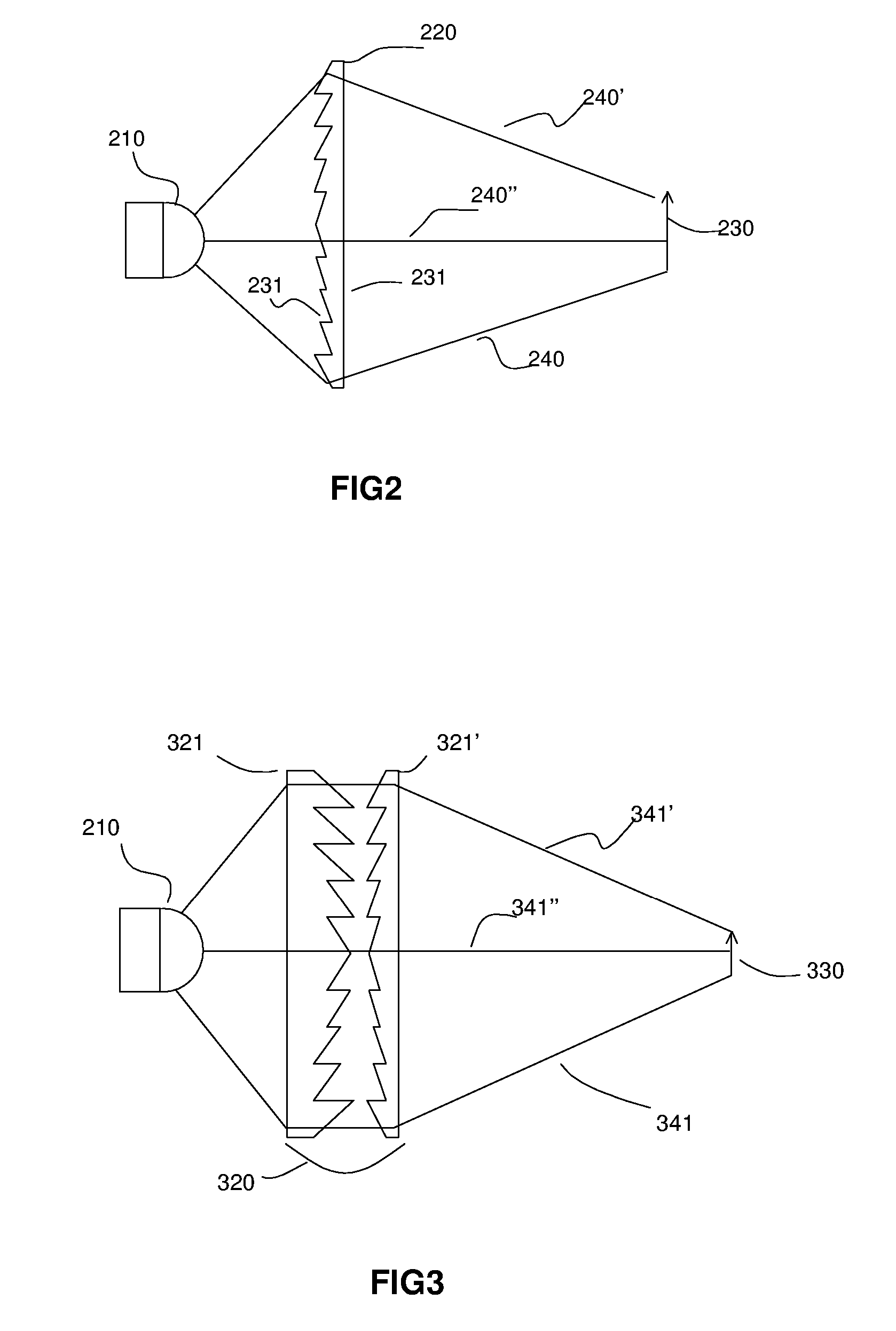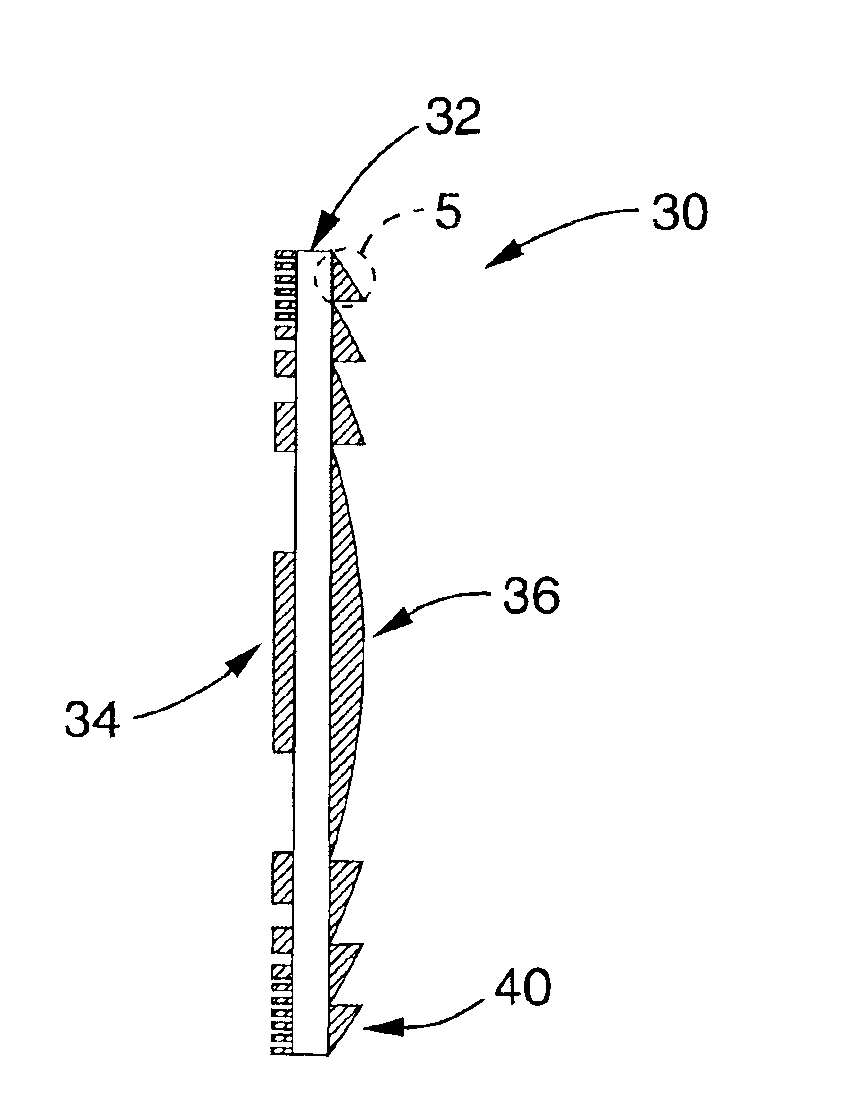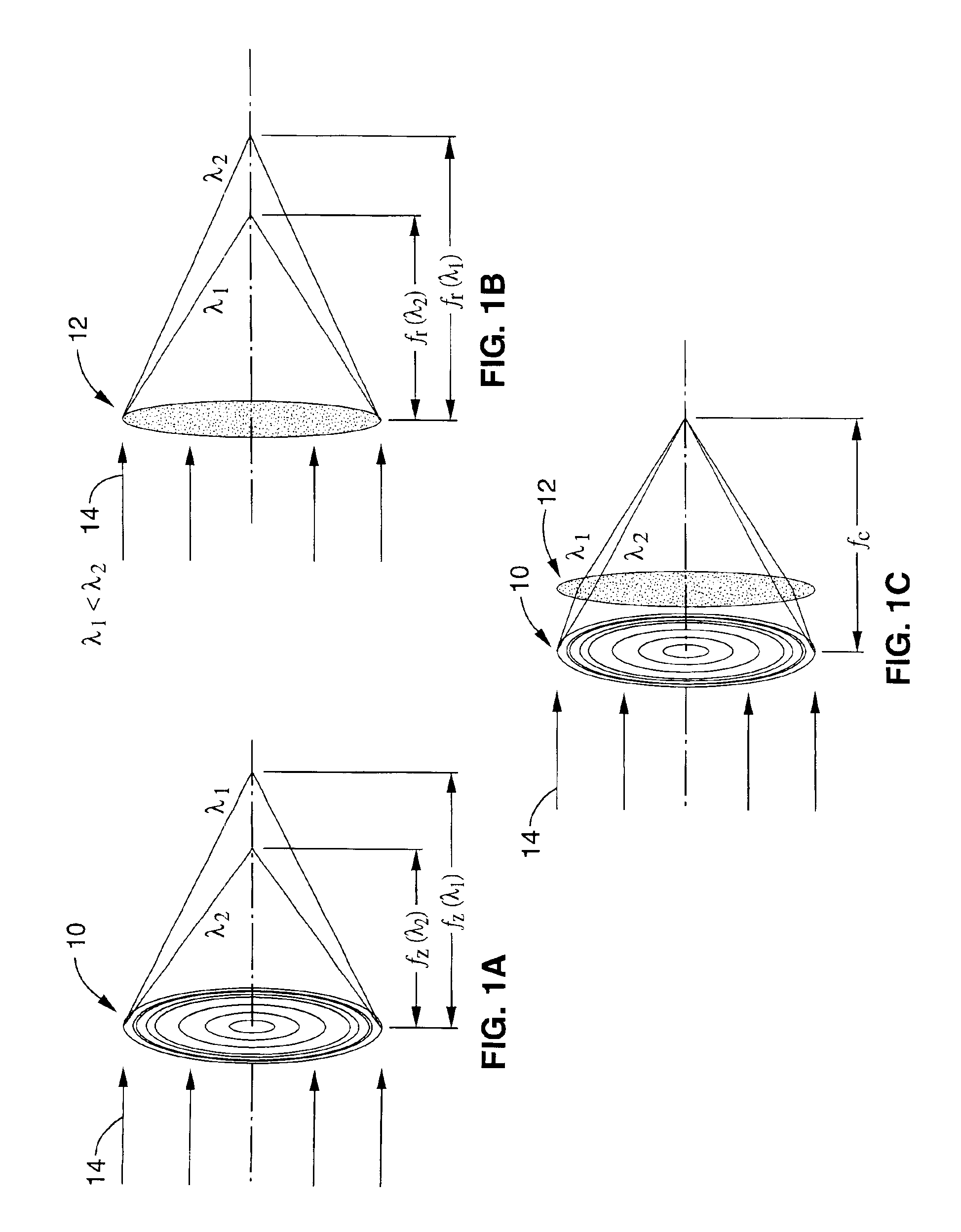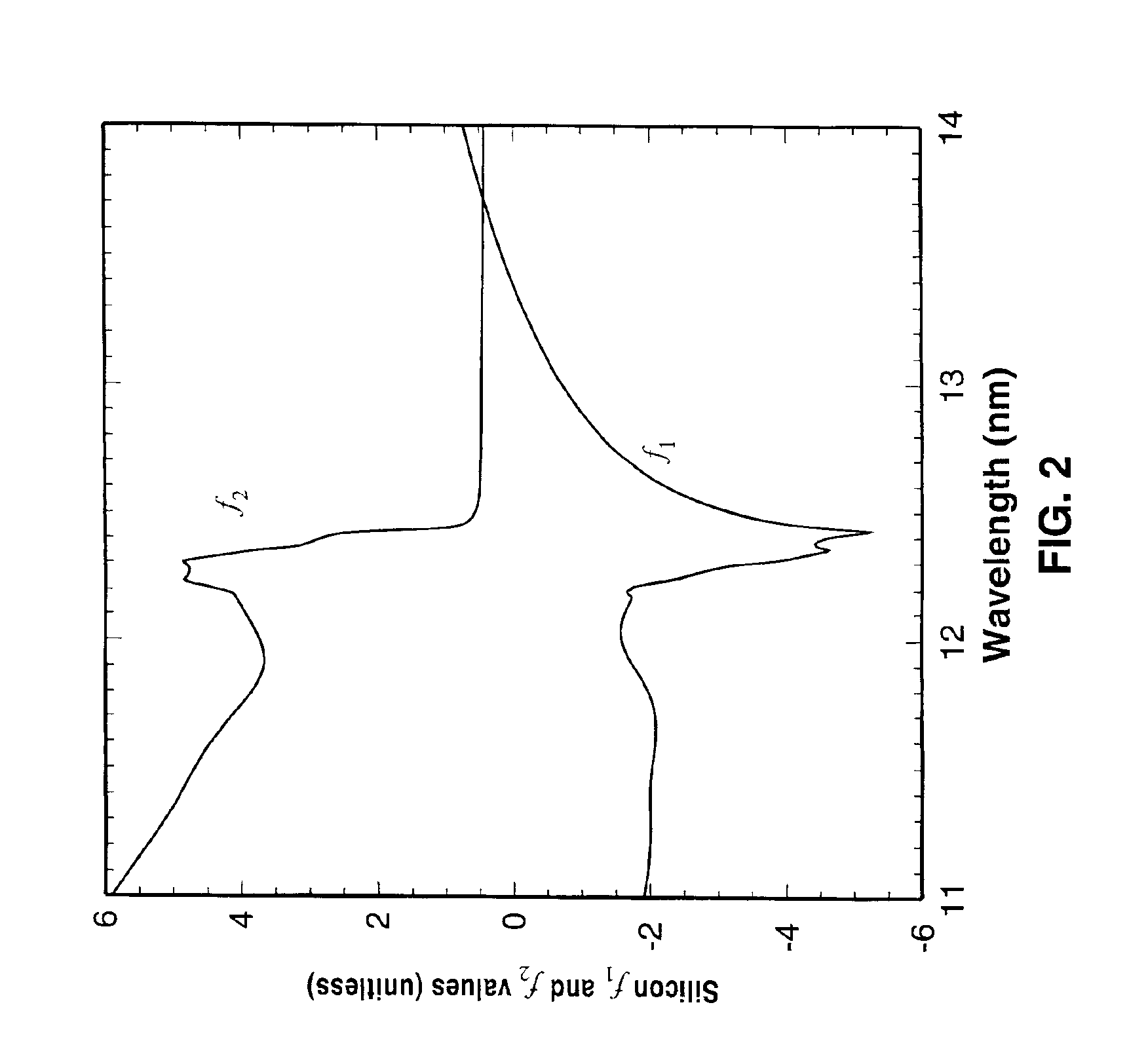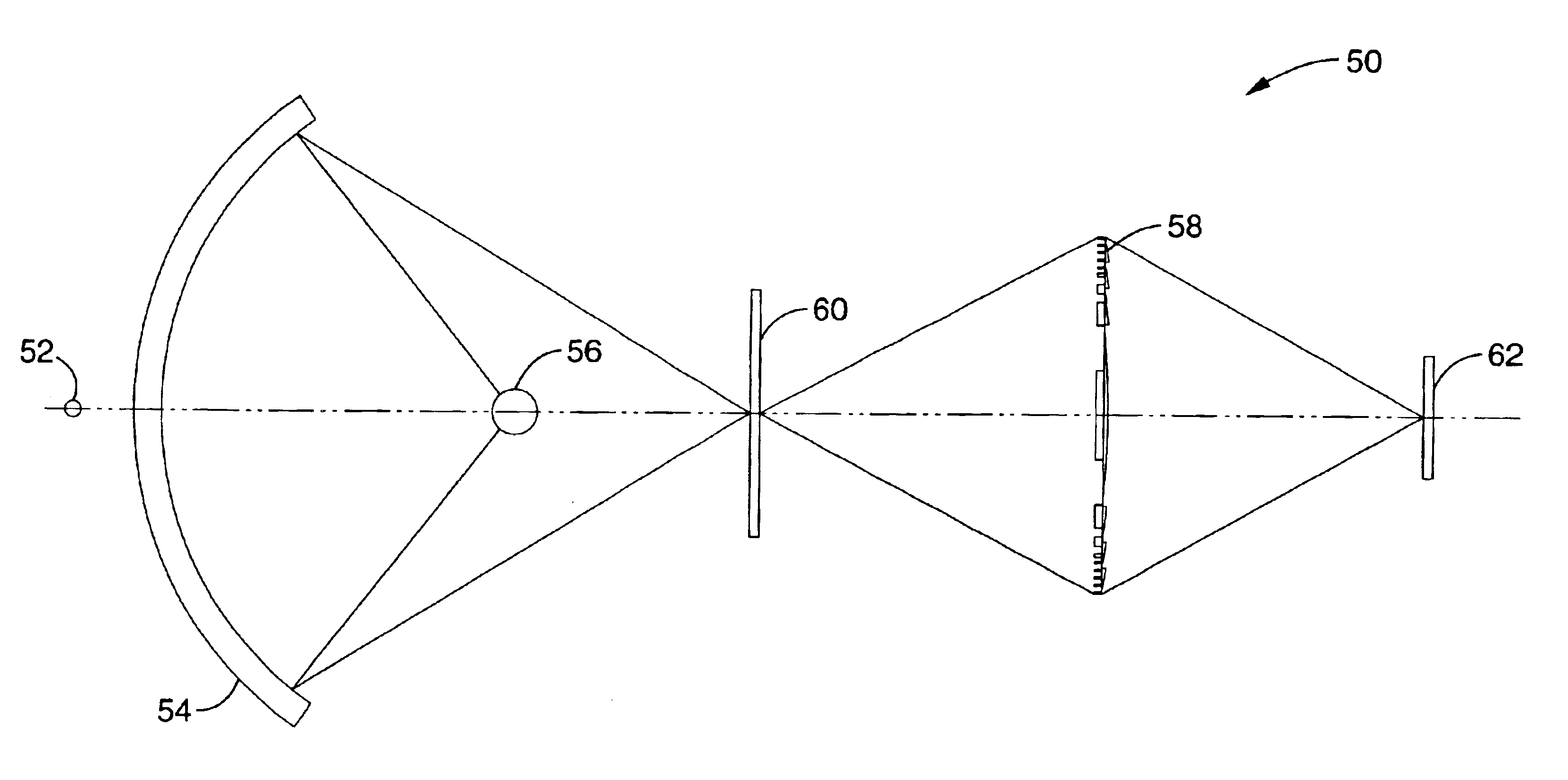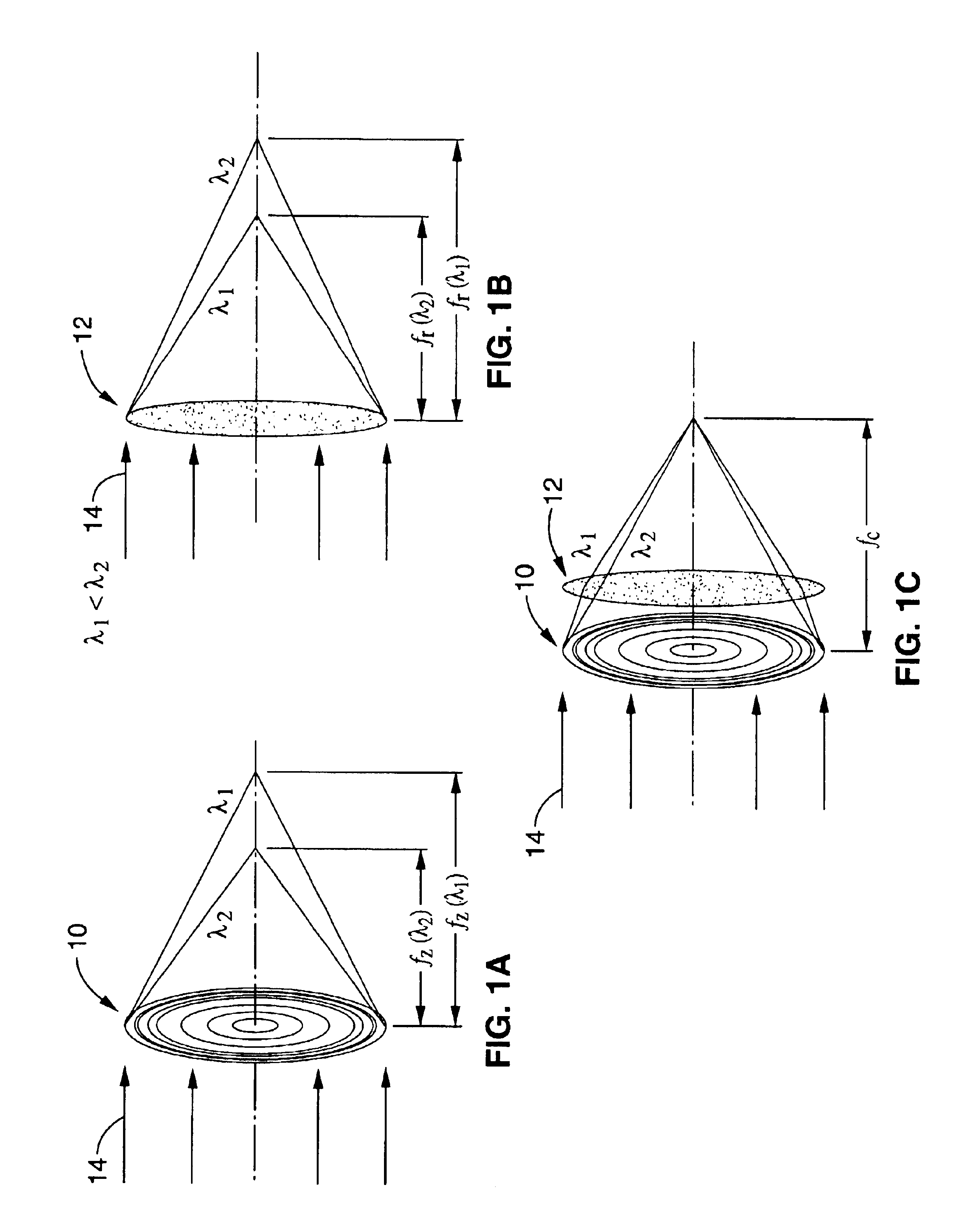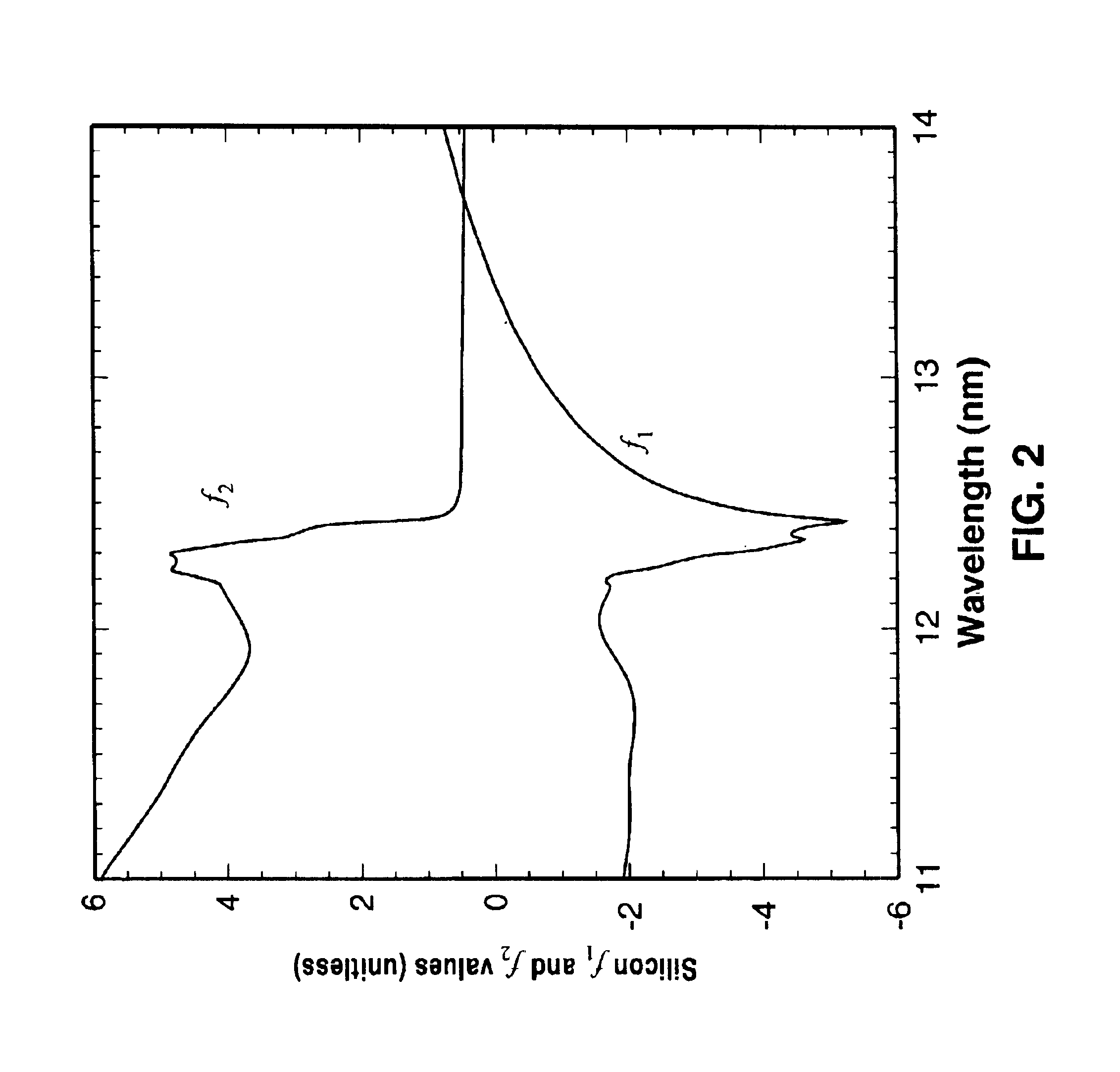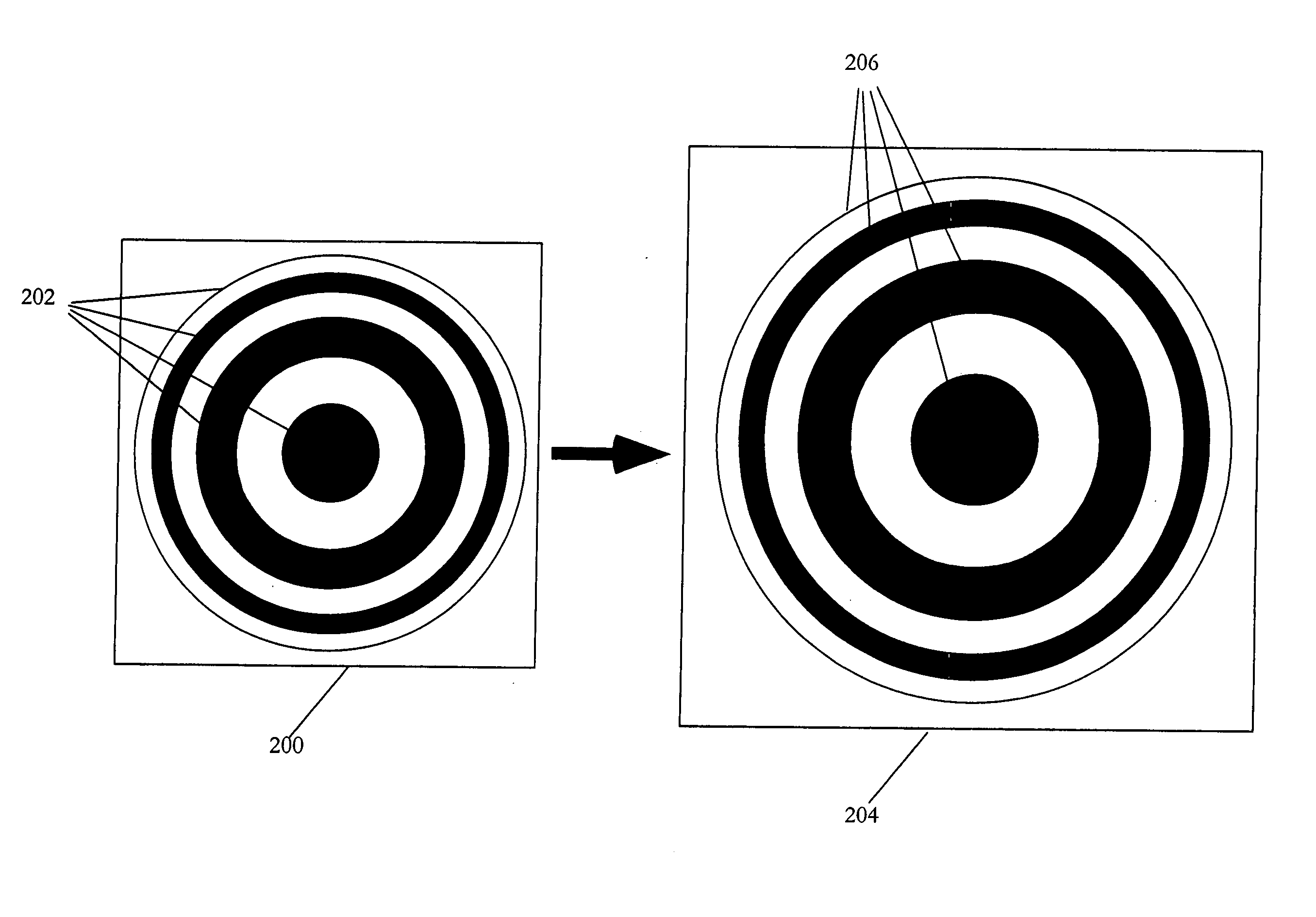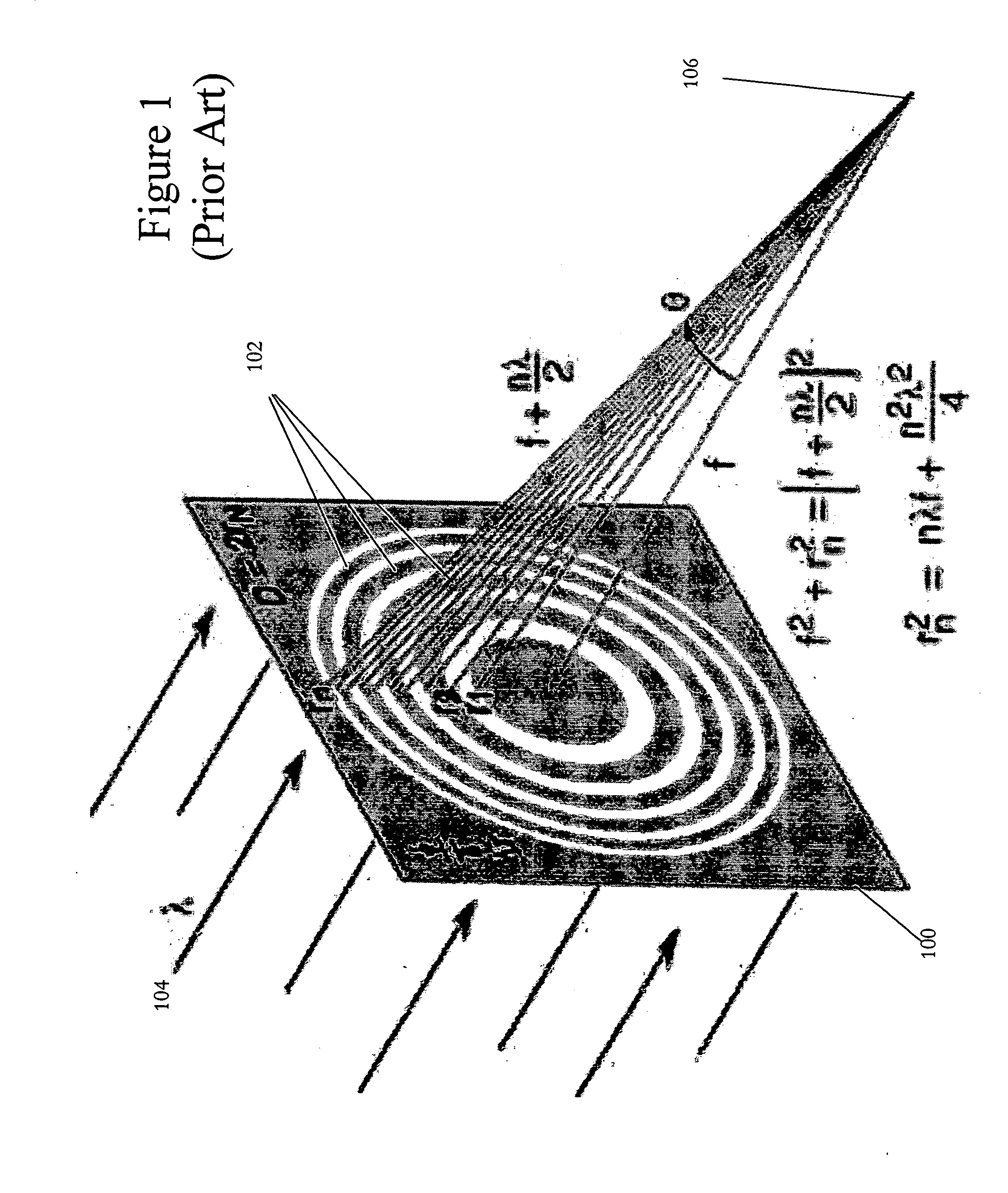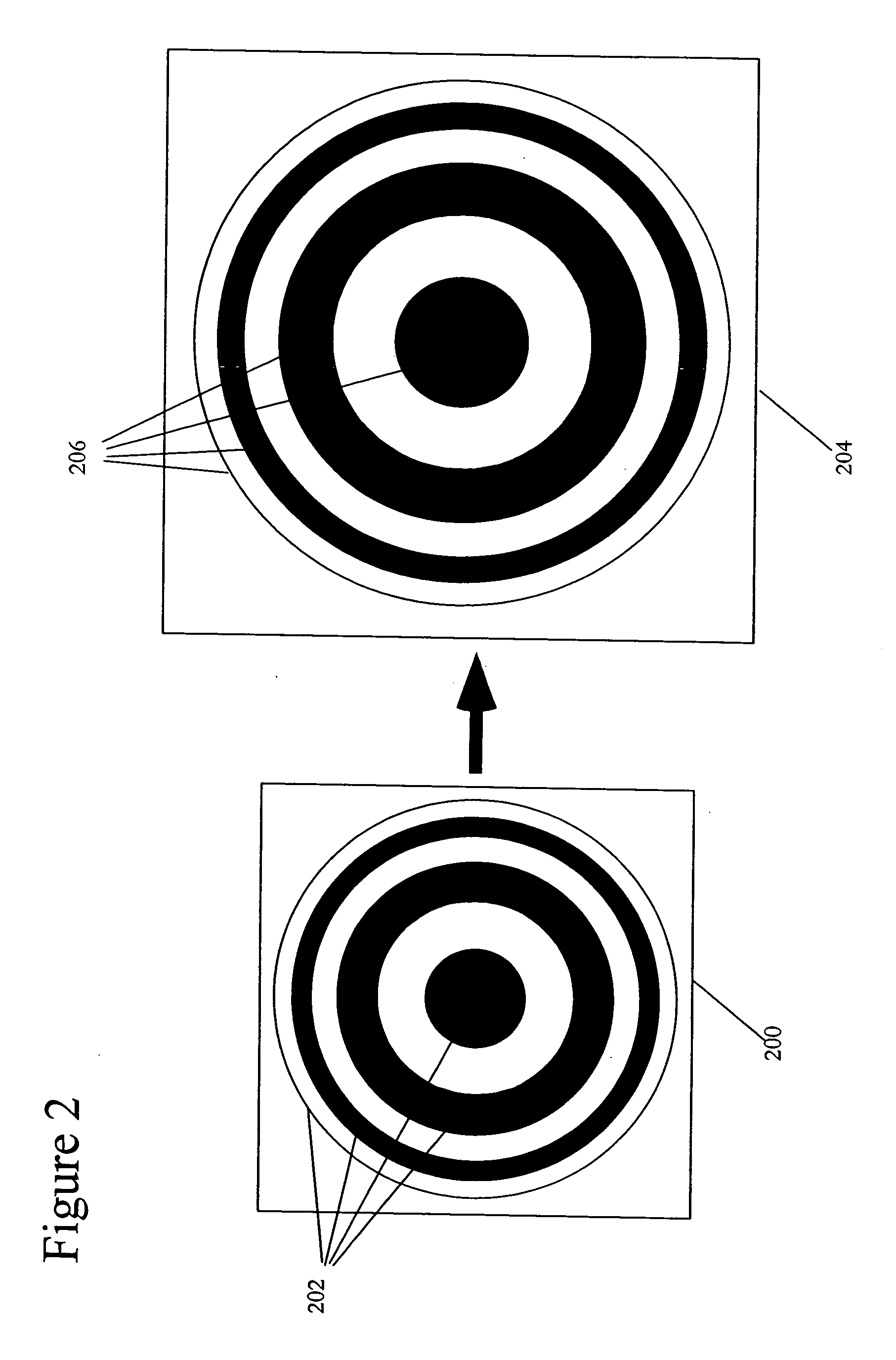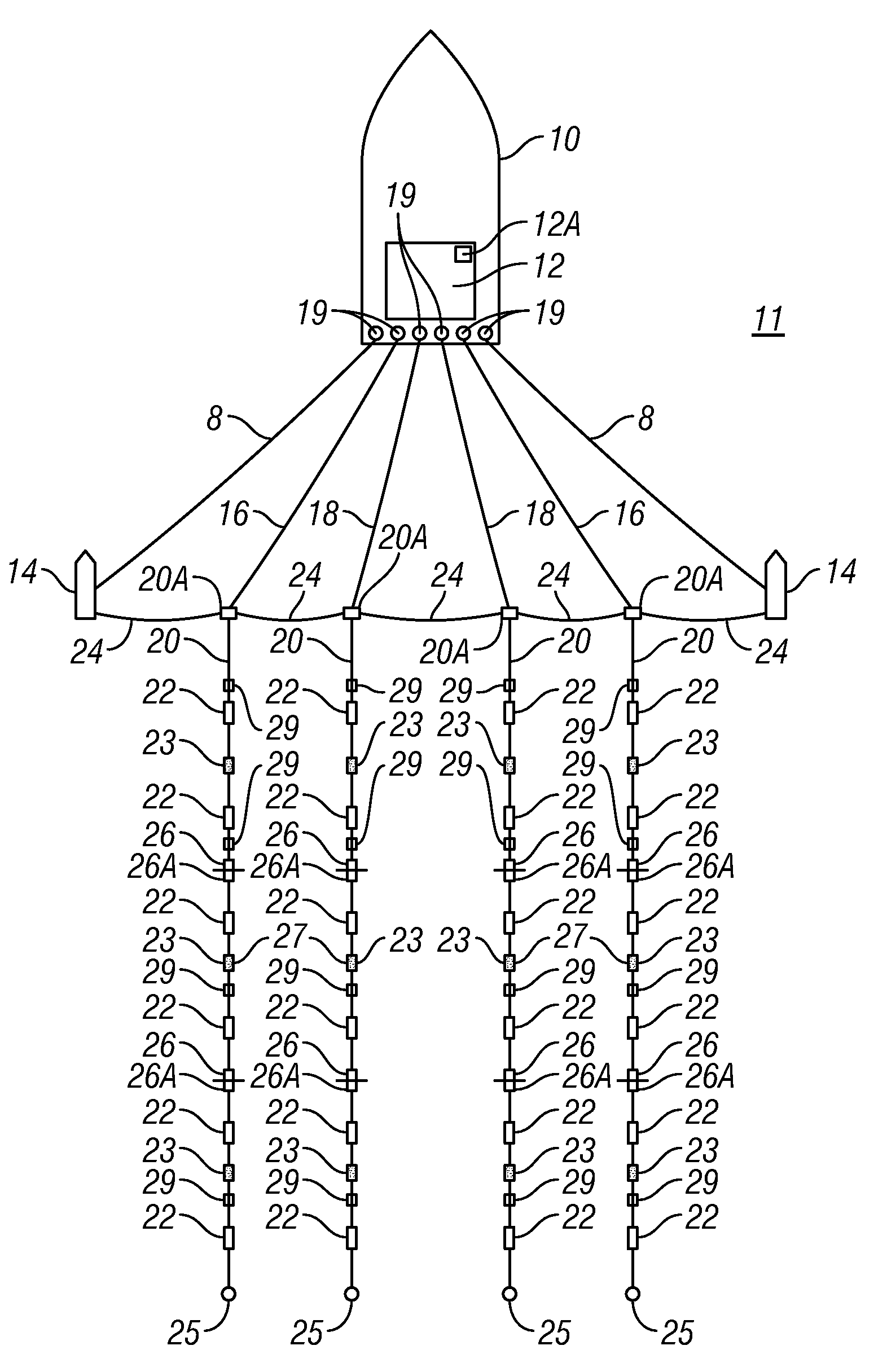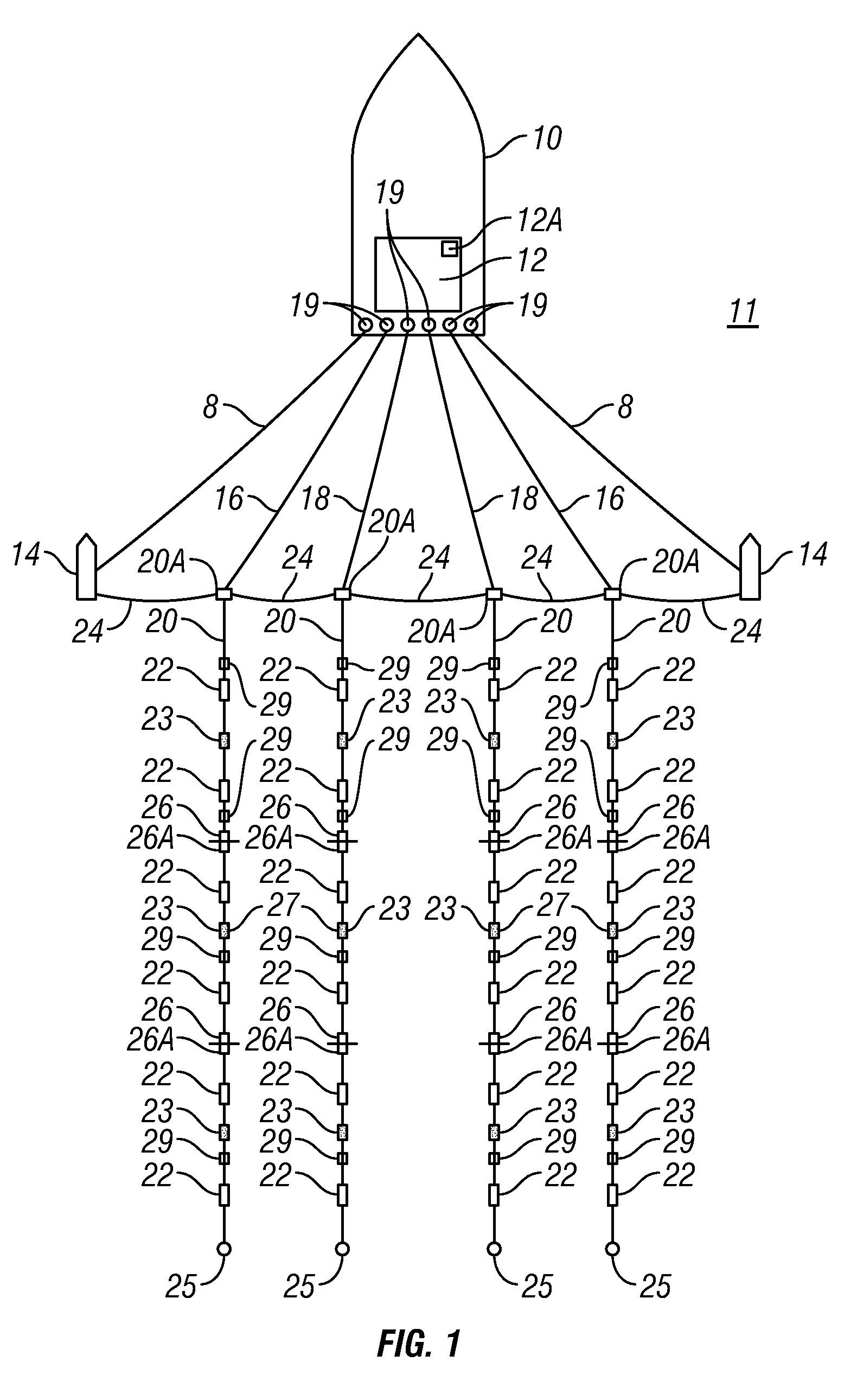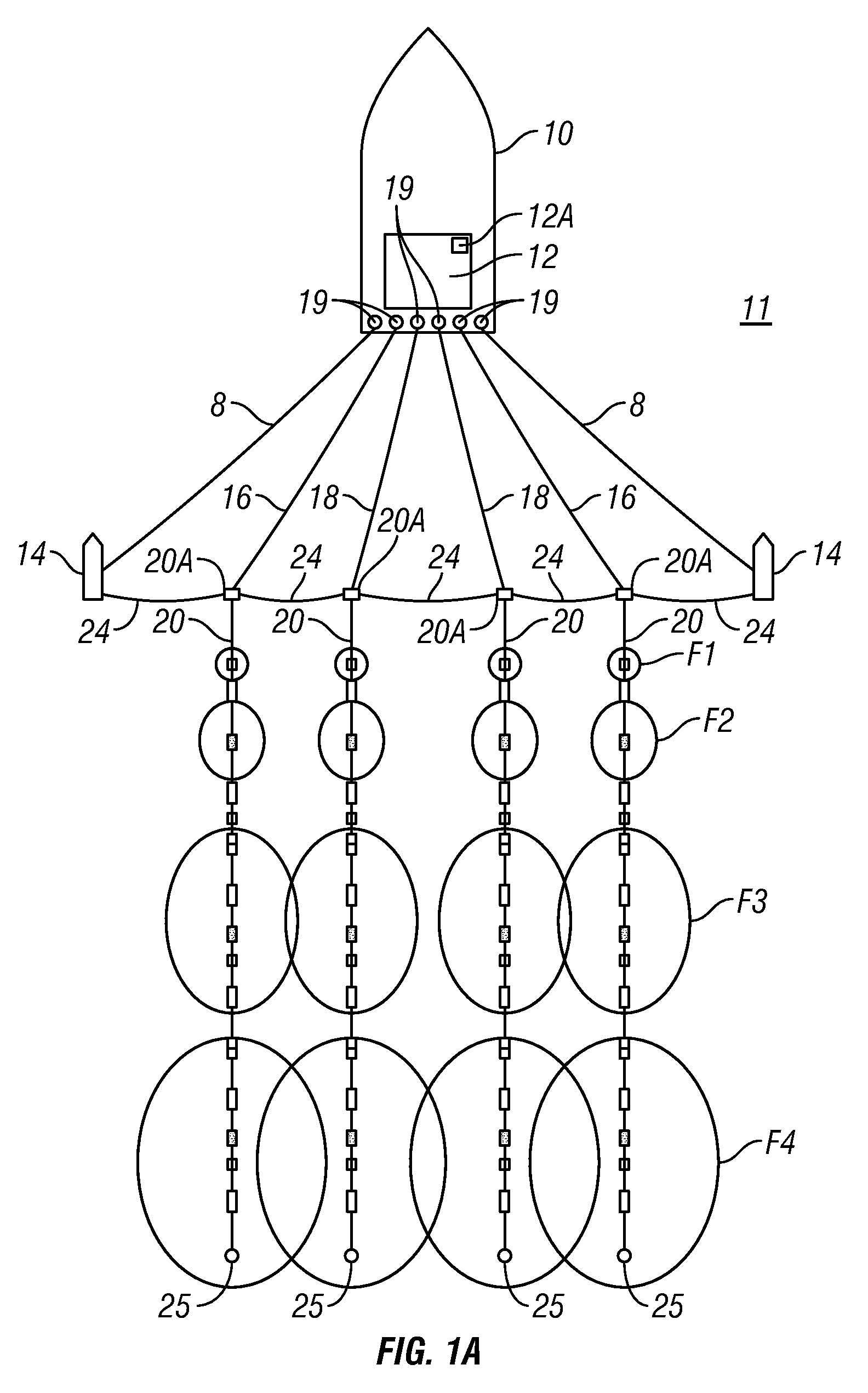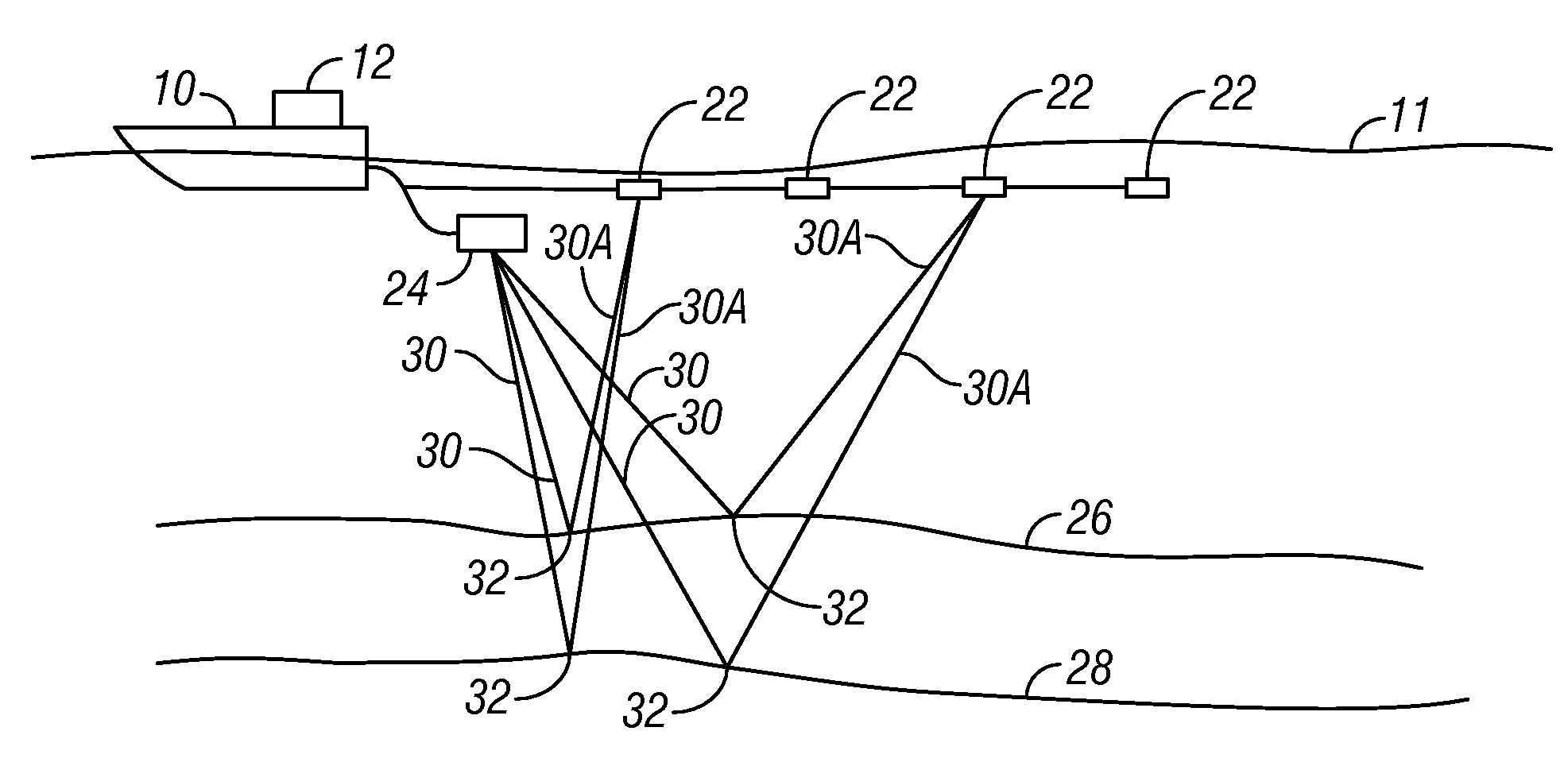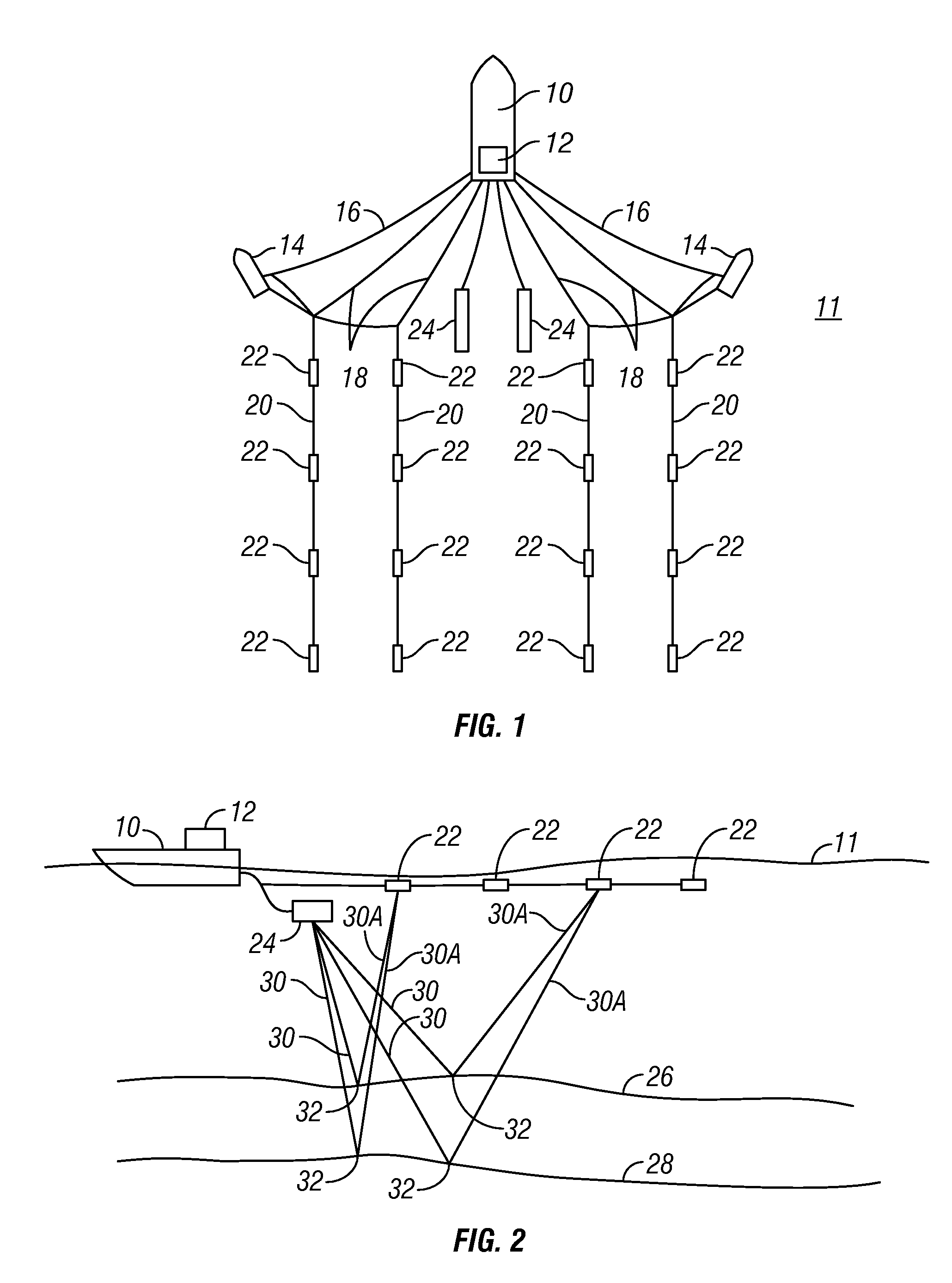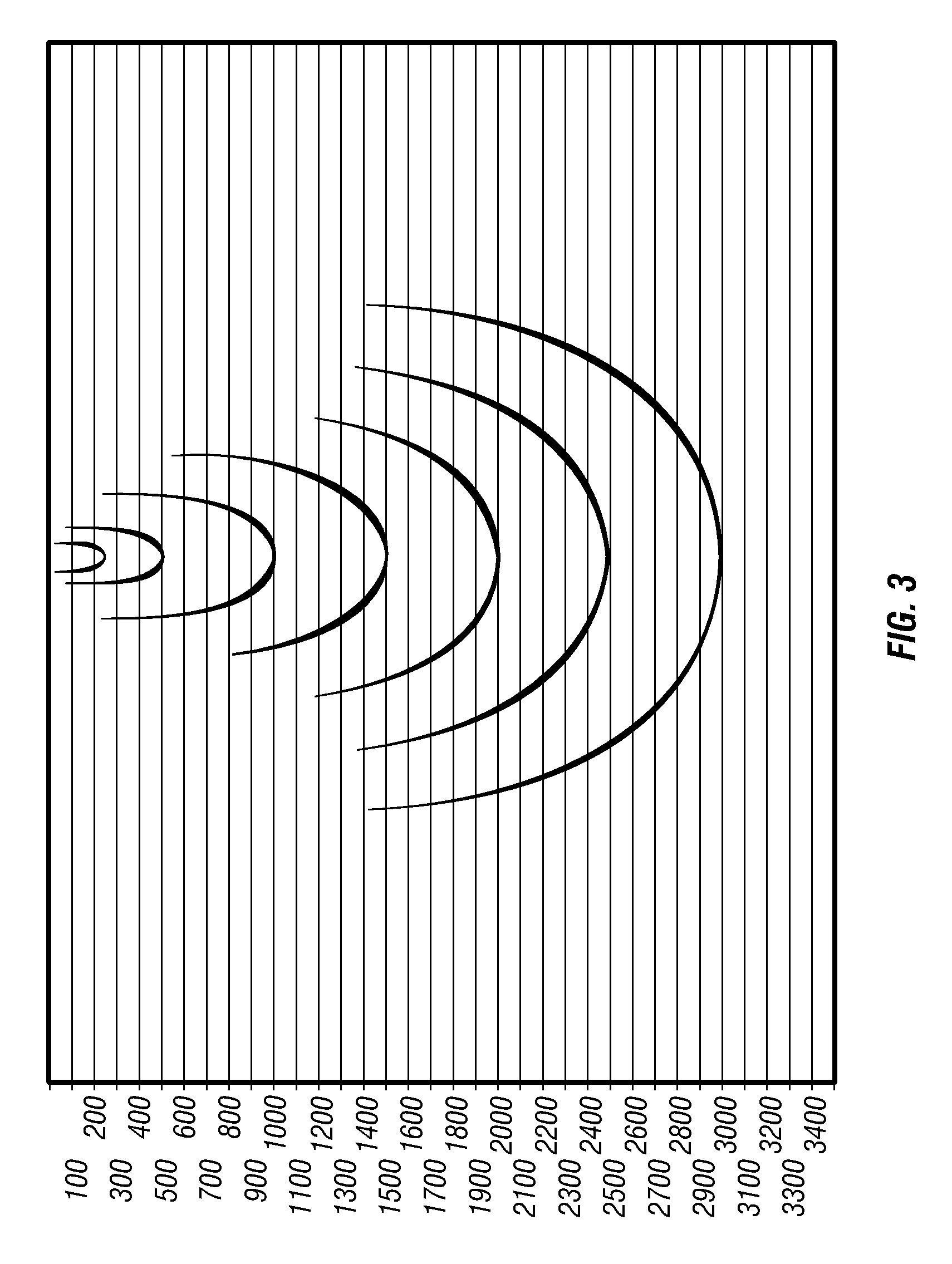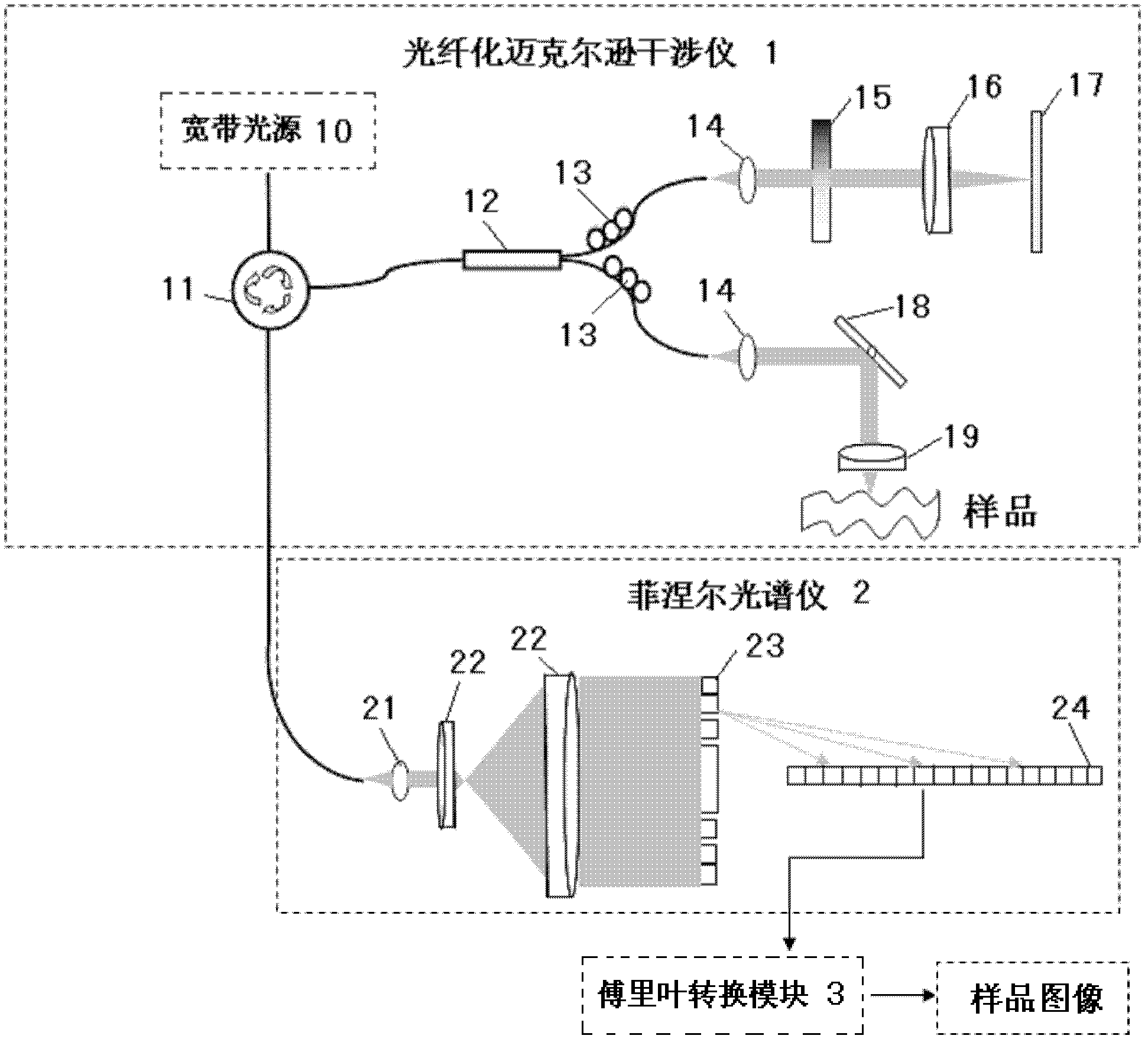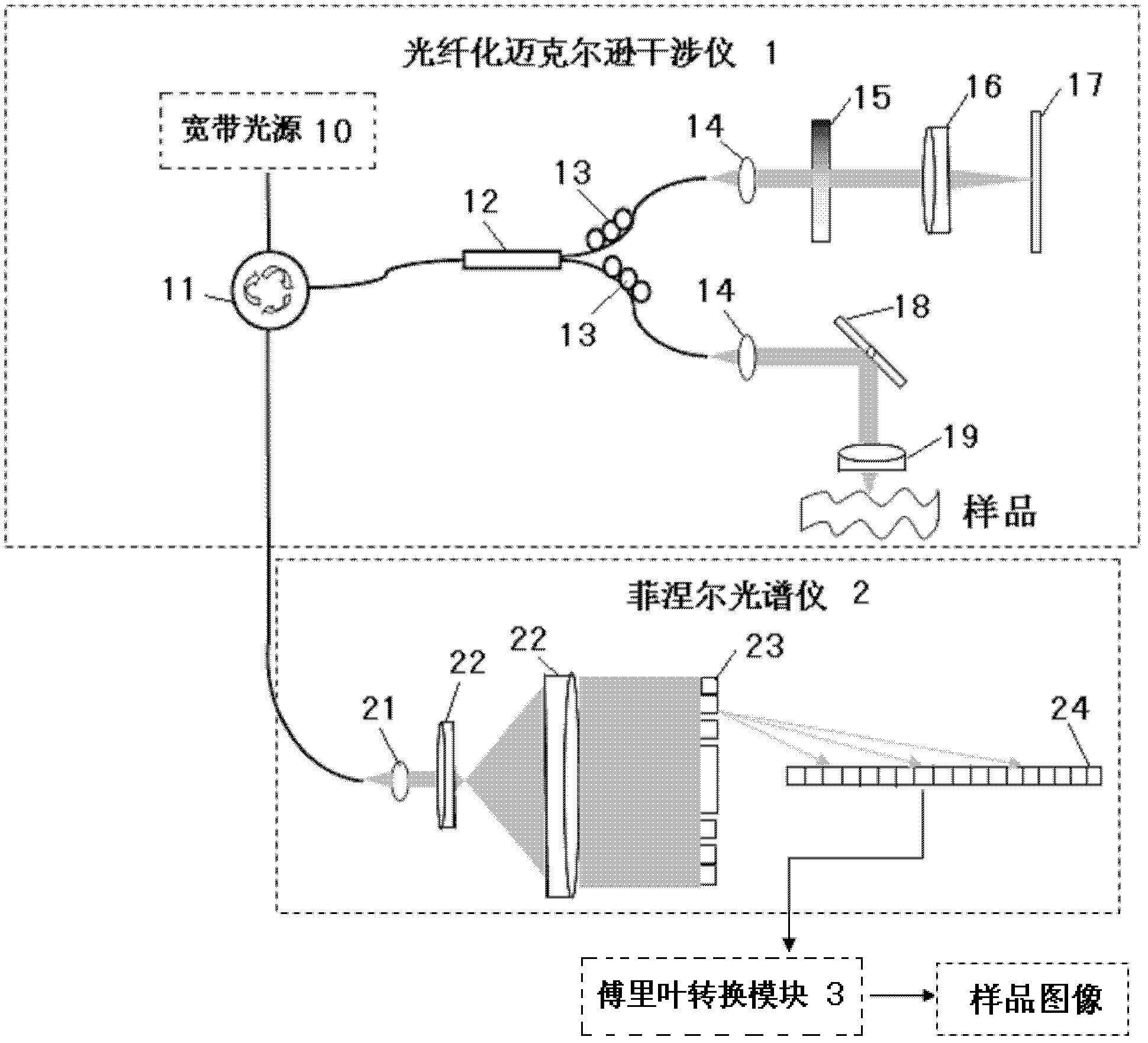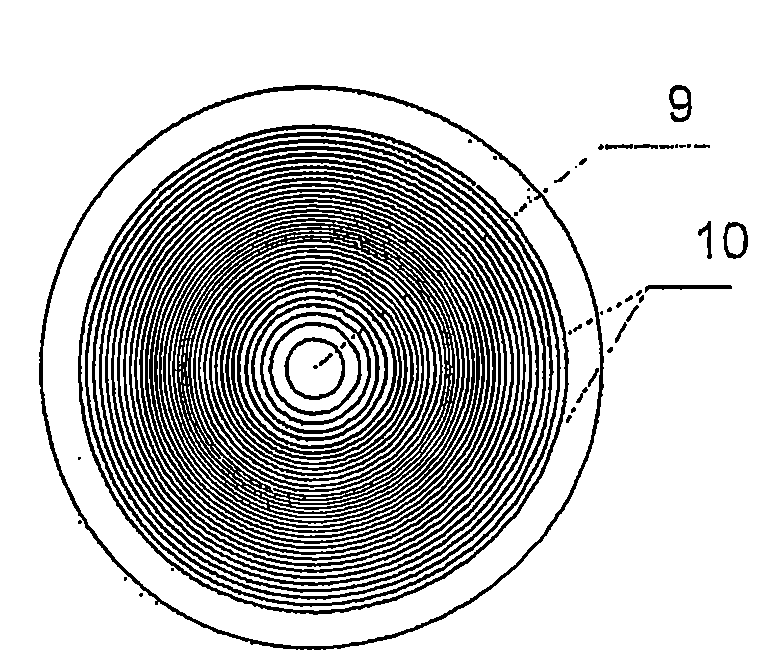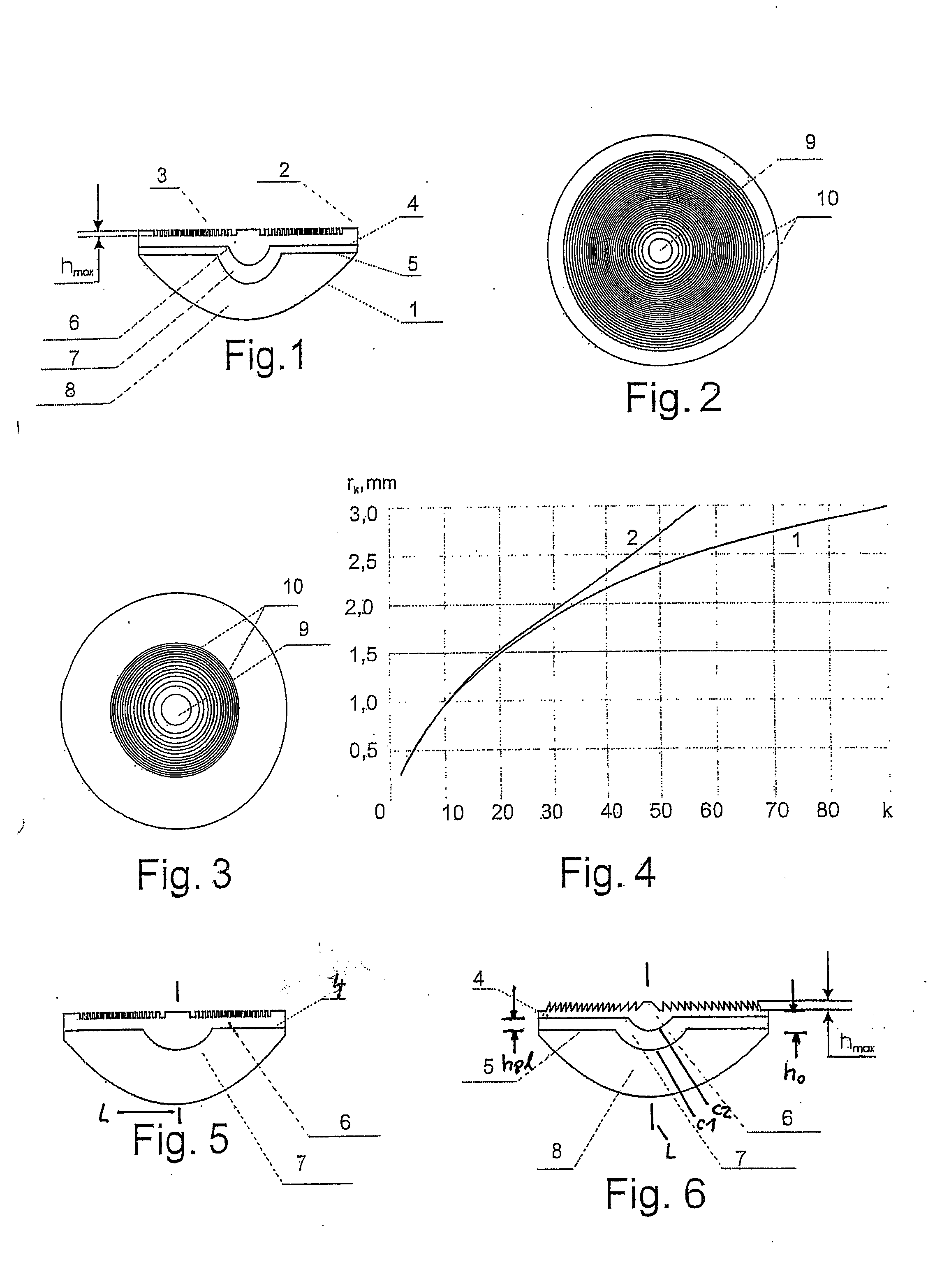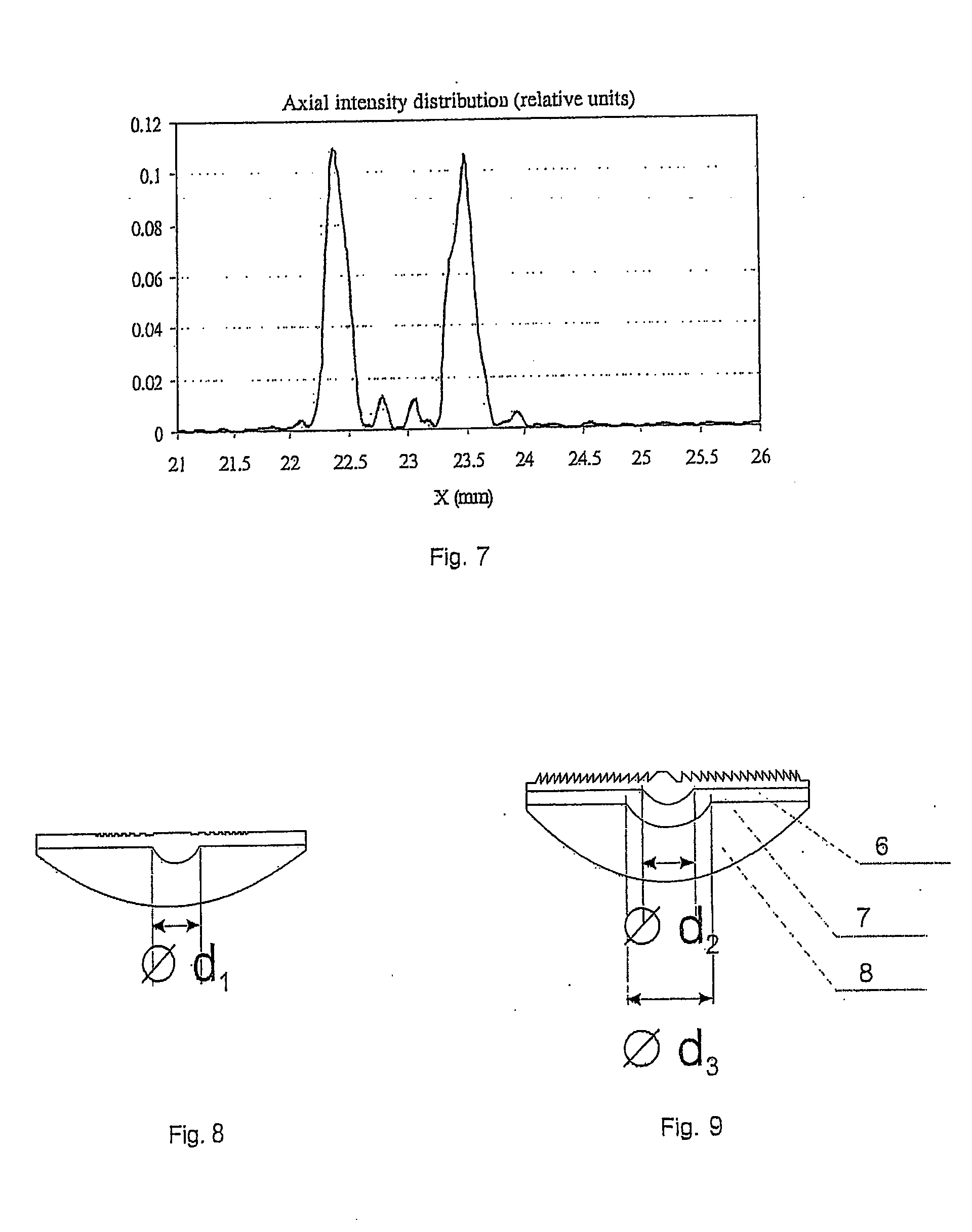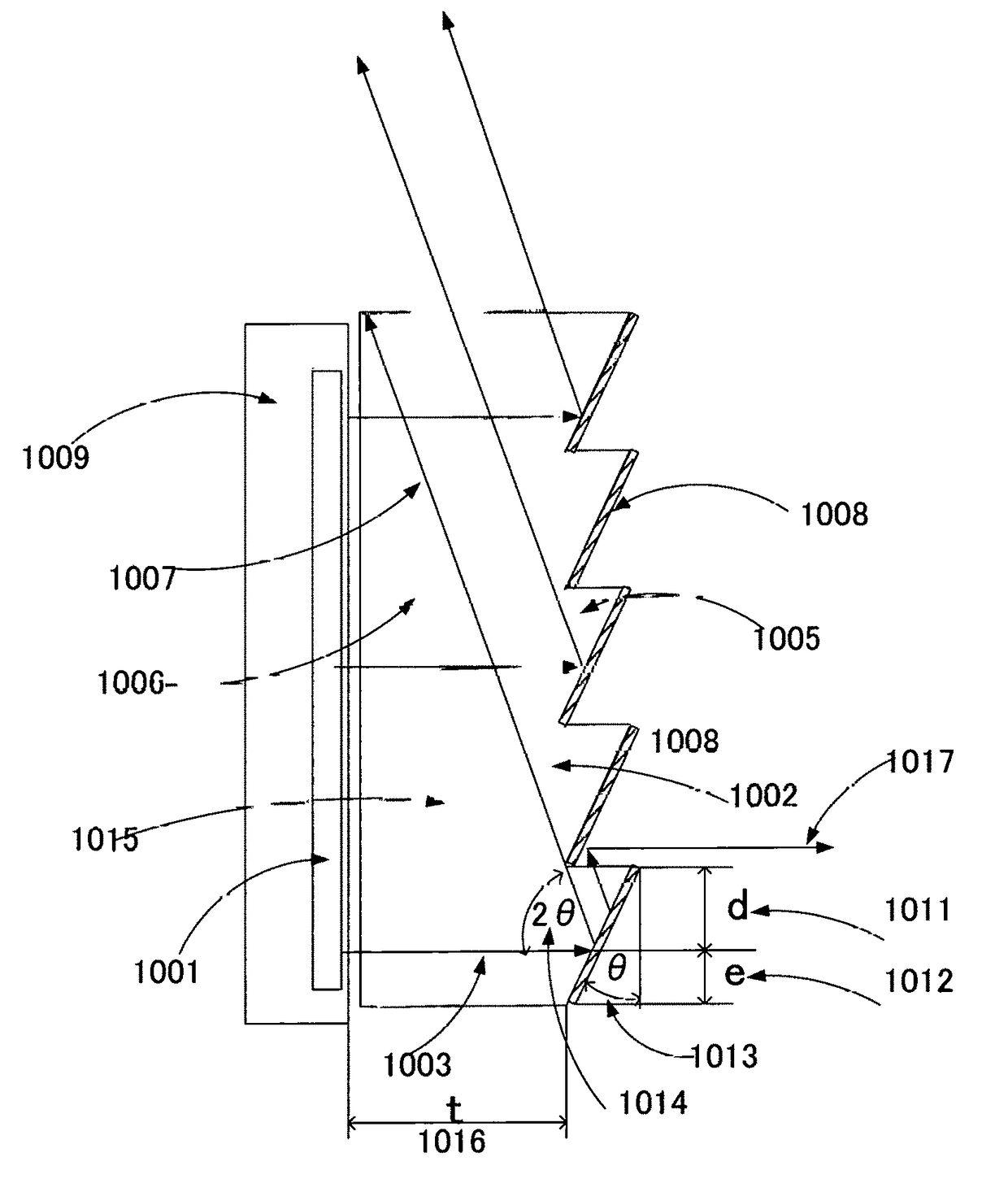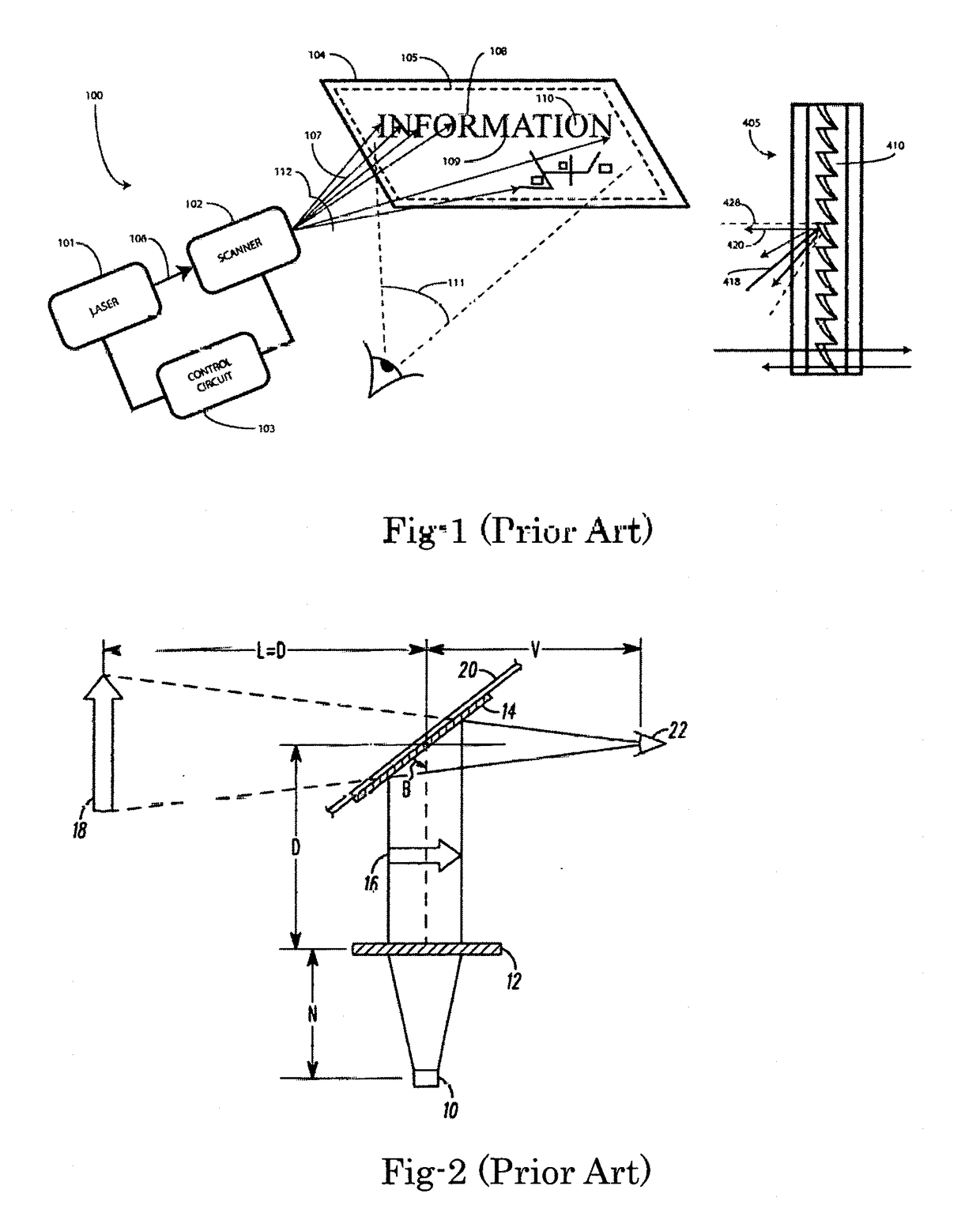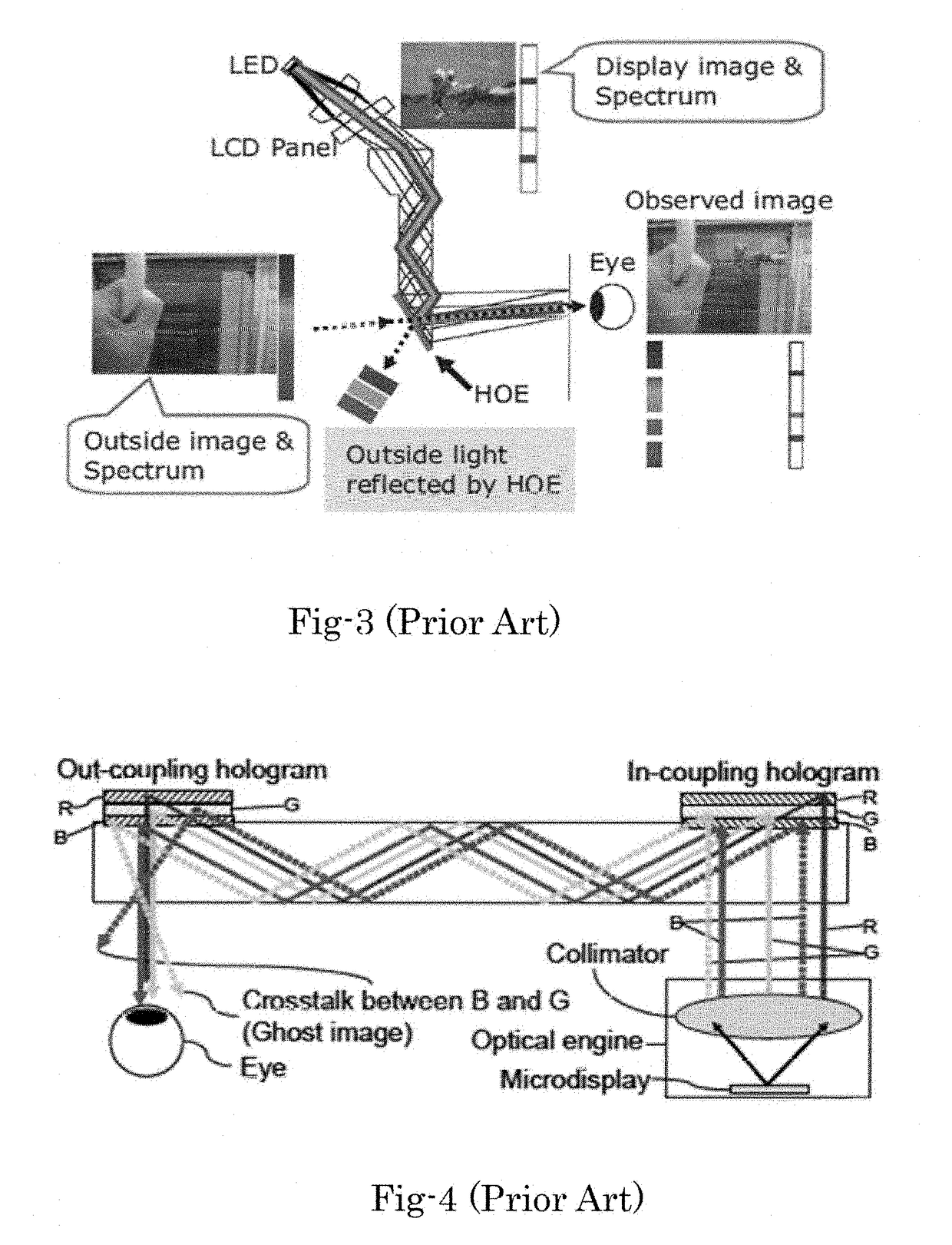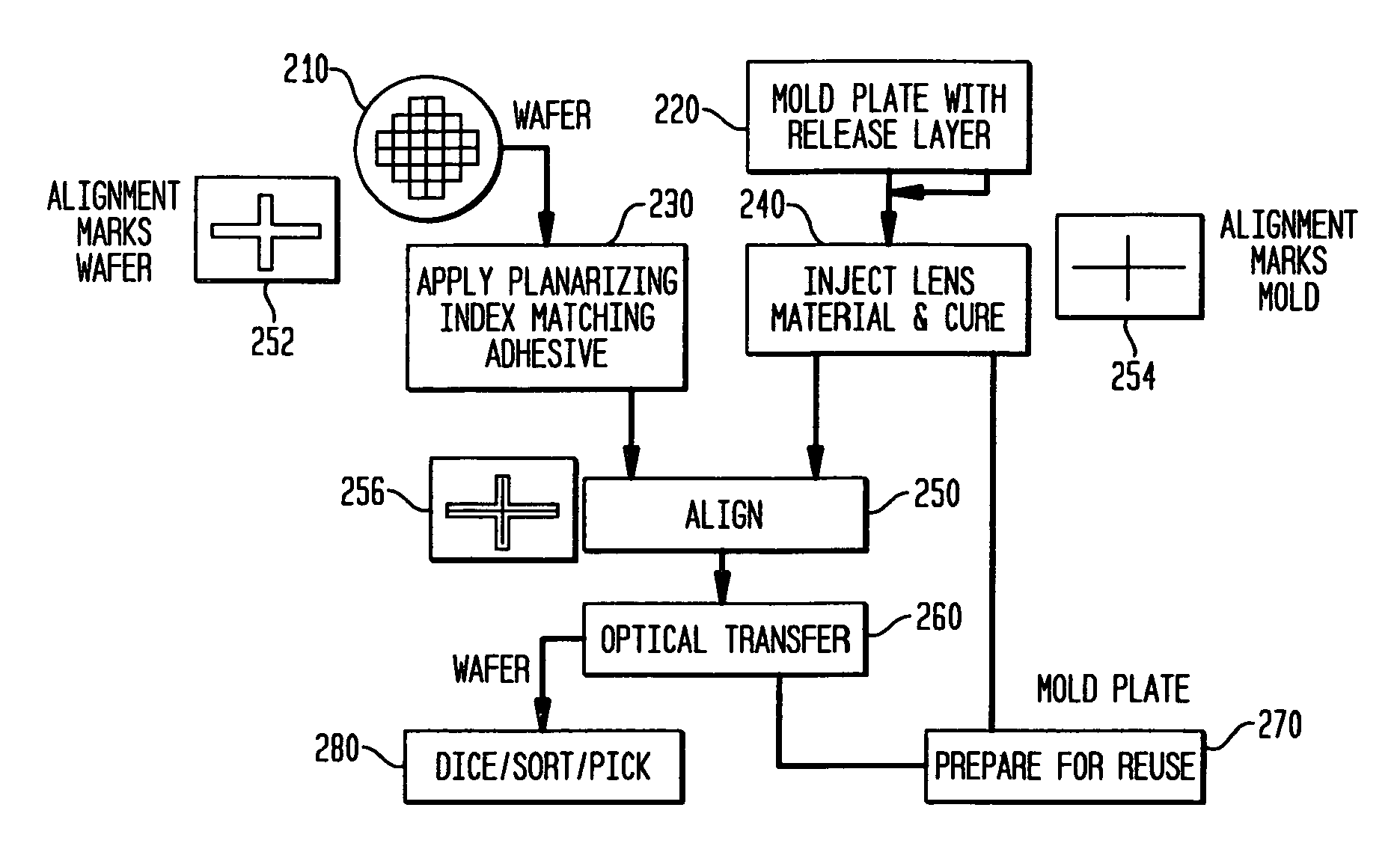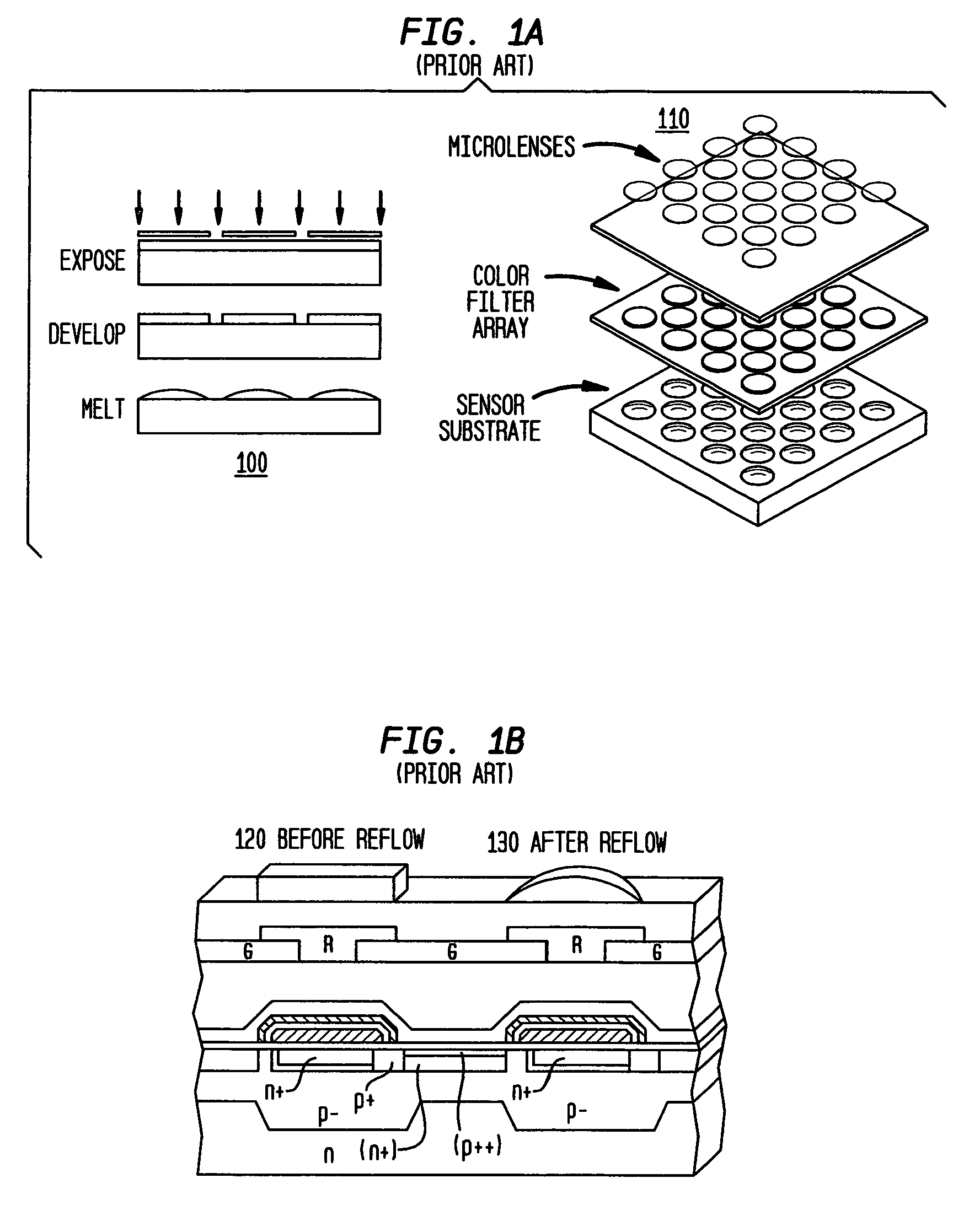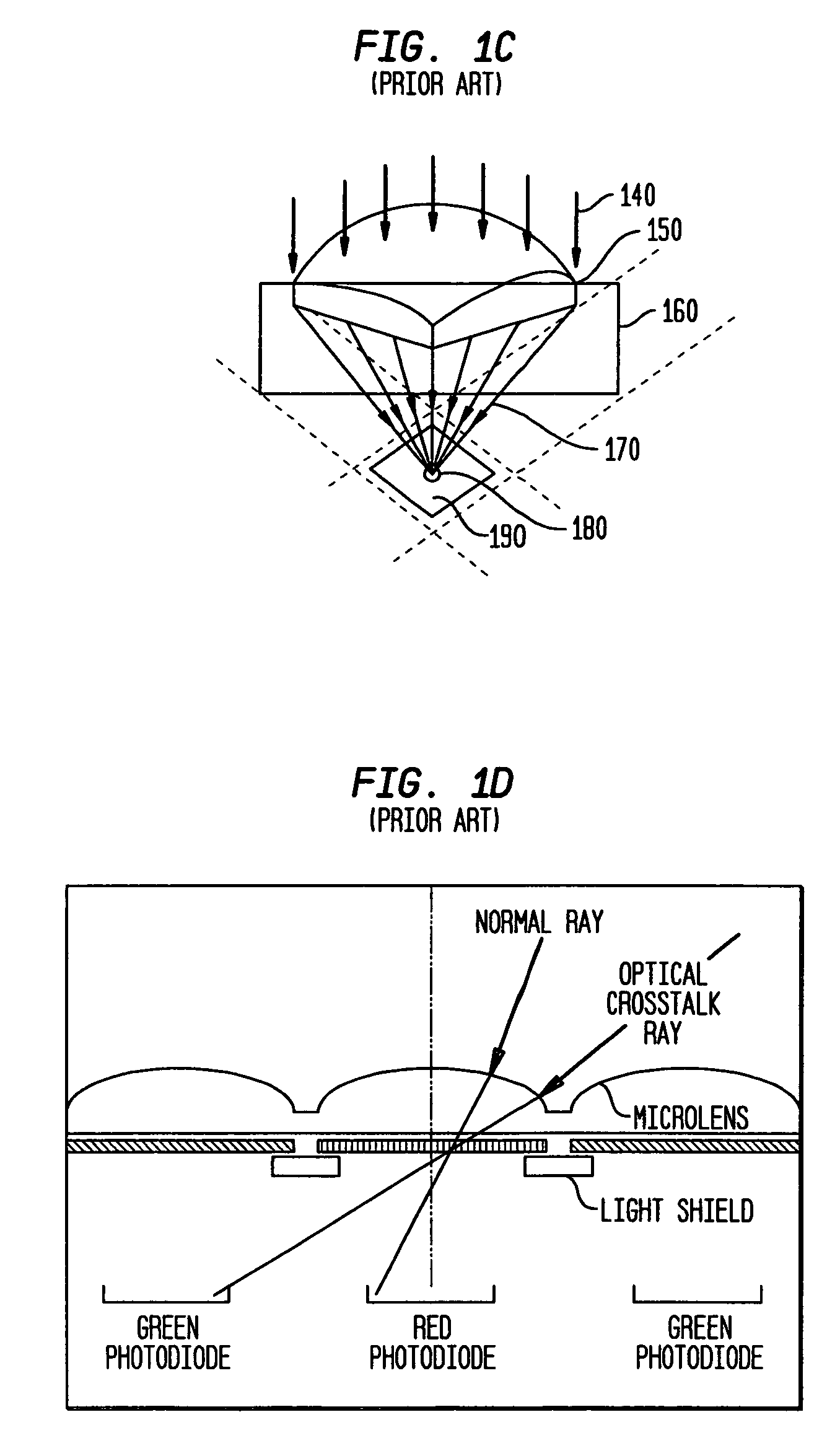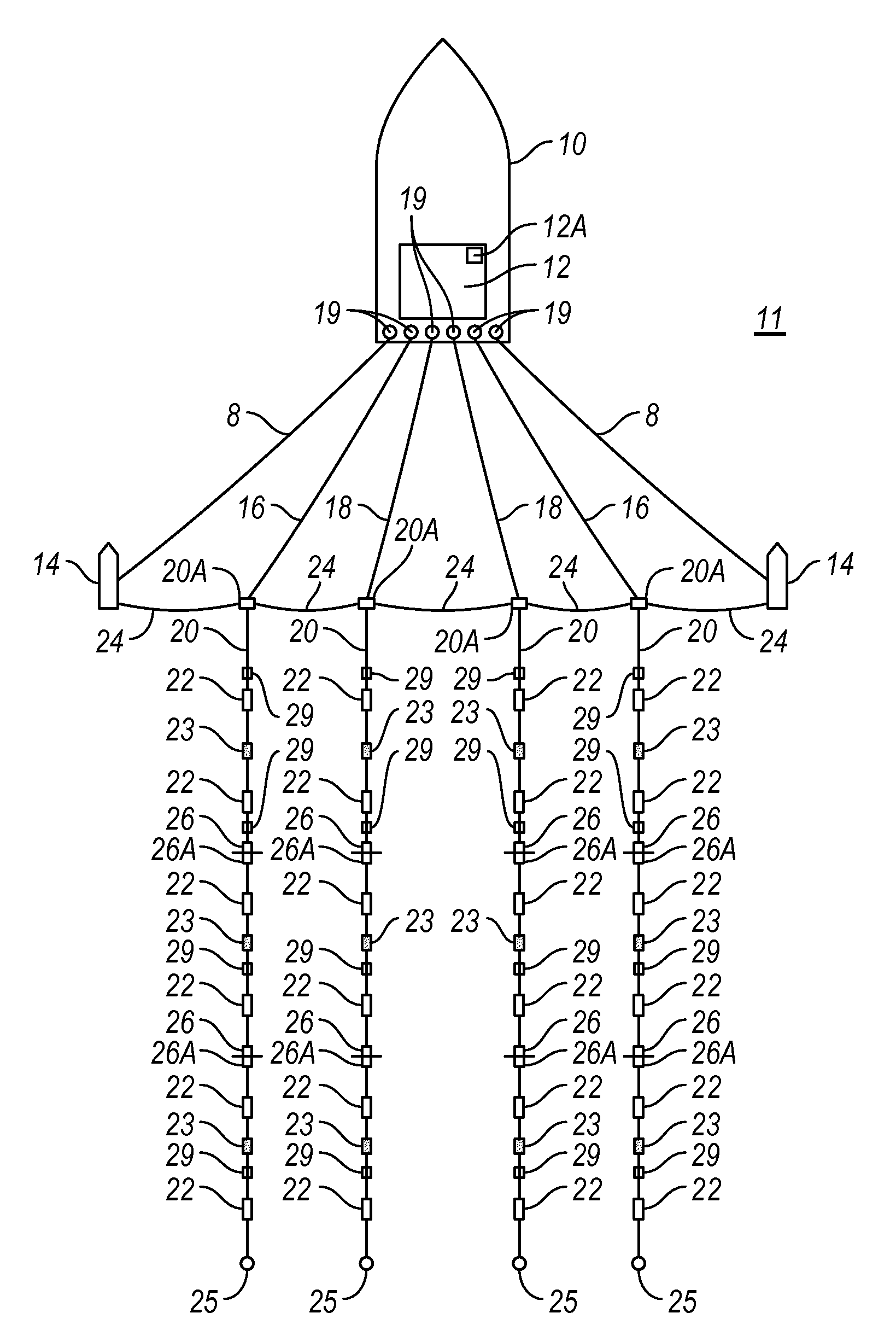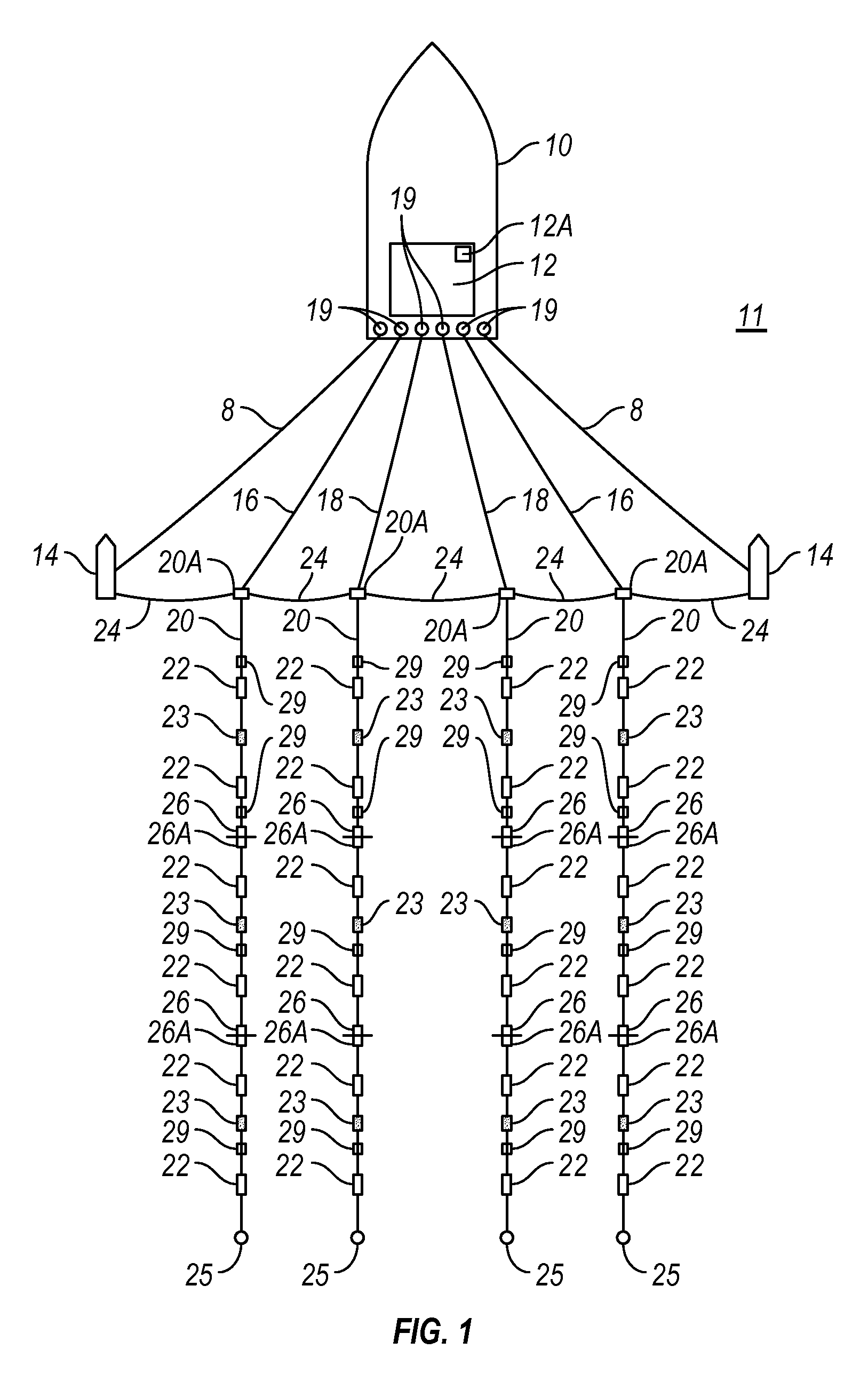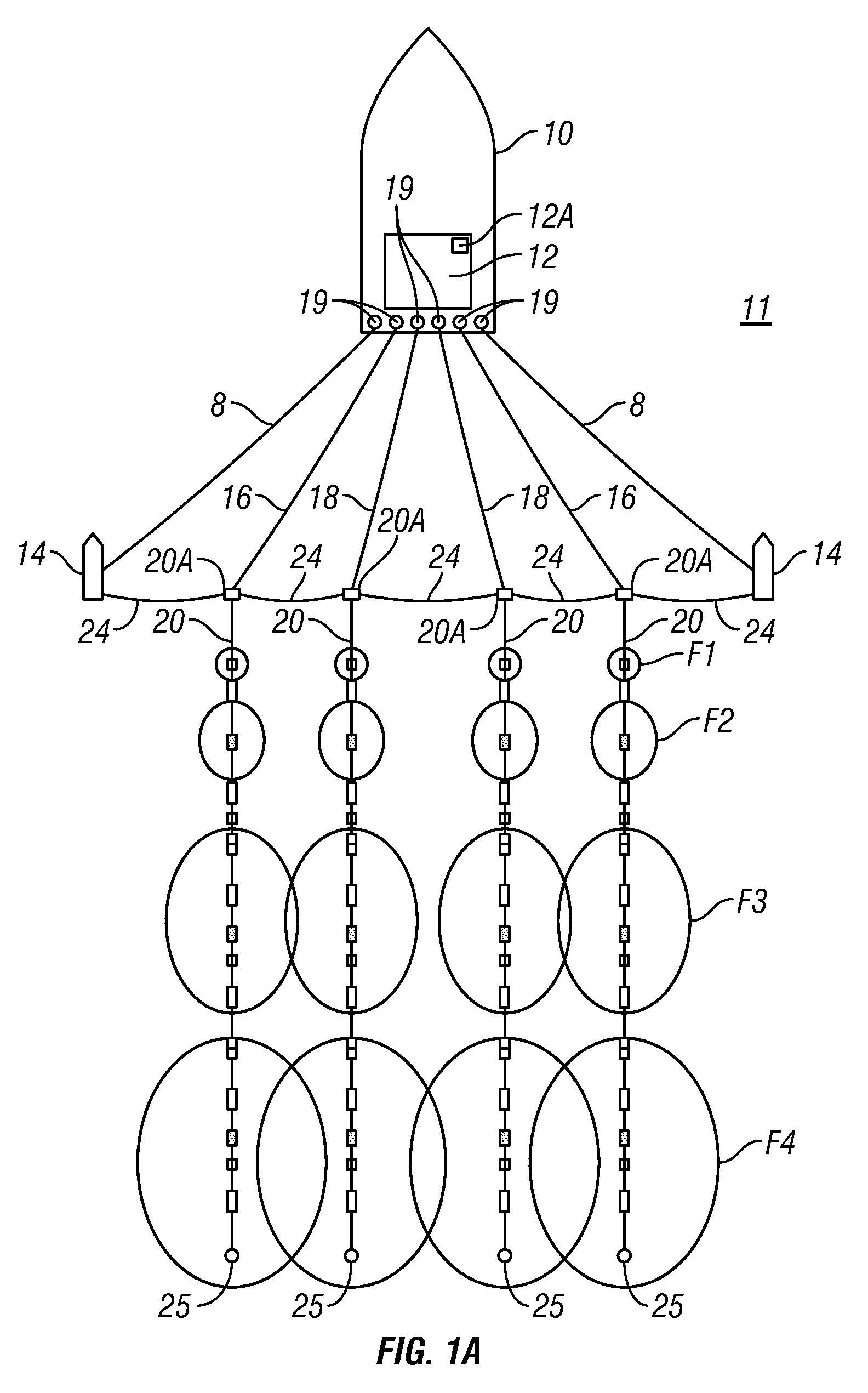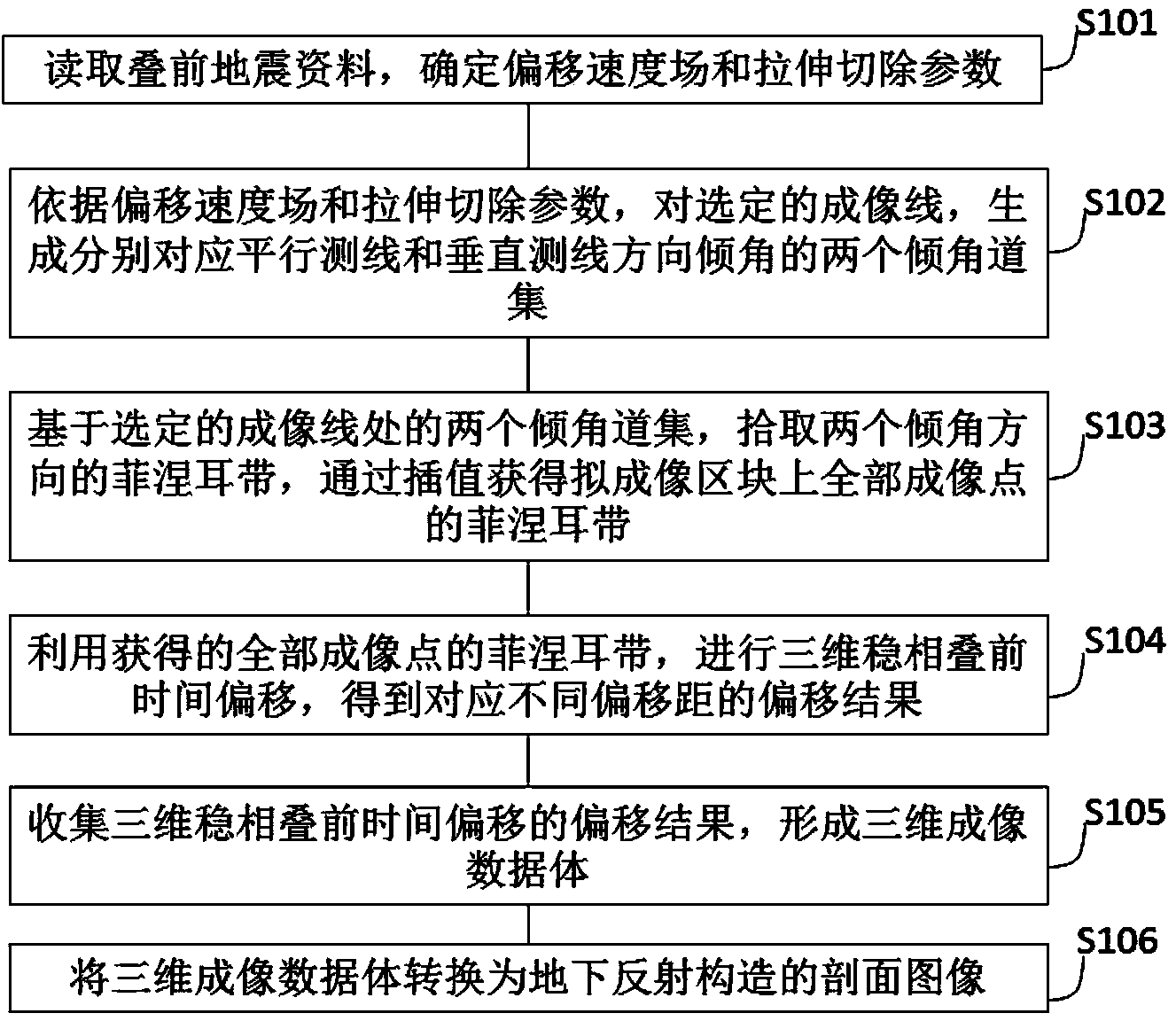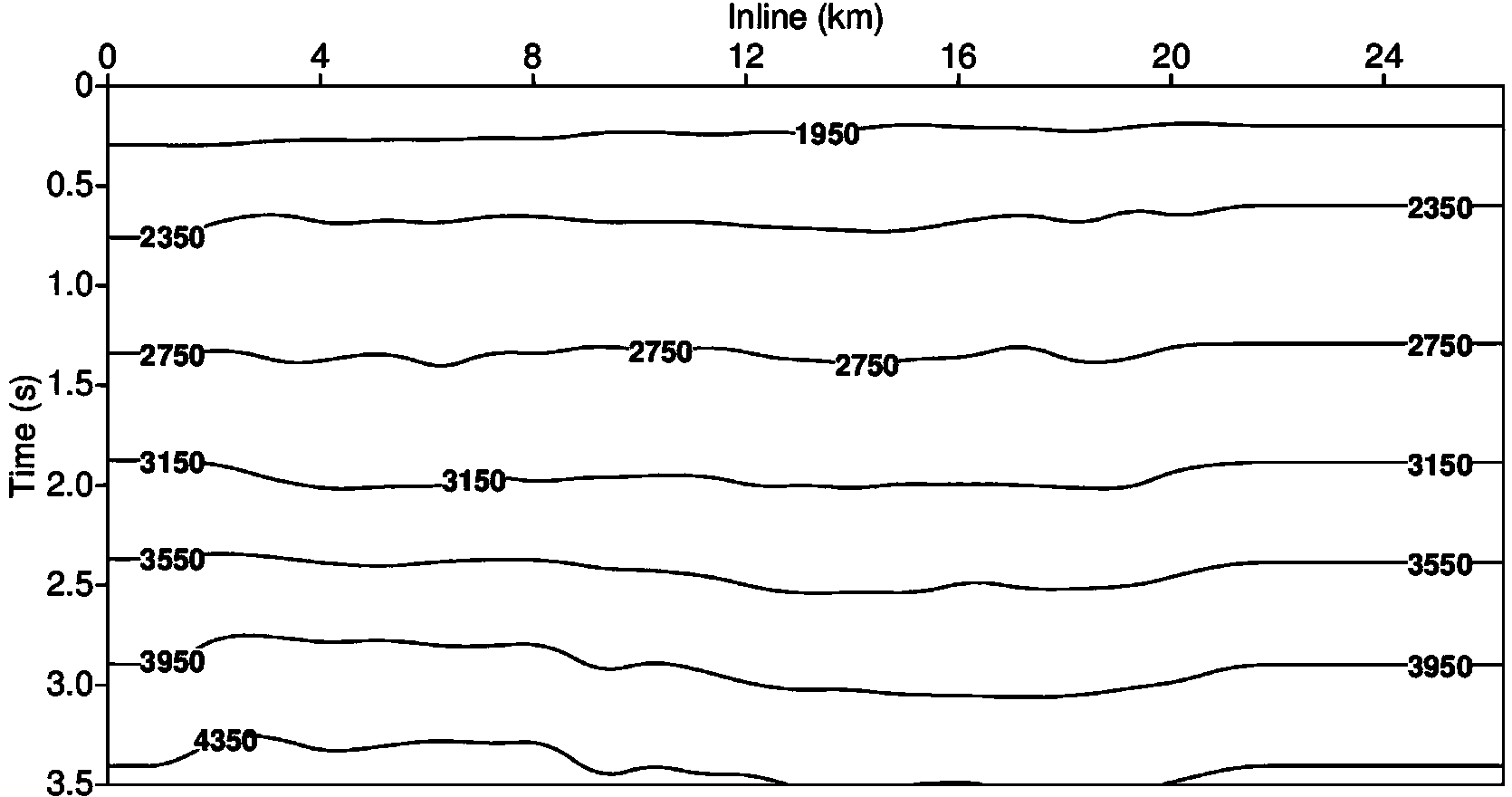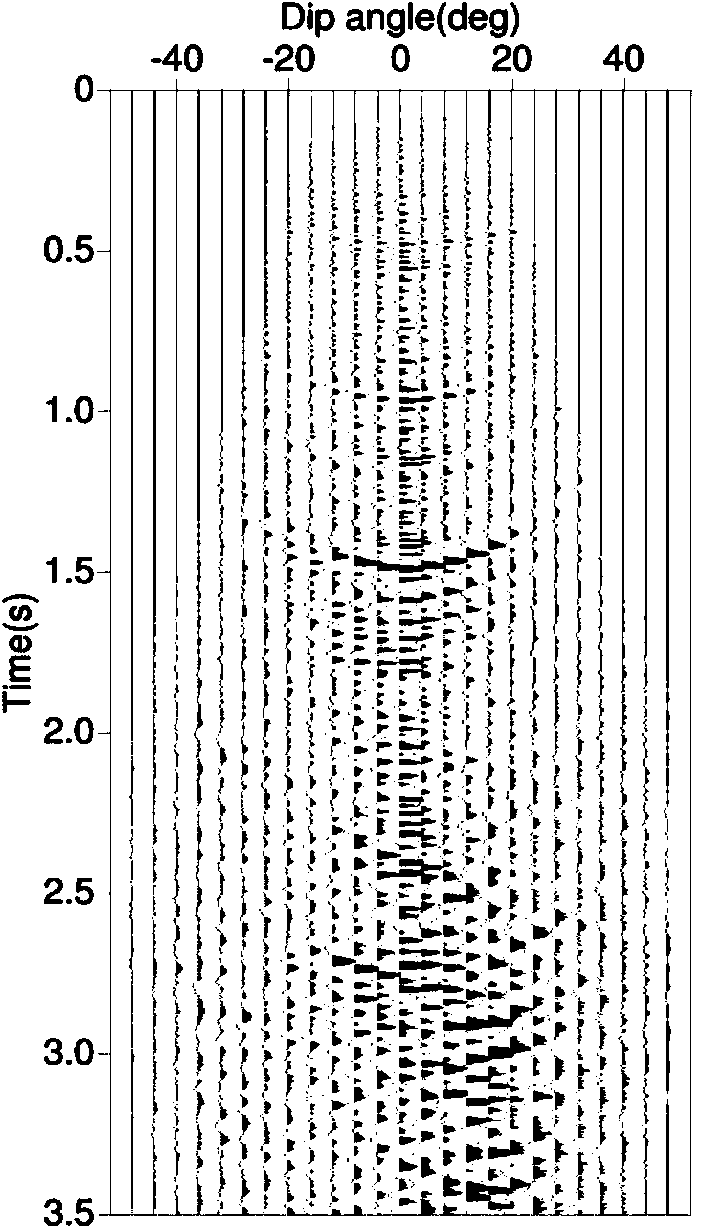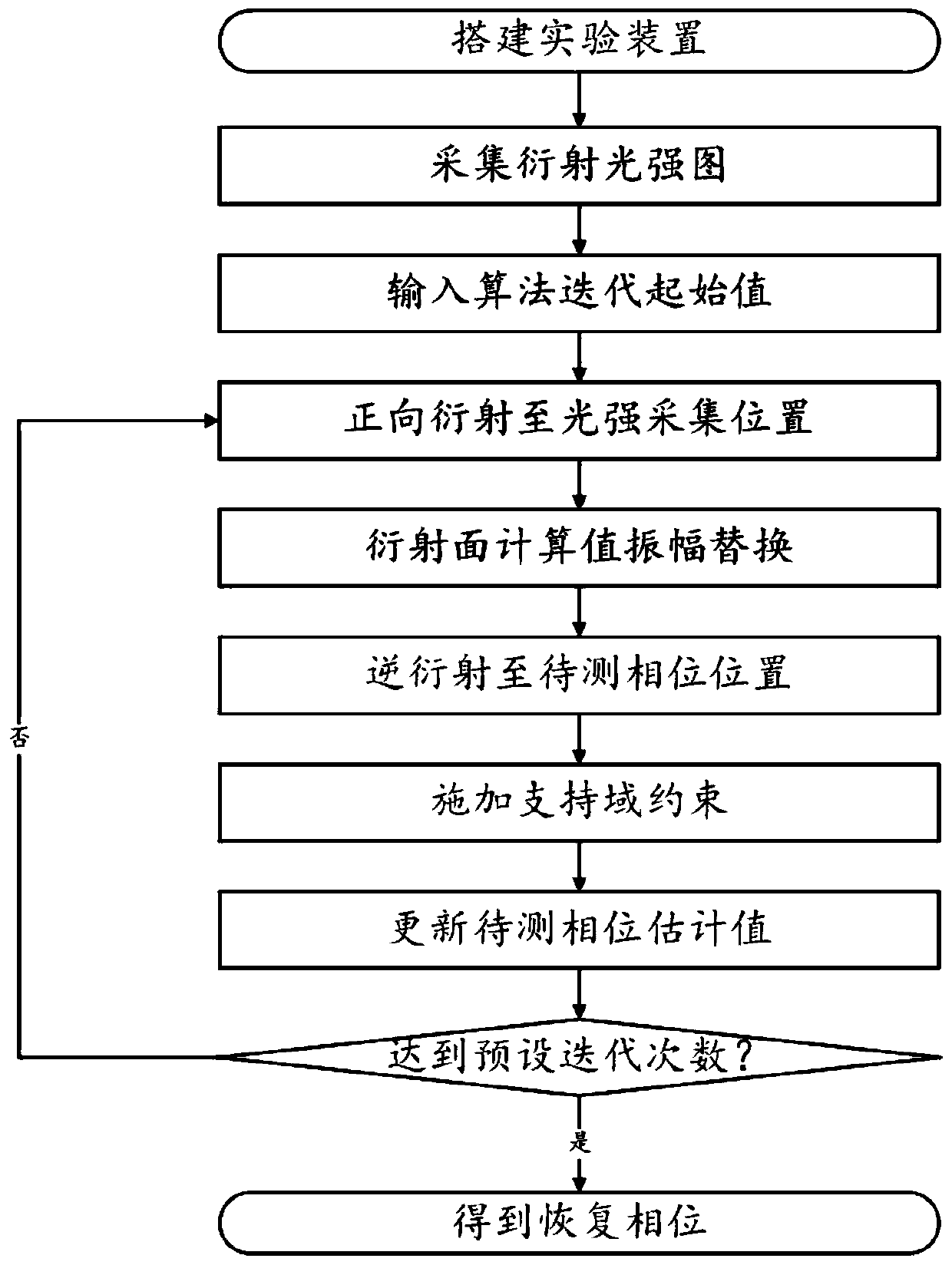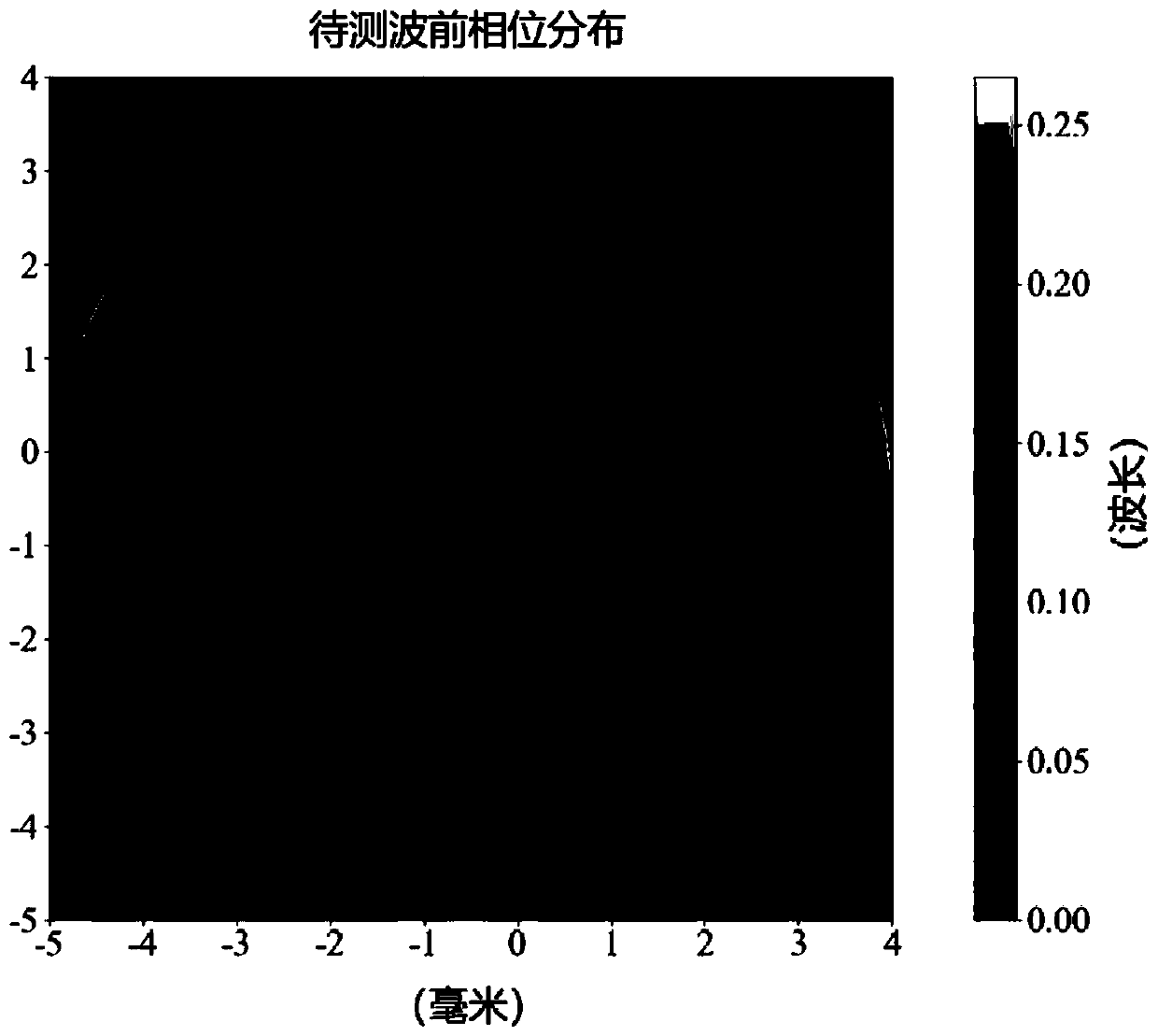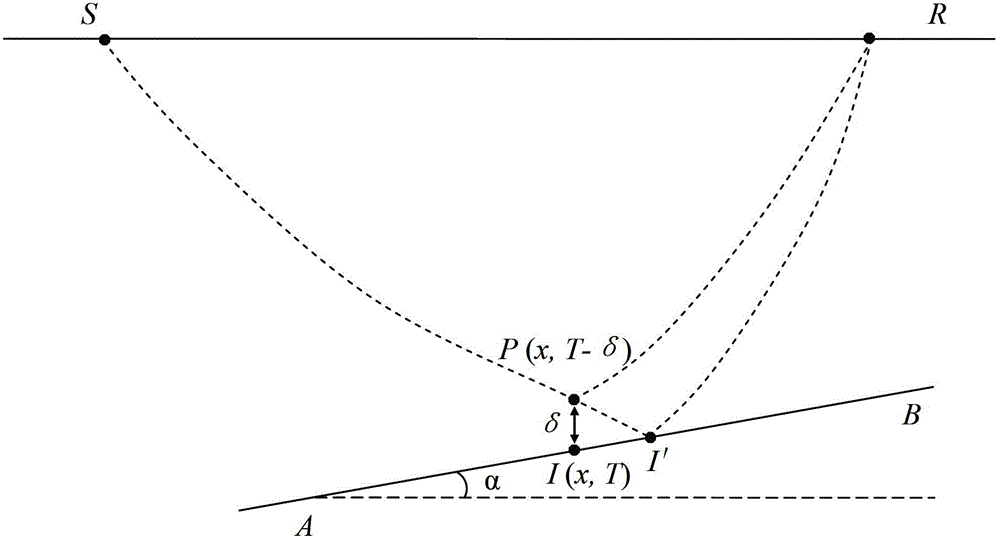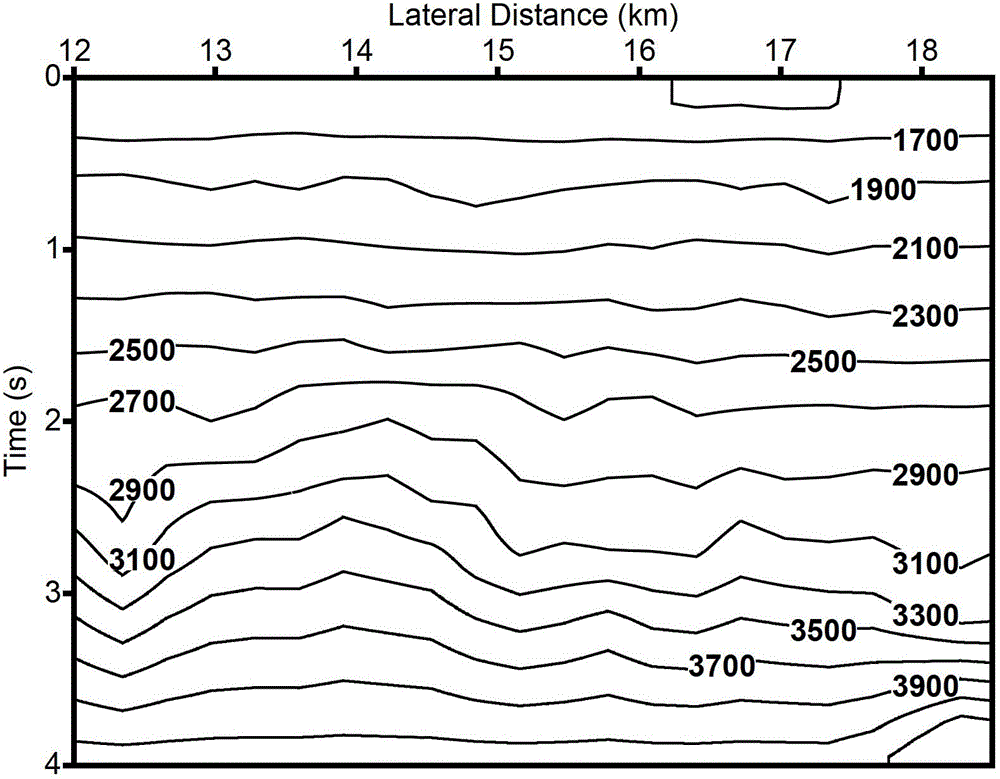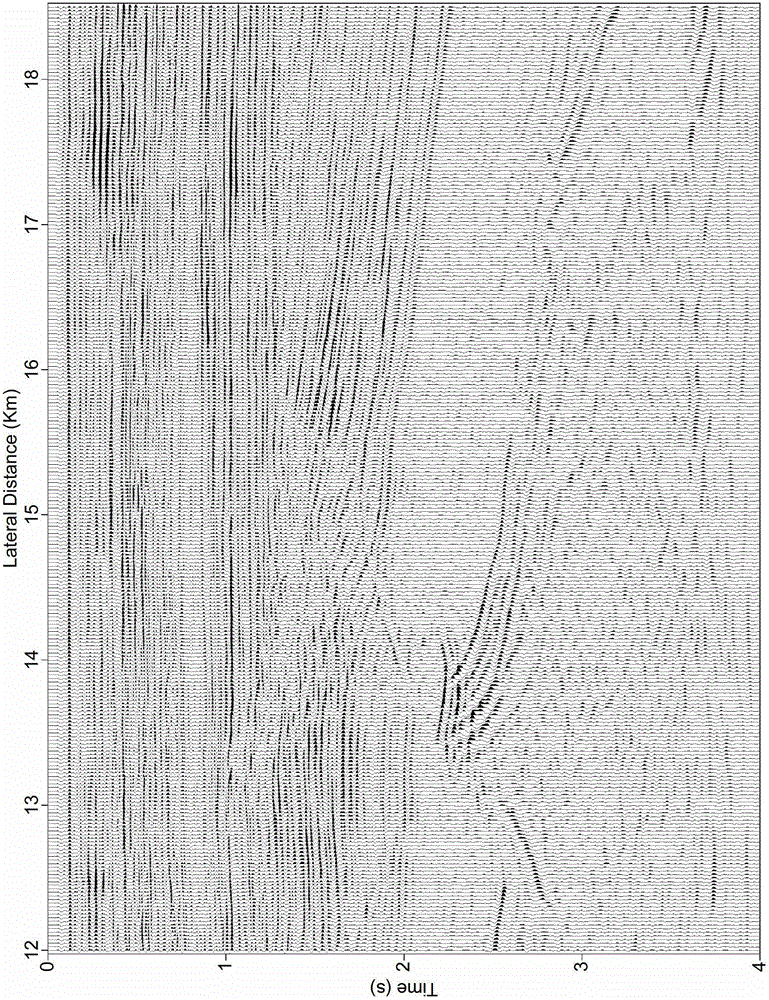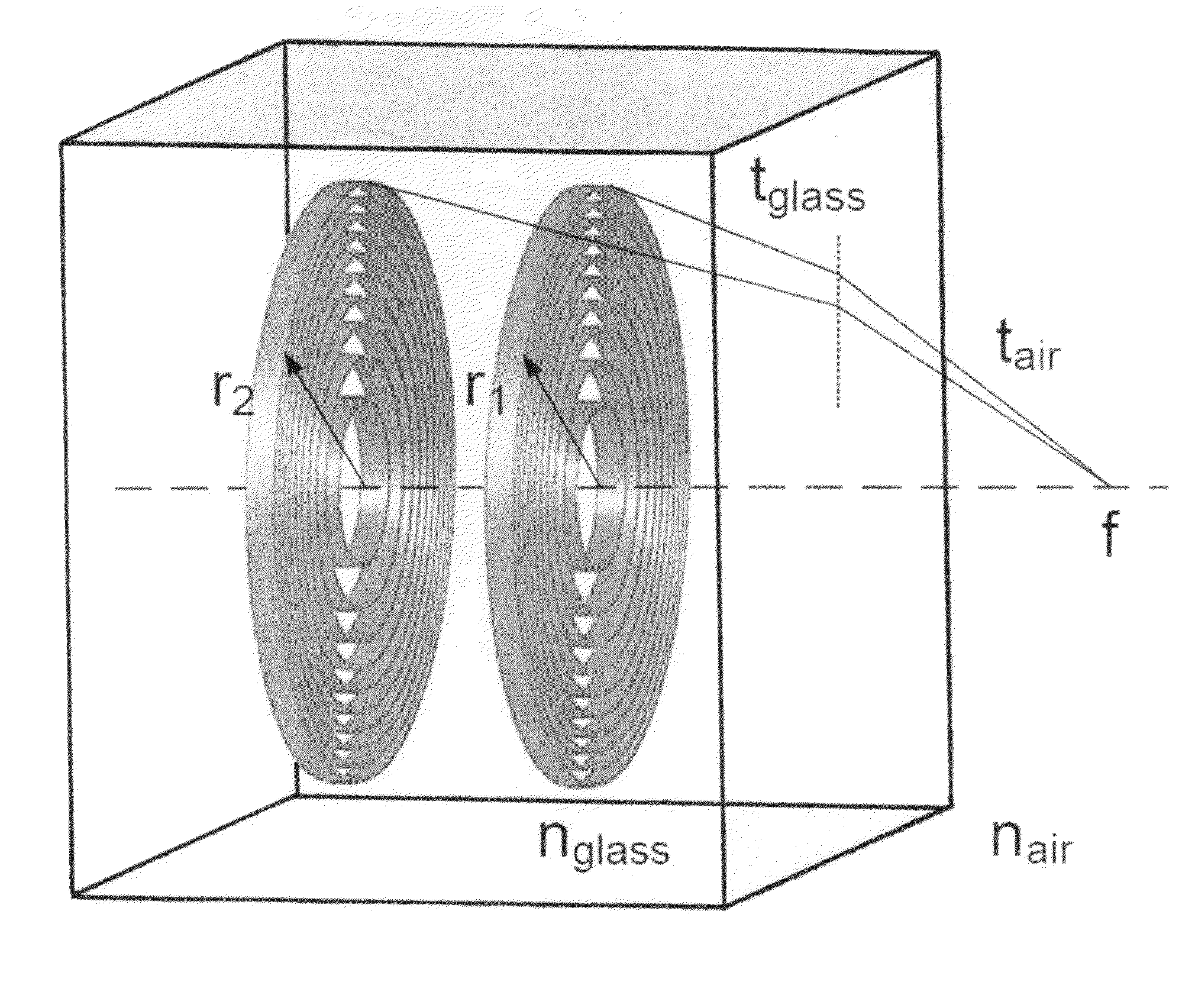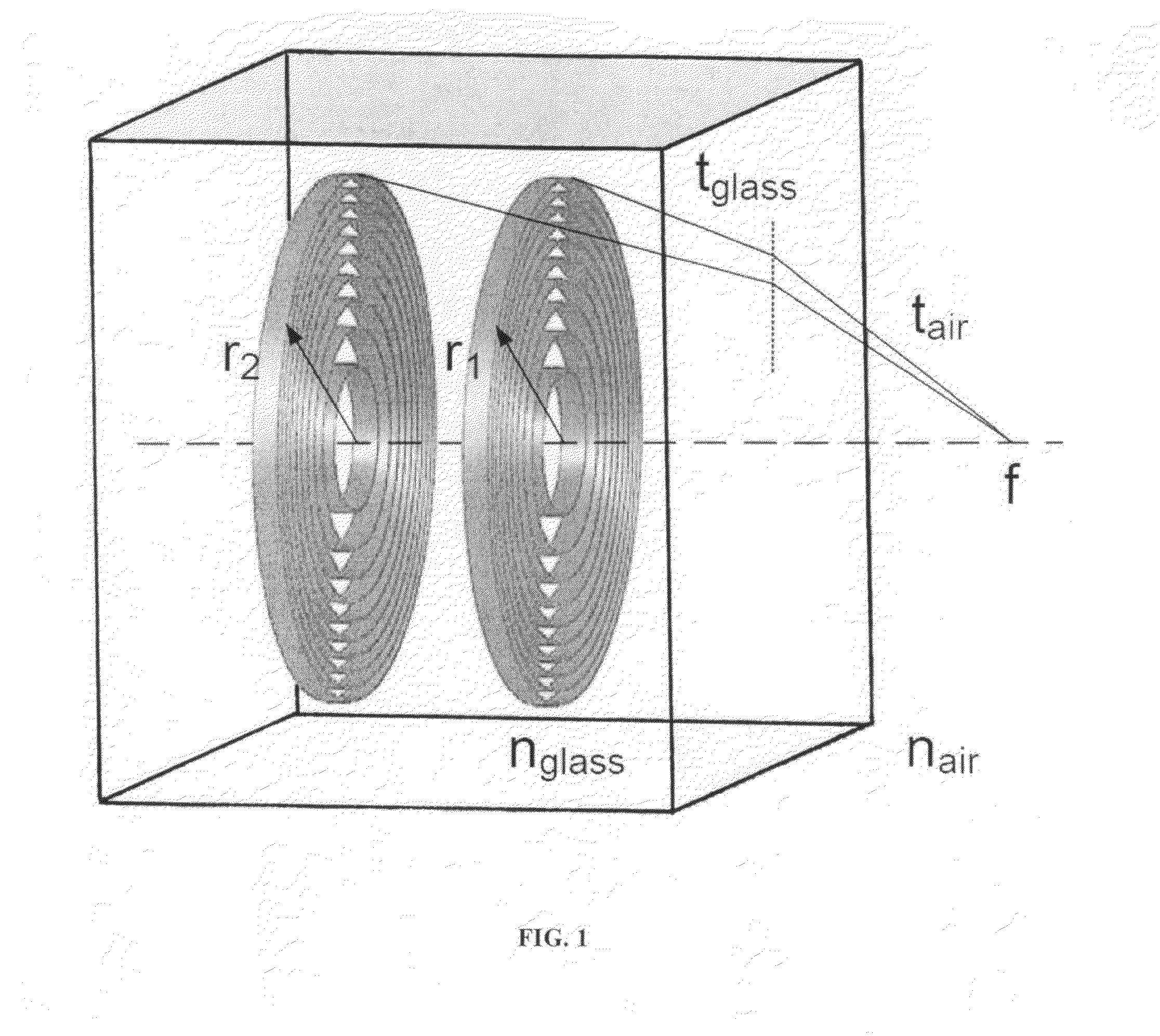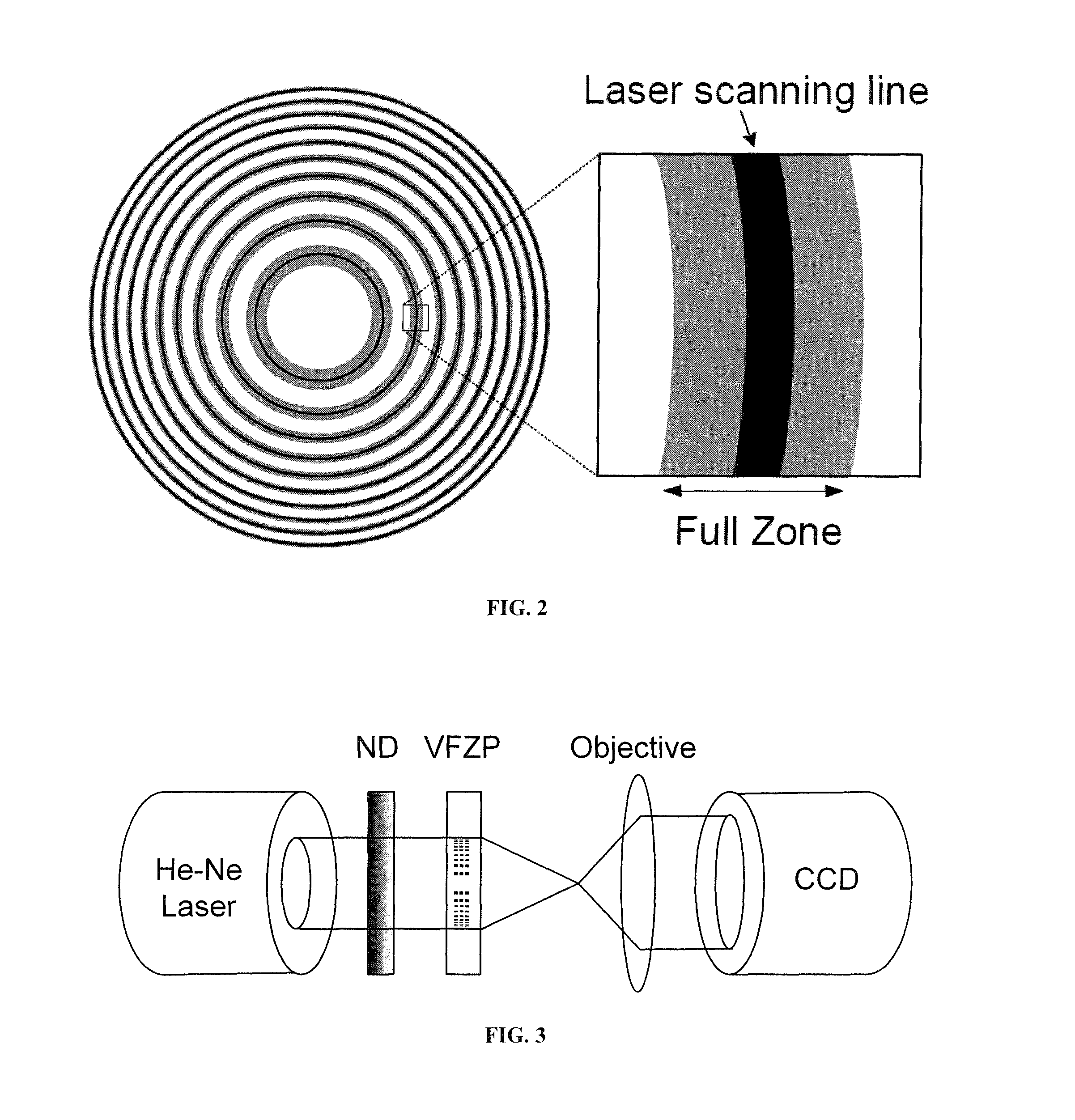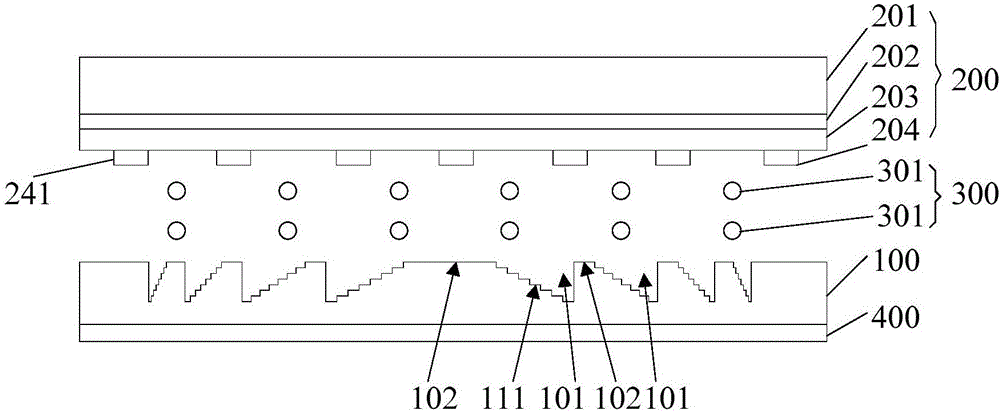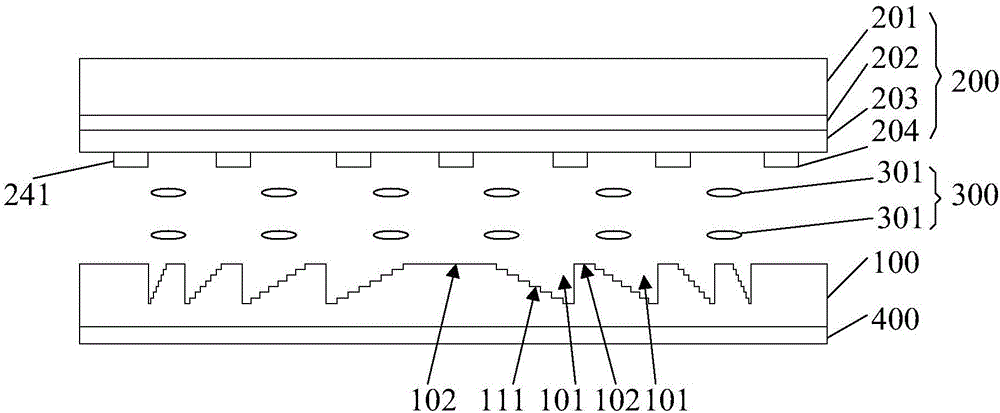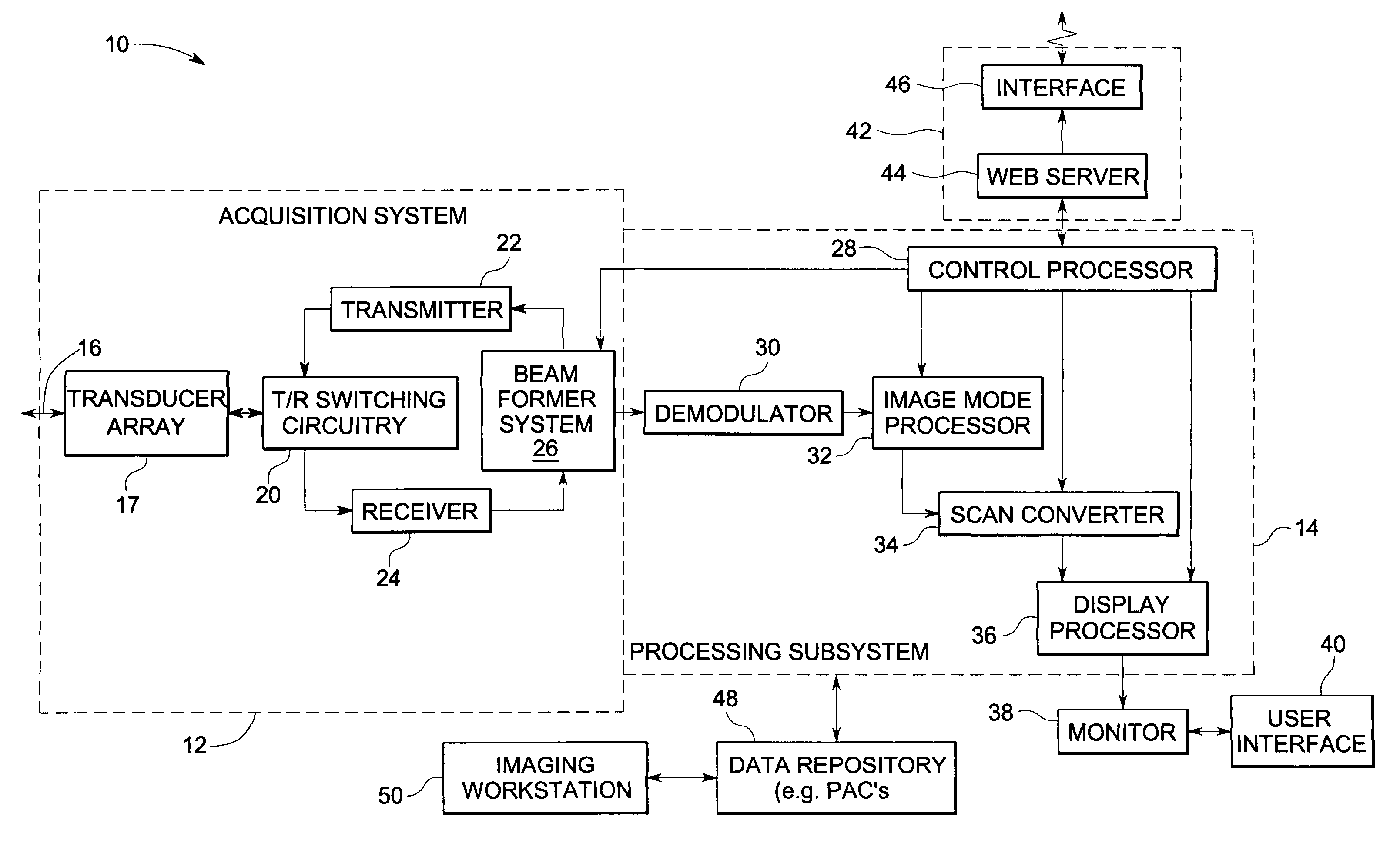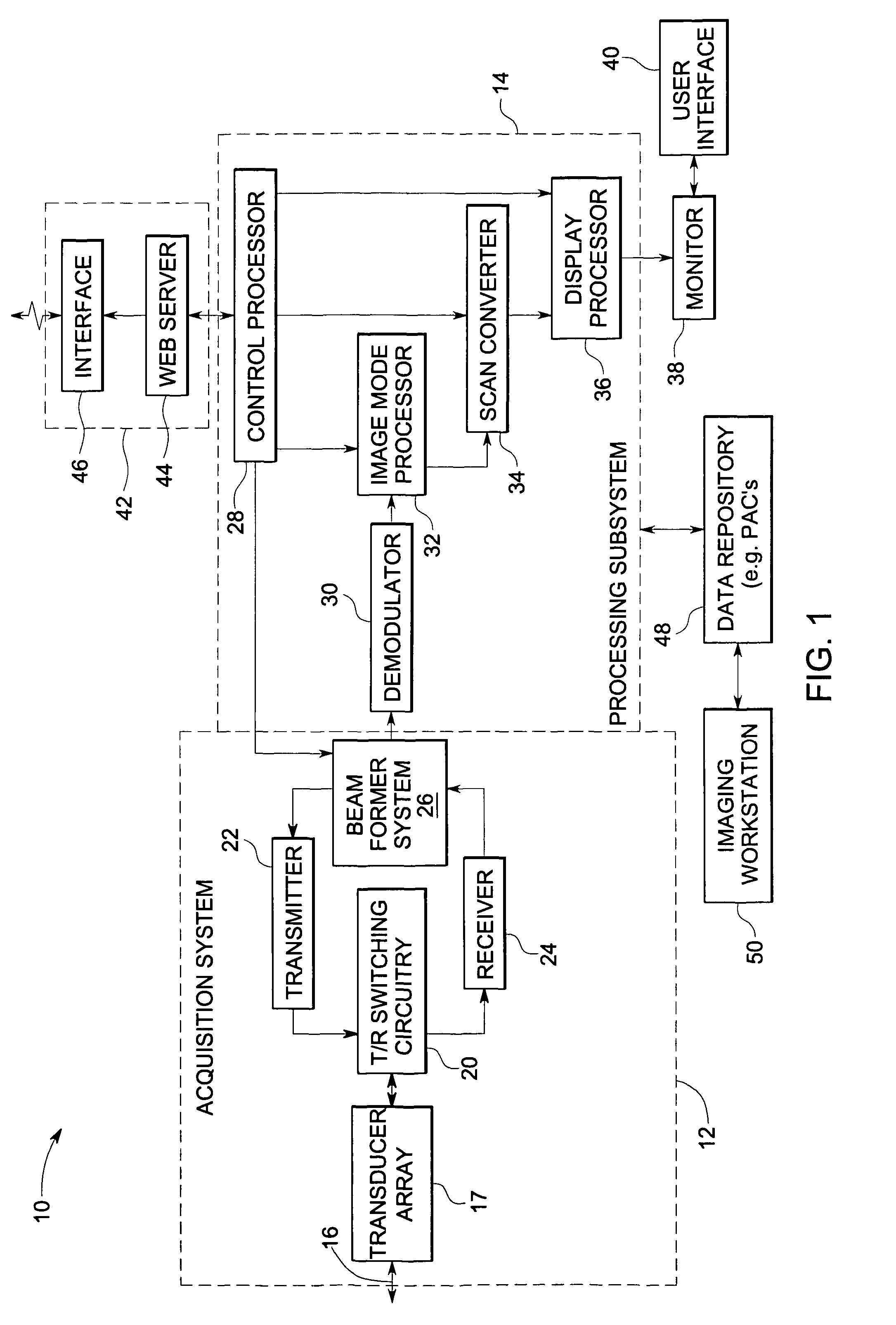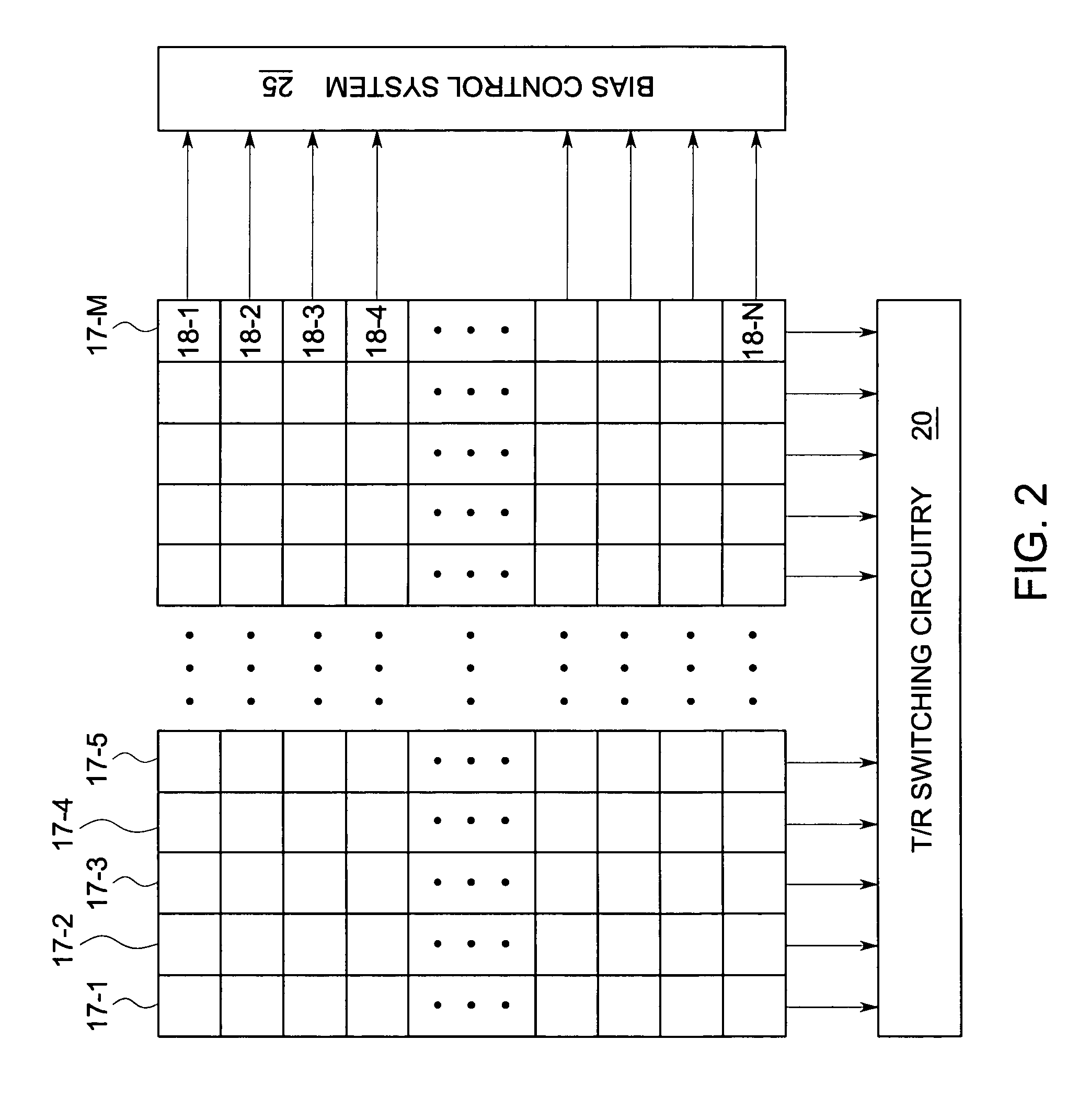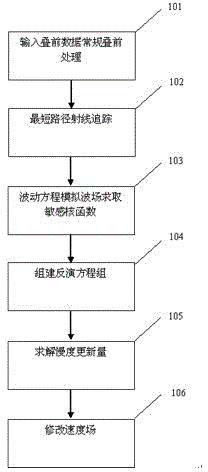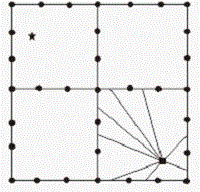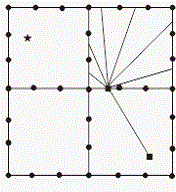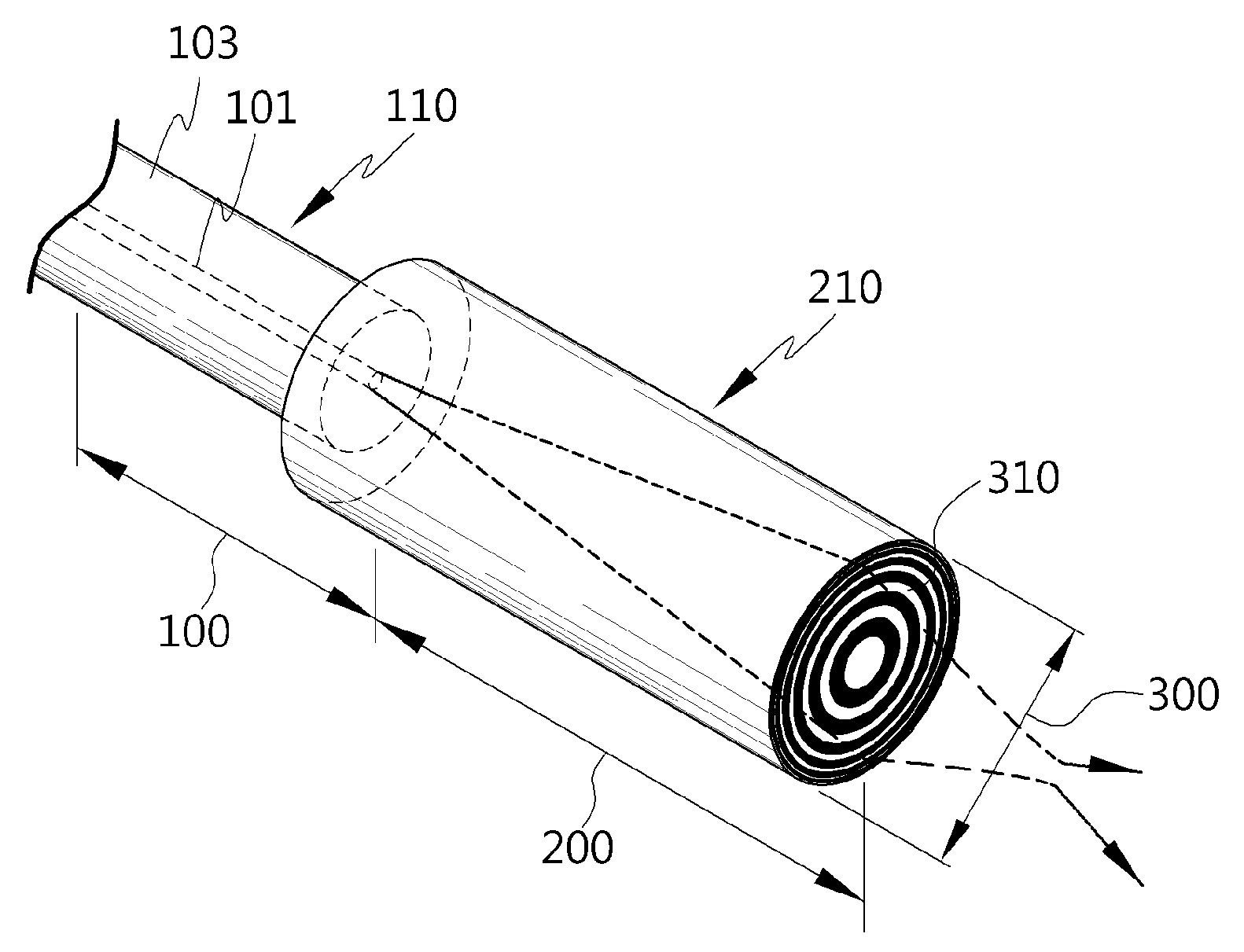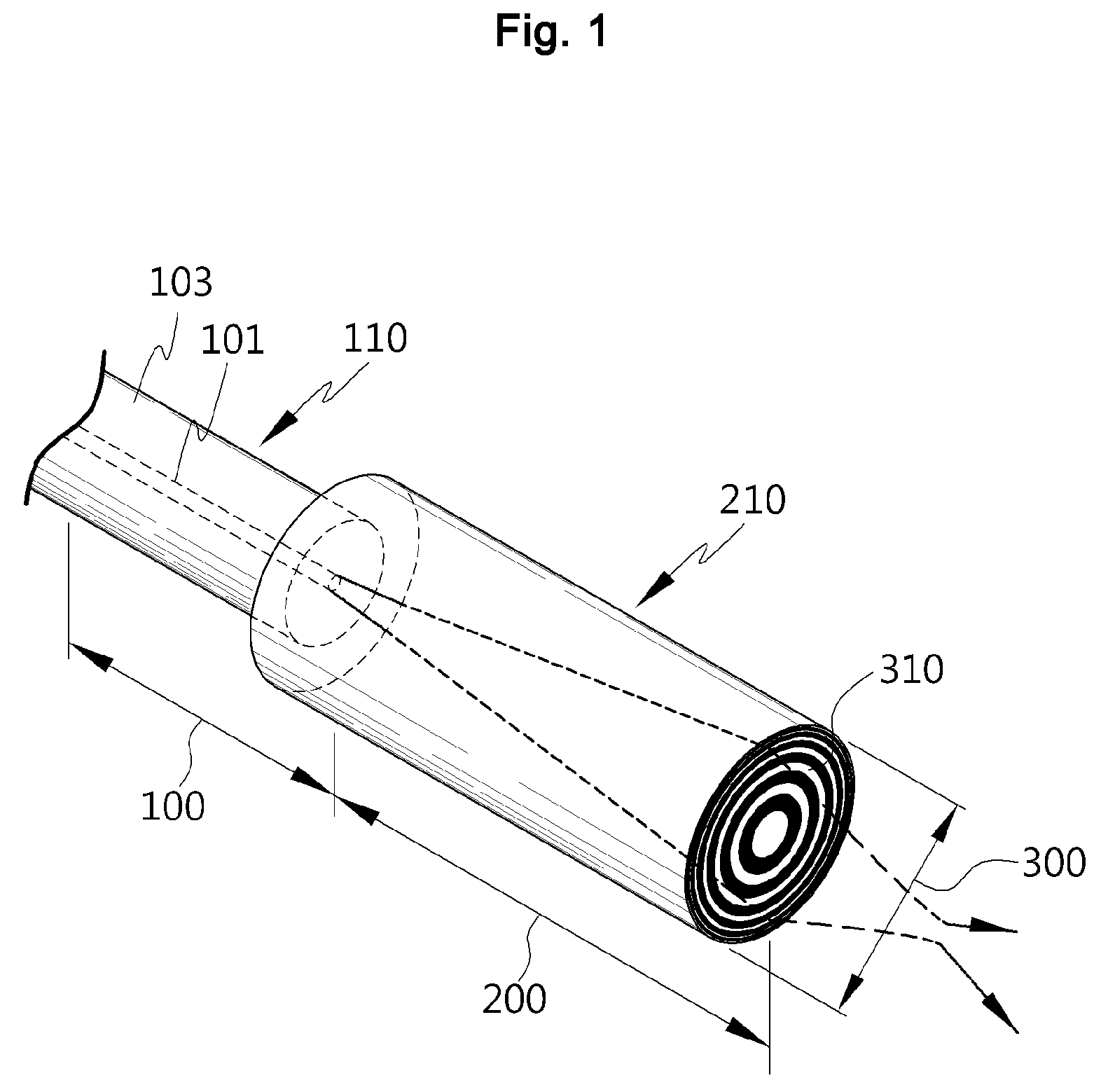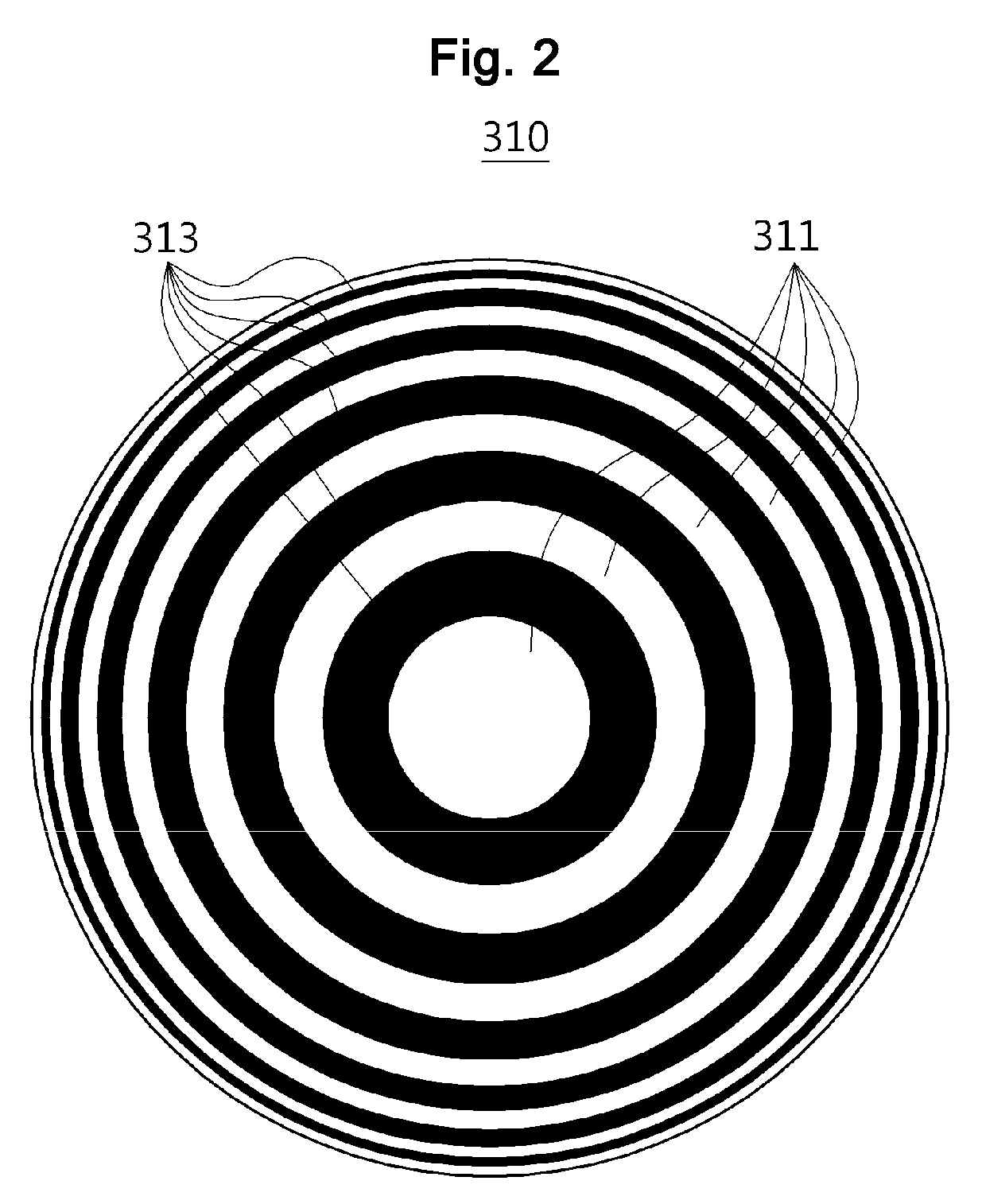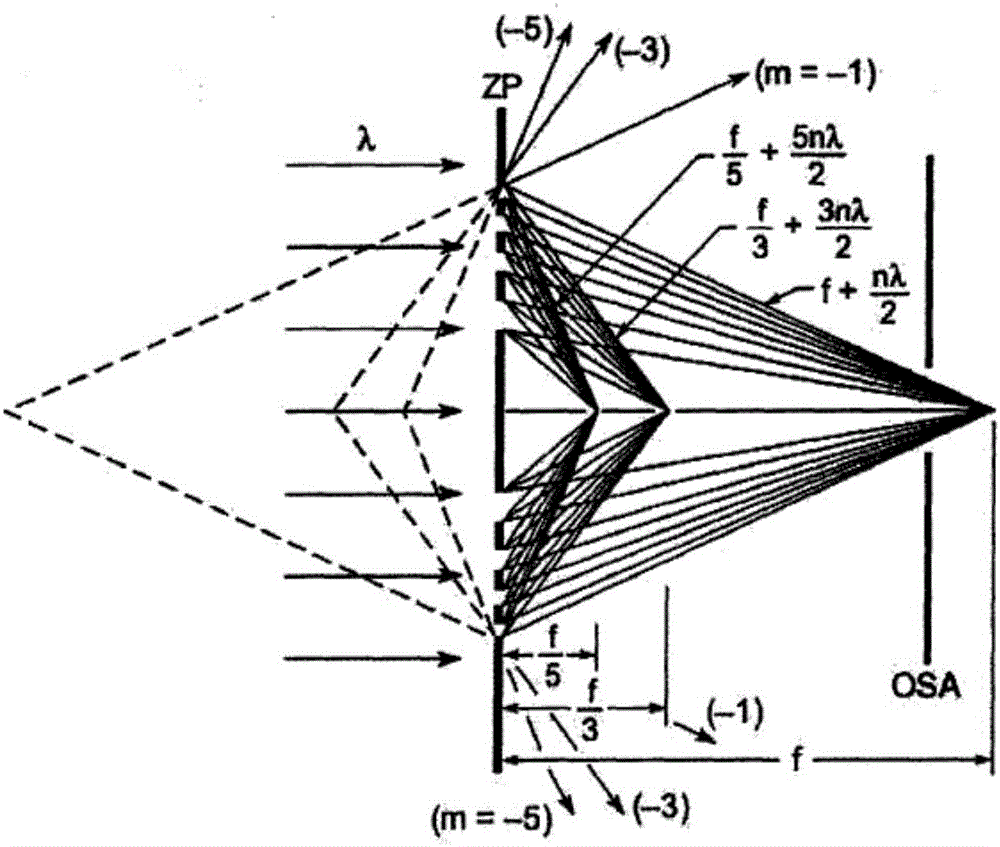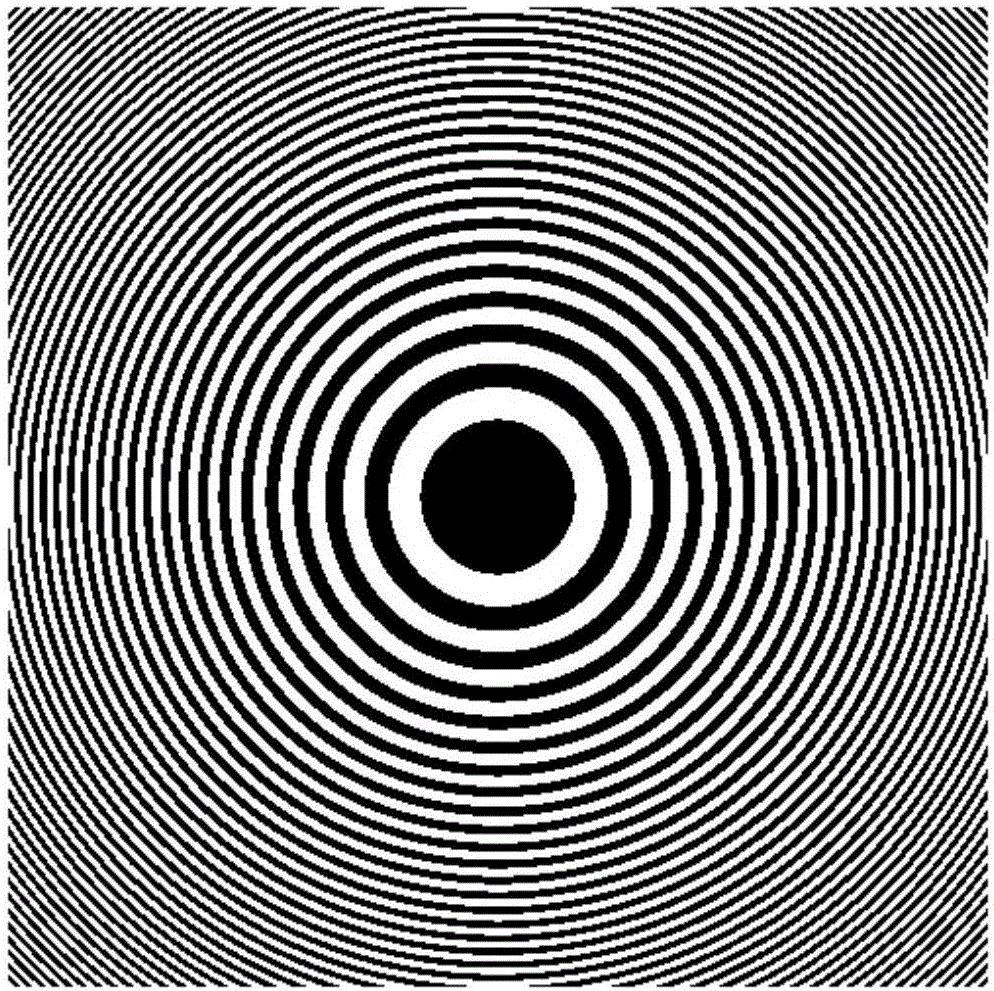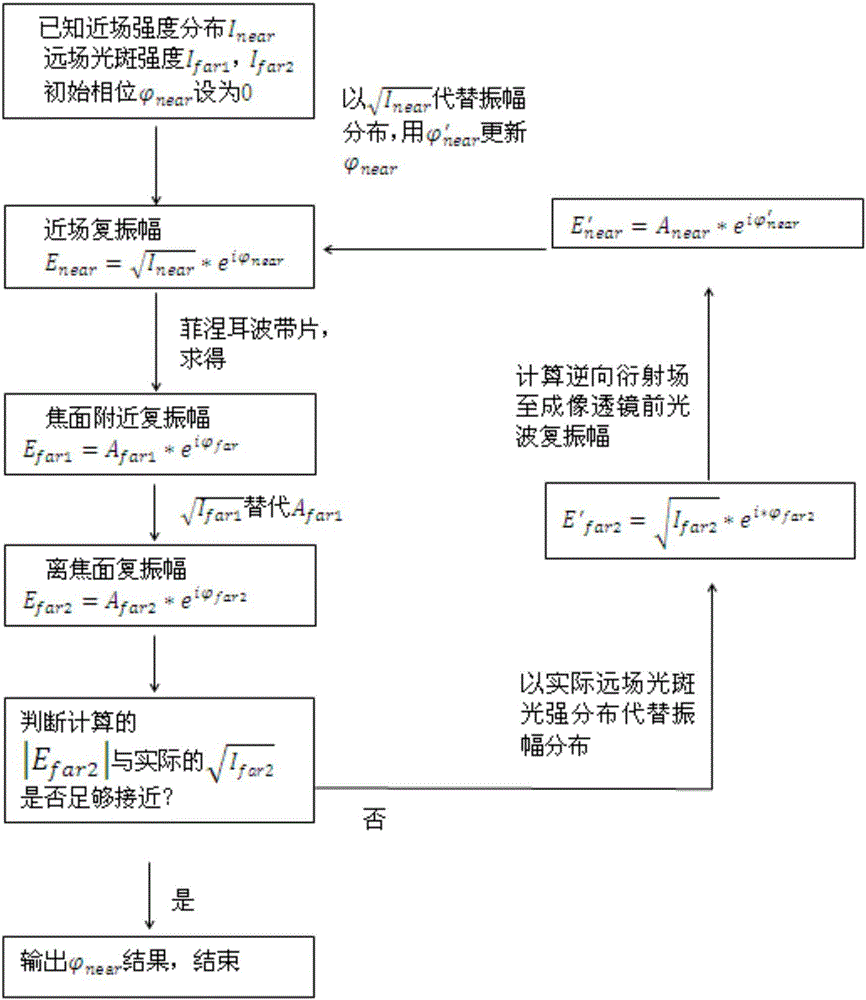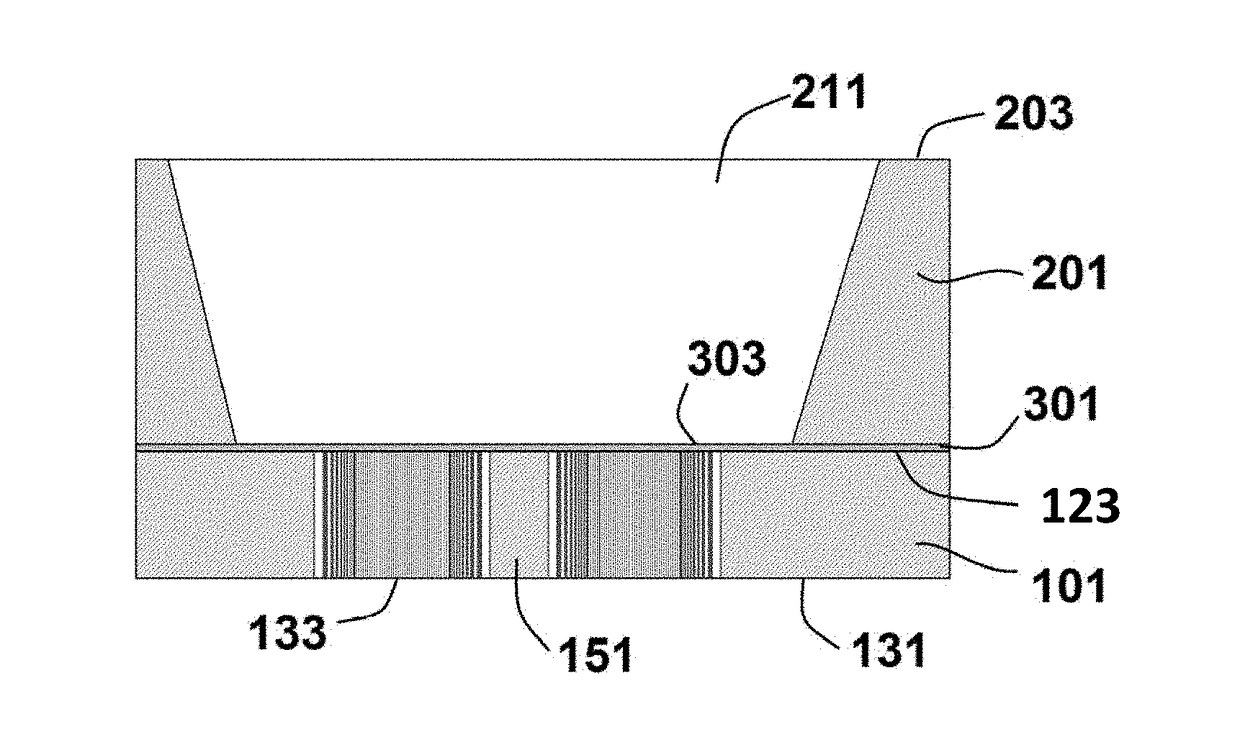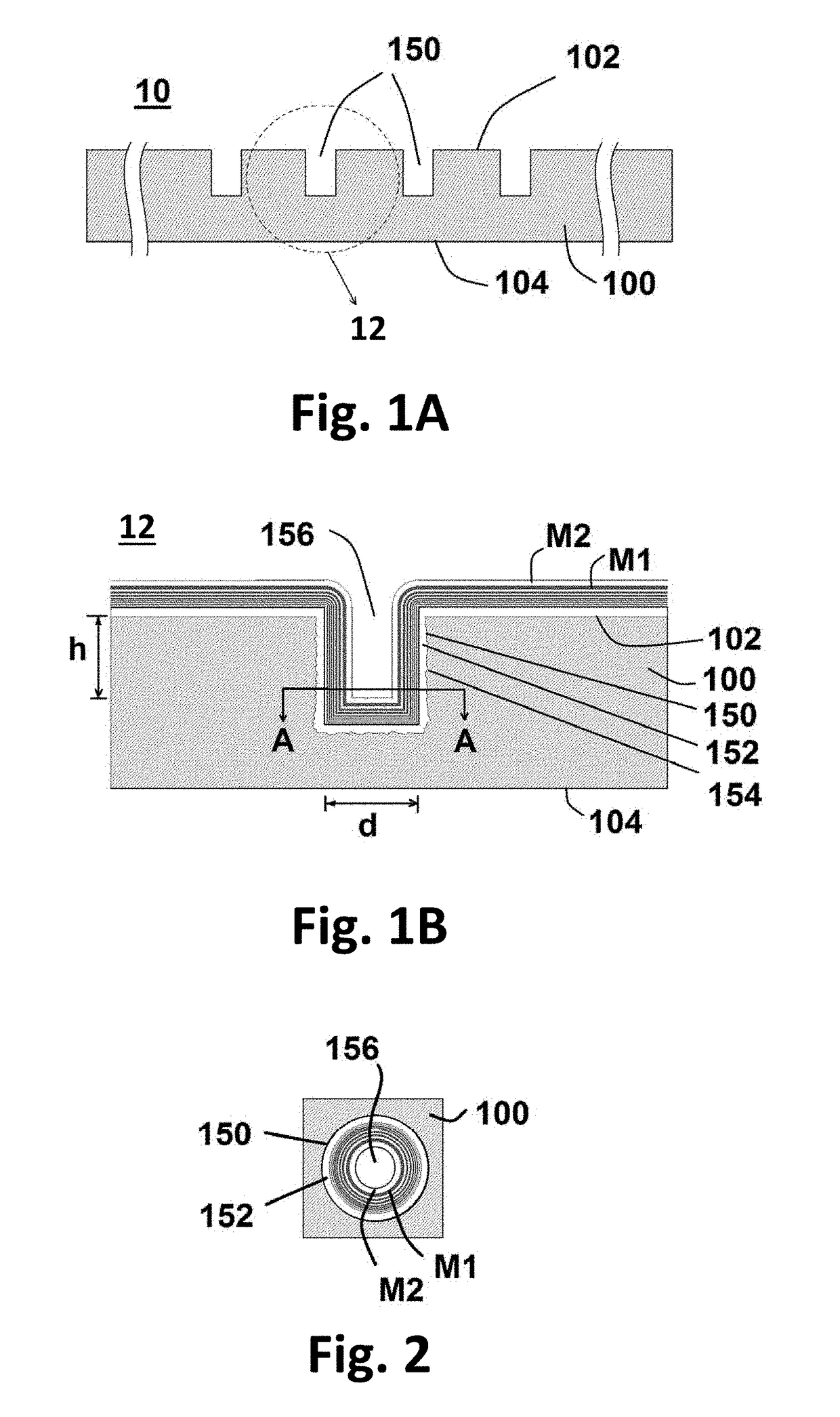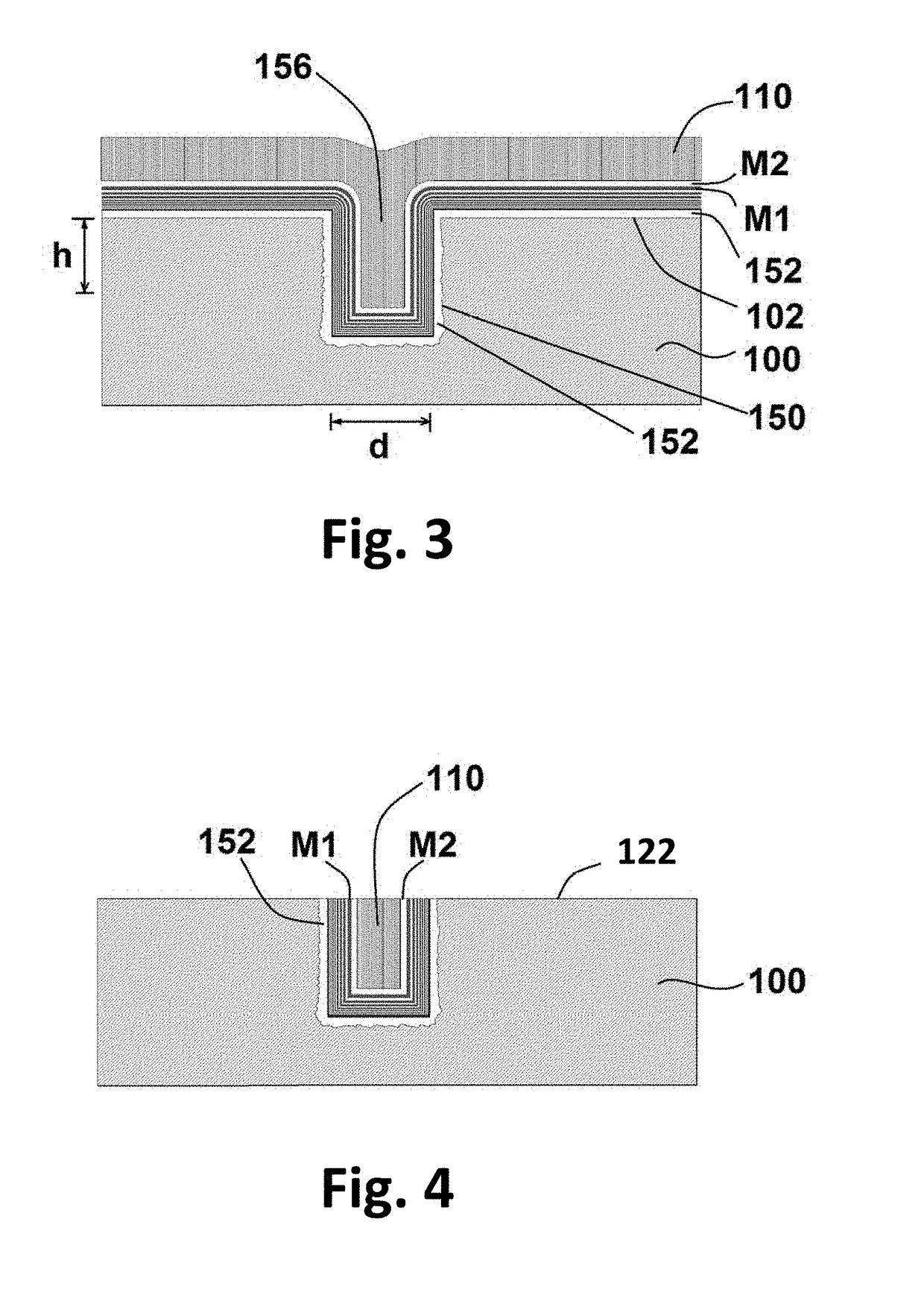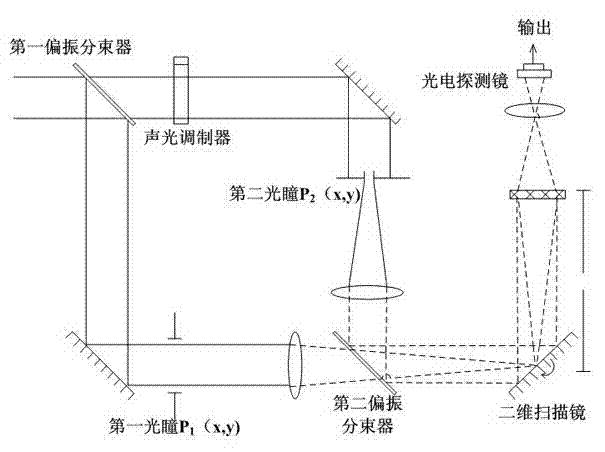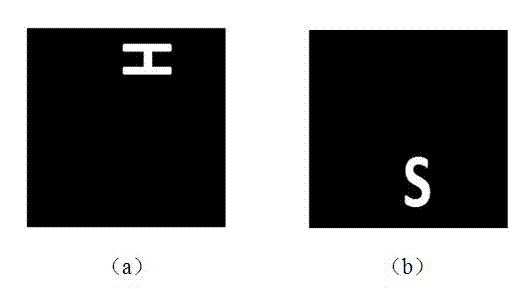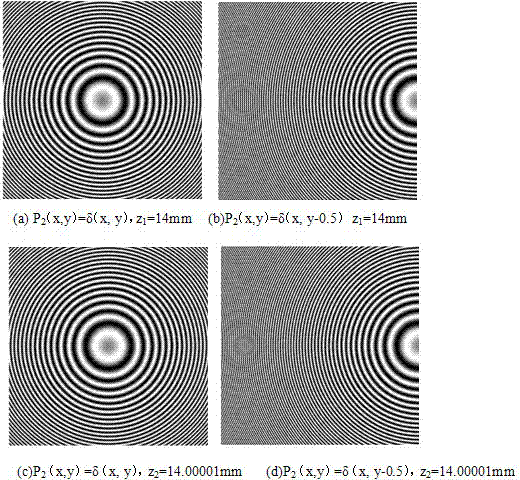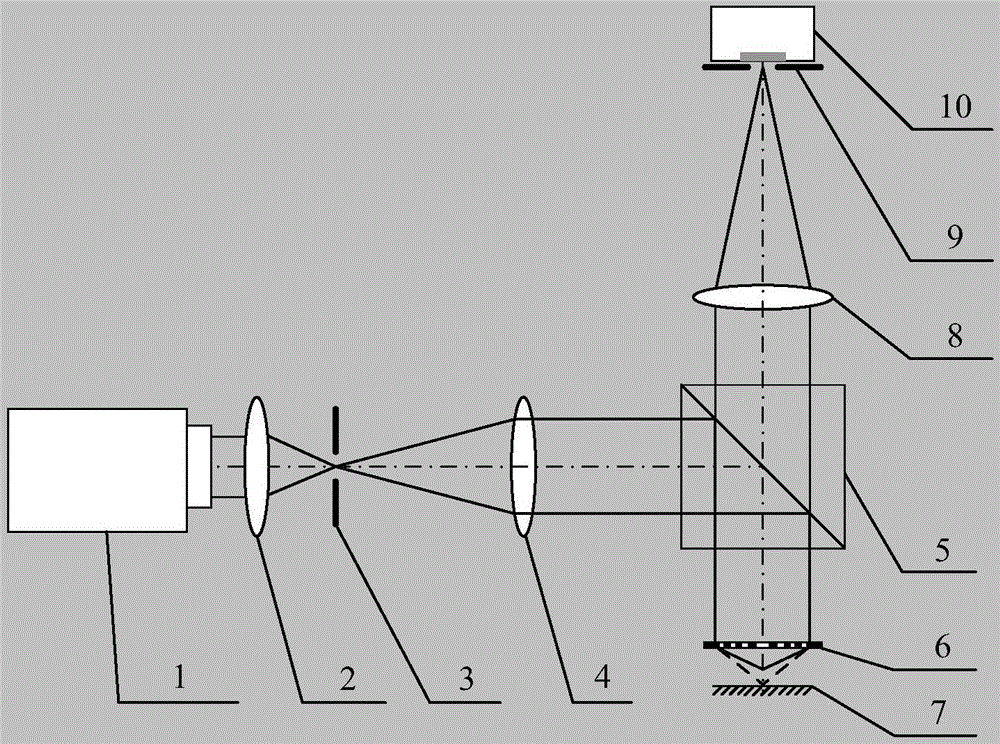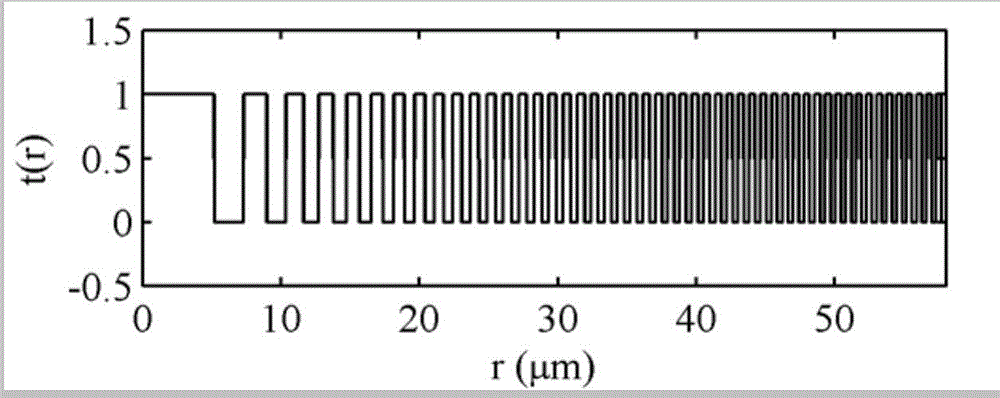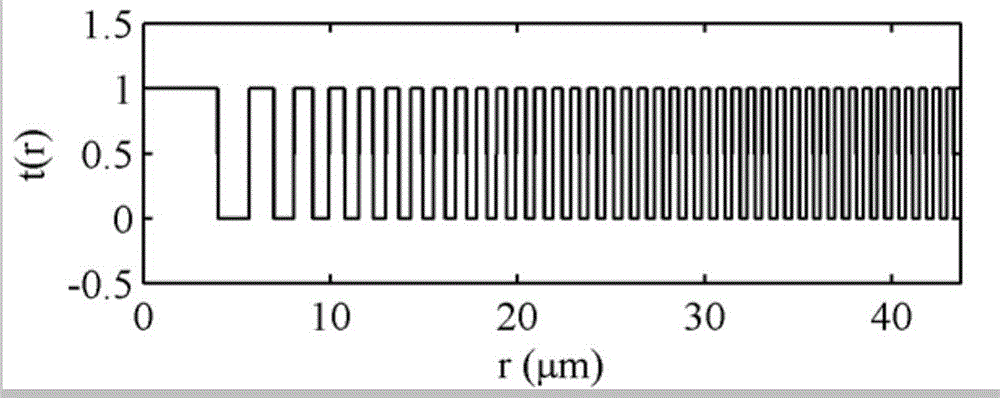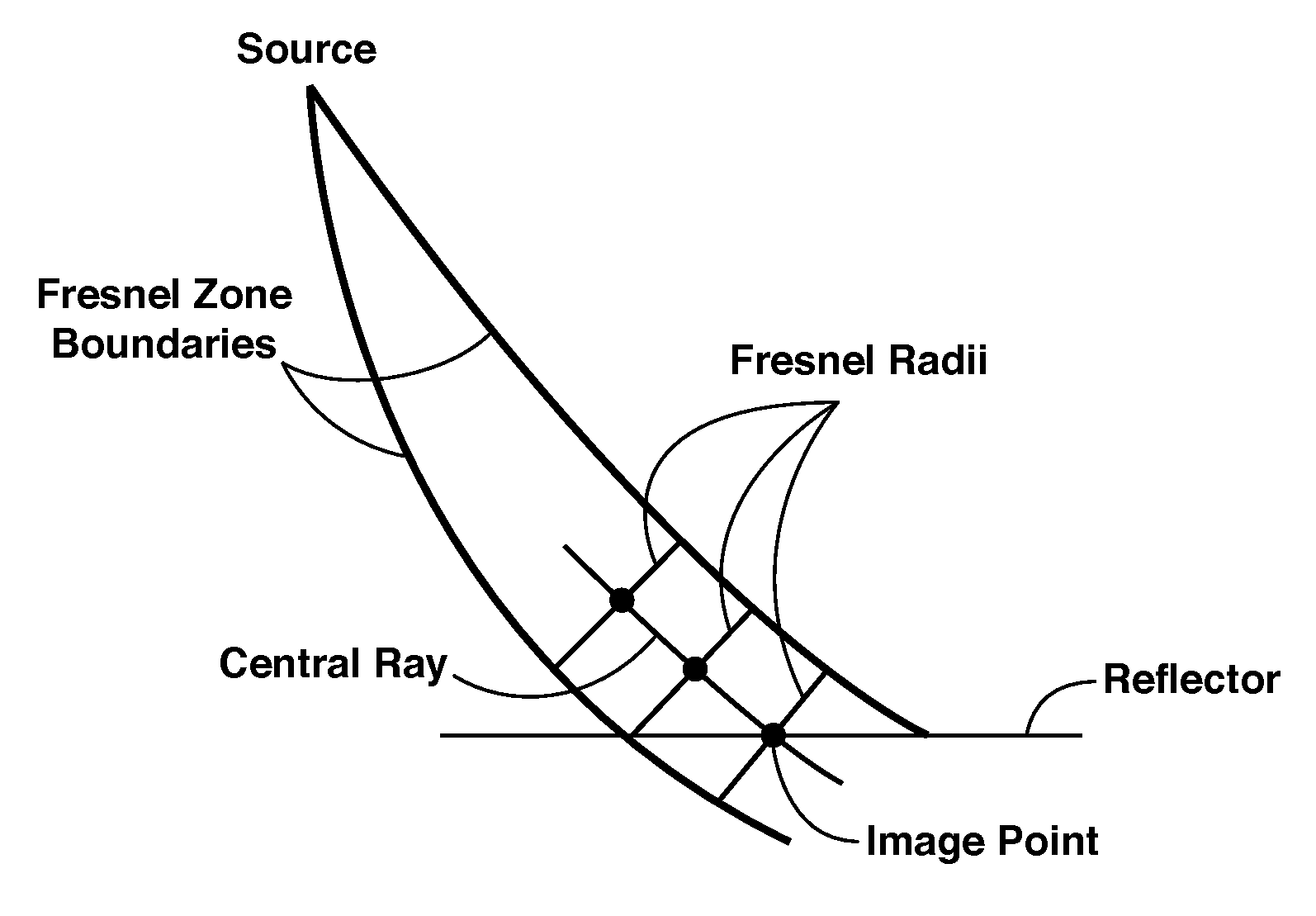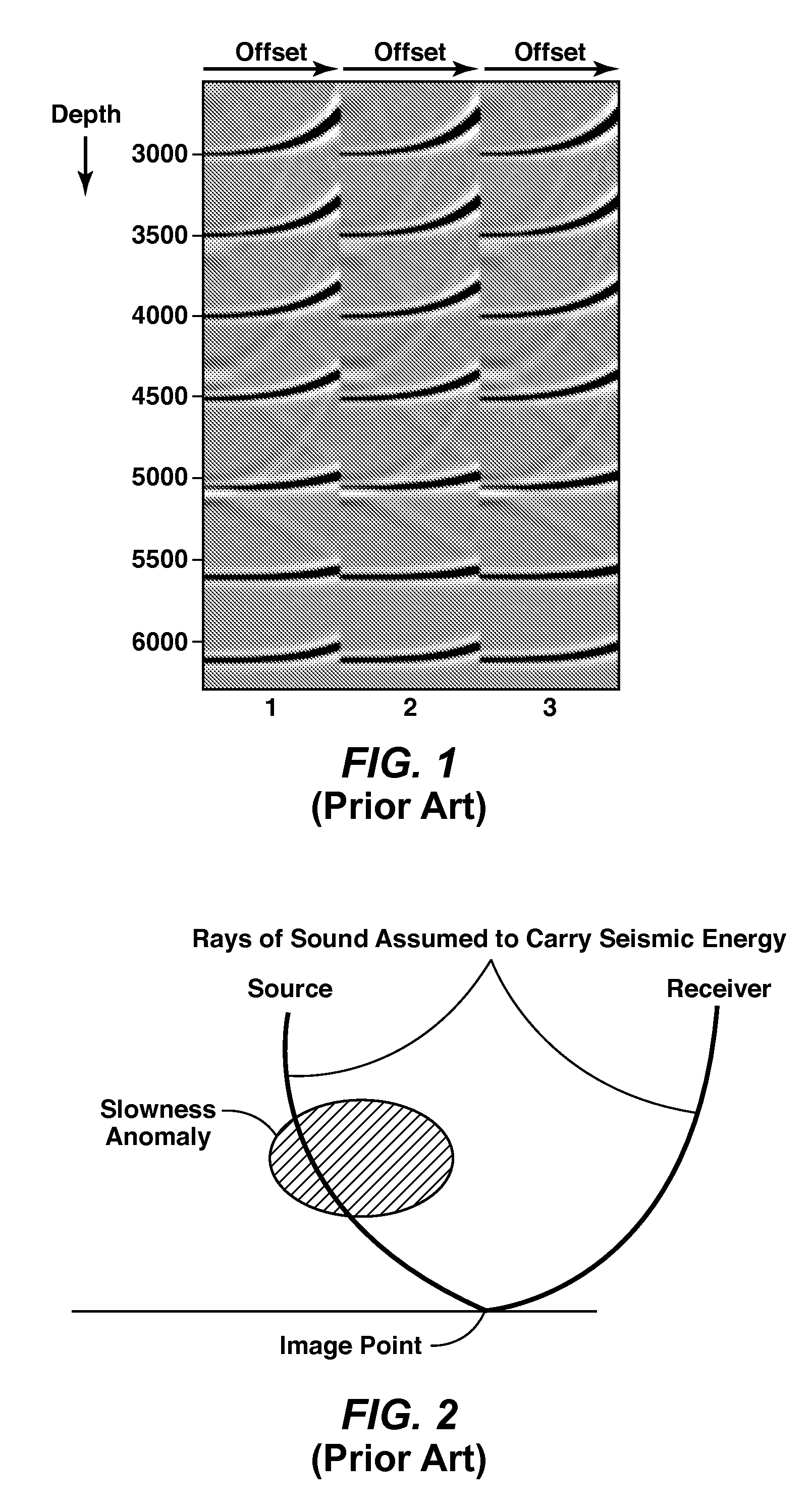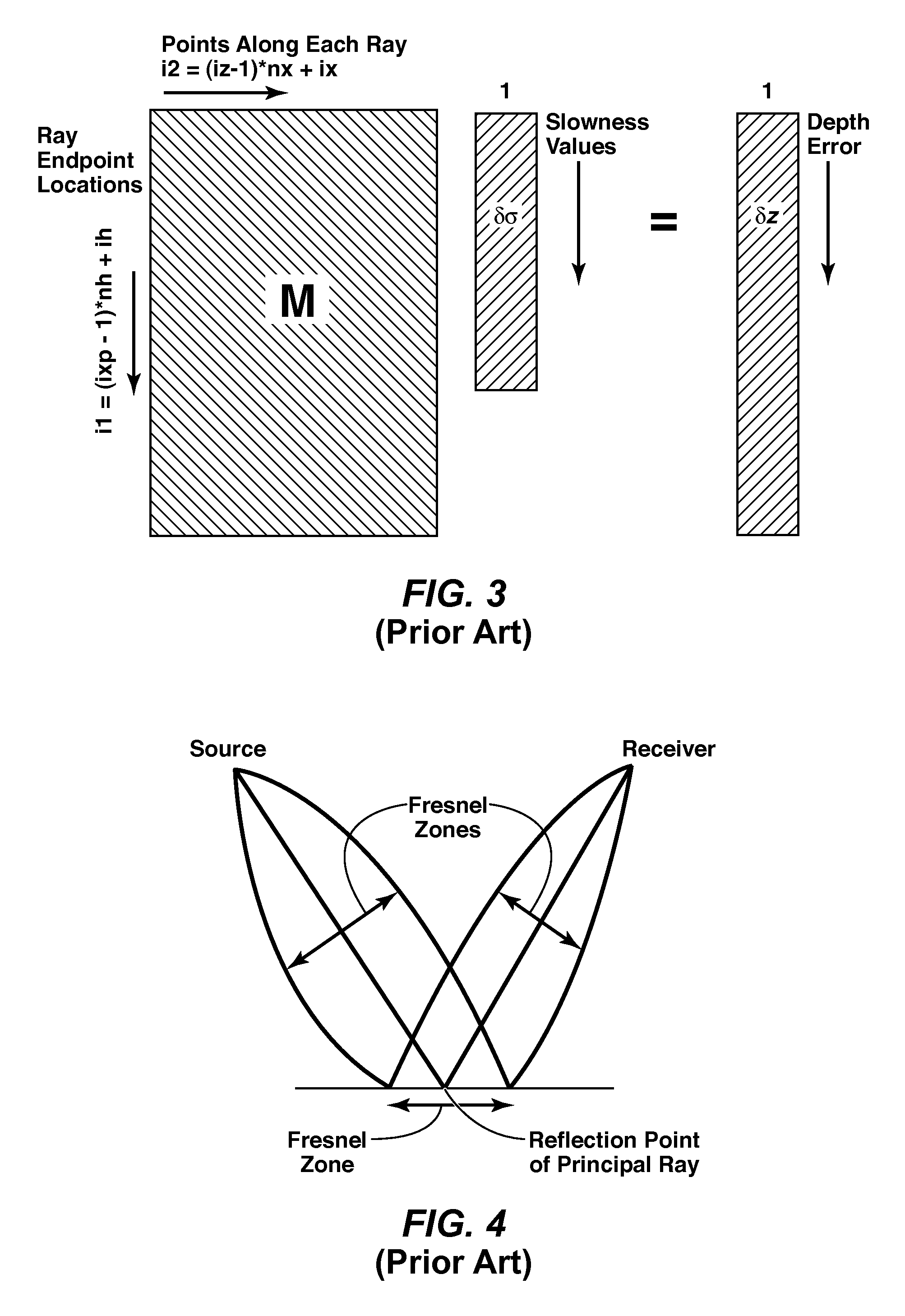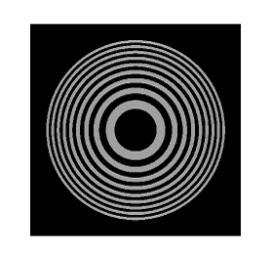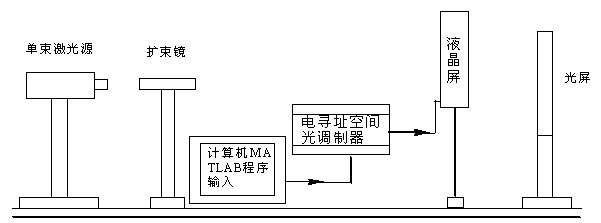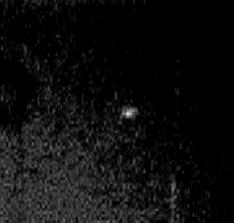Patents
Literature
223 results about "Fresnel zone" patented technology
Efficacy Topic
Property
Owner
Technical Advancement
Application Domain
Technology Topic
Technology Field Word
Patent Country/Region
Patent Type
Patent Status
Application Year
Inventor
A Fresnel zone (/freɪˈnɛl/ fray-NEL), named after physicist Augustin-Jean Fresnel, is one of a series of confocal prolate ellipsoidal regions of space between and around a transmitter and a receiver. Transmitted radio, sound, or light waves can follow slightly different paths before reaching a receiver, especially if there are obstructions or reflecting objects between the two. The waves can arrive at slightly different times and will be slightly out of phase due to the different path lengths. Depending on the magnitude of the phase shift, the waves can interfere constructively and destructively. The size of the calculated Fresnel zone at any particular distance from the transmitter and receiver can help to predict whether obstructions or discontinuities along the path will cause significant interference.
Focusable and steerable micro-miniature x-ray apparatus
ActiveUS20050105690A1Inexpensive to fabricateUse disposableX-ray tube windowsHandling using diaphragms/collimetersX-rayEngineering
A micro-miniature x-ray apparatus comprises: a first chip subassembly including a source of x-rays including both Bremsstrahlung photons and characteristic x-rays; a second chip subassembly including a filter for transmitting the characteristic x-rays and blocking the Bremsstrahlung photons; a third chip subassembly including a movable element for focusing or collimating the transmitted characteristic x-rays into a beam and means for controlling the position of the focusing element. In one embodiment, the controlling means include a micro-electromechanical system (MEMS). In another embodiment, the position of the movable element determines how the x-ray beam is steered to the focal area. In still another embodiment, the x-ray source includes a field emitter electron source and a target responsive to the electrons for generating x-rays. In this case, the x-ray beam is also steered by selectively energizing the anode segments. In yet another embodiment, the movable element includes a Fresnel zone plate; in still another embodiment it includes an array of poly-capillaries. Advantageously, our x-ray source, including its focusing, collimating and steering components, can be fabricated small enough to be mounted at the end of a catheter. In addition, in some embodiments it can also fabricated sufficiently inexpensively to be disposable after each use.
Owner:LUCENT TECH INC
Injection molded microoptics
ActiveUS20070029277A1Minimizes number and task-timesReduces of semiconductor arraysMaterial nanotechnologySolid-state devicesFiberTransformer
A wafer-scale apparatus and method is described for the automation of forming, aligning and attaching two-dimensional arrays of microoptic elements on semiconductor and other image display devices, backplanes, optoelectronic boards, and integrated optical systems. In an ordered fabrication sequence, a mold plate comprised of optically designed cavities is formed by reactive ion etching or alternative processes, optionally coated with a release material layer and filled with optically specified materials by an automated fluid-injection and defect-inspection subsystem. Optical alignment fiducials guide the disclosed transfer and attachment processes to achieve specified tolerances between the microoptic elements and corresponding optoelectronic devices and circuits. The present invention applies to spectral filters, waveguides, fiber-optic mode-transformers, diffraction gratings, refractive lenses, diffractive lens / Fresnel zone plates, reflectors, and to combinations of elements and devices, including microelectromechanical systems (MEMS) and liquid crystal device (LCD) matrices for adaptive, tunable elements. Preparation of interfacial layer properties and attachment process embodiments are taught.
Owner:IBM CORP
Short wavelength metrology imaging system
ActiveUS7268945B2Easy to implementEasy to switchImaging devicesNanoinformaticsHigh resolution imagingSystems design
An extreme ultraviolet (EUV) AIM tool for both the EUV actinic lithography and high-resolution imaging or inspection is described. This tool can be extended to lithography nodes beyond the 32 nanometer (nm) node covering other short wavelength radiation such as soft X-rays. The metrology tool is preferably based on an imaging optic referred to as an Achromatic Fresnel Optic (AFO). The AFO is a transmissive optic that includes a diffractive Fresnel zone plate lens component and a dispersion-correcting refractive lens component. It retains all of the imaging properties of a Fresnel zone plate lens, including a demonstrated resolution capability of better than 25 nanometers and freedom from image distortion. It overcomes the chromatic aberration of the Fresnel zone plate lens and has a larger usable spectral bandwidth. These optical properties and optical system designs enable the development of the AFO-based AIM tool with improved performance that has advantages compared with an AIM tool based on multilayer reflective mirror optics in both performance and cost.
Owner:CARL ZEISS X RAY MICROSCOPY
Reflective lithography mask inspection tool based on achromatic Fresnel optics
InactiveUS6914723B2High resolutionEfficient use ofOptical filtersMaterial analysis by optical meansFresnel lensMask inspection
A mask blank inspection tool includes an AFO having a diffractive lens and a refractive lens formed on a common substrate. The diffractive lens is a Fresnel zone plate and the refractive lens is a refractive Fresnel lens. The AFO is used to image light from a defect particle on a multilayer mask blank or the surface of the multilayer mask blank to a detector.
Owner:XRADIA
LED curing light having fresnel lenses
Disclosed is a LED curing light device for curing of photo-polymerization materials. The device has a plurality of LED sources and a plurality of Fresnel lenses. The LED source is powered and controlled by a drive board and batteries providing high power curing light in the range of 300 to 500 nm and optical power in the range of 100 to 800 mW. The Fresnel lenses couple the curing light efficiently to a focused spot on a curing object
Owner:LIU YONGQIAN
Achromatic fresnel optics for ultraviolet and x-ray radiation
InactiveUS6917472B1Relatively large bandwidthIncrease amplitudeOptical filtersDiffraction gratingsRefractive indexX-ray
An achromatic Fresnel optic that combines a Fresnel zone plate and a refractive Fresnel lens. The zone plate provides high resolution for imaging and focusing, while the refractive lens takes advantage of the refraction index change properties of appropriate elements near absorption edges to recombine the electromagnetic radiation of different energies dispersed by the zone plate. This compound lens effectively solves the high chromatic aberration problem of zone plates. The AFO has a wide range of potential applications in lithography, microimaging with various contrast mechanisms and measurement techniques.
Owner:CARL ZEISS X RAY MICROSCOPY
Achromatic fresnel optics based lithography for short wavelength electromagnetic radiations
InactiveUS6885503B2Simplify System DesignImprove system throughputMirrorsDiffraction gratingsRefractive indexElectromagnetic radiation
A lithography apparatus having achromatic Fresnel objective (AFO) that combines a Fresnel zone plate and a refractive Fresnel lens. The zone plate provides high resolution for imaging and focusing, while the refractive lens takes advantage of the refraction index change properties of appropriate elements near absorption edges to recombine the electromagnetic radiation of different energies dispersed by the zone plate. This compound lens effectively solves the high chromatic aberration problem of zone plates. The lithography apparatus allows the use of short wavelength radiation in the 1-15 nm spectral range to print high resolution features as small as 20 nm.
Owner:XRADIA
Fresnel zone plate based on elastic materials
A dynamically variable, amplitude grating based diffractive optic including: a substantially transmissive, elastic substrate; a substantially opaque, elastic material formed in a predetermined pattern on the first surface of the elastic substrate; and a substrate mount coupled to the elastic substrate to hold it under tension. The predetermined pattern of the substantially opaque, elastic material substrate forms an amplitude grating on the elastic substrate. The substrate mount includes a variable tensioner to stretch the elastic substrate and the substantially opaque, elastic material, thereby allowing at least one optical property of the amplitude grating to be dynamically varied. Alternatively, the elastic substrate may include at least one substantially transparent portion and at least one substantially opaque portion, the substantially opaque portion(s) arranged in a predetermined pattern to form the amplitude grating within the elastic substrate rather than on its surface.
Owner:PANASONIC CORP
Three-dimensional holographic fluorescence microscope
InactiveUS6038041AInvestigating moving sheetsCharacter and pattern recognitionOptical scanning holographyFluorescence microscope
An optical scanning holography system which requires only a two dimensional scan to record three dimensional information from a fluorescent specimen wherein the optical scanning holography is based on scanning the specimen with a Fresnel zone pattern and detecting and decoding the fluorescent light reflected from the specimen. The flourescent light reflected from the specimen contains three dimensional information about the specimen so that once the fluorescent light is detected and decoded a three dimensional image of the specimen can be obtained and displayed using only the two dimensional scan.
Owner:VIRGINIA TECH INTPROP INC
Method for determining adequacy of seismic data coverage of a subsurface area being surveyed and its application to selecting sensor array geometry
InactiveUS20090279388A1Analogue computers for nuclear physicsSeismology for water-covered areasSensor arraySurveyor
A method for marine seismic surveying includes towing a seismic sensors in a plurality of streamers in the water, actuating a seismic energy source in the water at selected times and detecting seismic signals at the sensors resulting from the actuation of the source. A data trace is created for each of the detected signals. At least one Fresnel zone is determined for at least some of the seismic data traces. A contribution of each of the traces to each one of a plurality of bins defined in a predetermined pattern is computed, based on the Fresnel zone associated with each trace. Based on the computed contributions, a maximum lateral distance between corresponding seismic sensors is determined that will result in a contribution sum above a selected threshold.
Owner:APACHE CORPORATION
Method for determining adequacy of seismic data coverage of a subsurface area being surveyed
A method for assessing data coverage in a three dimensional marine seismic survey includes determining at least one Fresnel zone for at least one of a plurality of seismic data traces. A contribution is determined for each of the seismic data traces to each one of a set of bins in a defined pattern. Each contribution is based on the Fresnel zone associated with each seismic data trace. The contributions from all seismic data traces contributing to each bin are summed. The summed contribution for each bin are stored or displayed and the summed contributions in each bin are compared to a selected threshold to determine coverage.
Owner:APACHE CORPORATION
Spectral-domain optical coherence tomography imaging system based on Fresnel spectrometer
ActiveCN102499648AQuick extractionReduced post-processing timePhase-affecting property measurementsDiagnostic recording/measuringFrequency spectrumMichelson interferometer
The invention relates to a spectral-domain optical coherence tomography imaging system based on a Fresnel spectrometer, which is characterized by comprising a Michelson interferometer, the Fresnel spectrometer and a Fourier transformation module. The Michelson interferometer sends coherent light which is formed by superposing sample light returned from various layers of a sample with reference light into the Fresnel spectrometer, the coherent light is emitted onto a Fresnel zone plate parallelly through a collimating lens and an expanded beam lens respectively, and is expanded at the same interval according to the wave number and then projected to a linear array CCDs (charge coupled devices) by the Fresnel zone plate, frequency spectrum data of the coherent light are read by the linear array CCDs and sent to the Fourier transformation module, and then recovered into information of spatial position of the sample by means of discrete Fourier transformation through the Fourier transformation module. The spectral-domain optical coherence tomography imaging system based on the Fresnel spectrometer can be applied to not only spectral-domain optical coherence tomography imaging but also spectral analysis having requirements for wavelength-wave number conversion and resampling for imaging or detecting and required to be expanded uniformly according to the wave number, and especially can be applied to the biomedical imaging process.
Owner:TSINGHUA UNIV
Multifocal intraocular lens
InactiveUS20090240328A1Reduce eye traumatismShorten post-surgical time periodIntraocular lensIntraocular lensVisual acuity
A multifocal intraocular lens is provided having two external refractive surfaces and a longitudinal axis, and a diffractive structure superimposed on one of the surfaces in the form of a Fresnel zone. To reduce eye traumatism during surgery, to shorten post-surgical time period, to increase visual acuity, and to ensure a constant quality image at any distance from an object, a multifocal intraocular lens is proposed in which at least one additional refractive surface is inserted between the two external refractive surfaces, wherein the at least one additional refractive surface divides the lens volume into zones made of materials having different refraction coefficients.
Owner:ICON LAB
Optical waveguide using fresnel lenses
An optical waveguide for a see-through display system using Fresnel lenses is disclosed. This invention enables high efficiency of light utilization, wavelength independence, high resolution and very small form factor. This display system is suitable for head-up-display and wearable display.
Owner:ISHII FUSAO
Injection molded microoptics
ActiveUS7399421B2Minimizes number and task-timesReduces of semiconductor arraysMaterial nanotechnologySolid-state devicesFiberTransformer
A wafer-scale apparatus and method is described for the automation of forming, aligning and attaching two-dimensional arrays of microoptic elements on semiconductor and other image display devices, backplanes, optoelectronic boards, and integrated optical systems. In an ordered fabrication sequence, a mold plate comprised of optically designed cavities is formed by reactive ion etching or alternative processes, optionally coated with a release material layer and filled with optically specified materials by an automated fluid-injection and defect-inspection subsystem. Optical alignment fiducials guide the disclosed transfer and attachment processes to achieve specified tolerances between the microoptic elements and corresponding optoelectronic devices and circuits. The present invention applies to spectral filters, waveguides, fiber-optic mode-transformers, diffraction gratings, refractive lenses, diffractive lens / Fresnel zone plates, reflectors, and to combinations of elements and devices, including microelectromechanical systems (MEMS) and liquid crystal device (LCD) matrices for adaptive, tunable elements. Preparation of interfacial layer properties and attachment process embodiments are taught.
Owner:INT BUSINESS MASCH CORP
Method for determining adequacy of seismic data coverage of a subsurface area being surveyed and its application to selecting sensor array geometry
InactiveUS7944774B2Seismic signal receiversAnalogue computers for nuclear physicsSensor arraySurveyor
Owner:APACHE CORPORATION
Three-dimensional dip angle domain stationary phase pre-stack time migration method and system
ActiveCN104297789AImprove signal-to-noise ratioSuppress offset noiseSeismic signal processingStationary phaseSignal-to-noise ratio (imaging)
The invention discloses a three-dimensional dip angle domain stationary phase pre-stack time migration method and system. The method comprises the steps that pre-stack seismic data are read, and a migration speed field and a stretching and removing parameter are determined; according to the migration speed field and the stretching and removing parameter, two dip angle channel sets corresponding to dip angles in the directions parallel to and perpendicular to a measuring line respectively are generated through a selected imaging line; based on the two dip angle channel sets on the selected imaging line, Fresnel zones in the two dip angle directions are picked up, and the Fresnel zones of all imaging points on a quasi imaging block are obtained through interpolation; through the obtained Fresnel zones of all the imaging points, three-dimensional stationary phase pre-stack time migration is carried out, and migration results corresponding to different migration distances are obtained; the migration results of three-dimensional stationary phase pre-stack time migration are collected, and a three-dimensional imaging data body is formed; the three-dimensional imaging data body is converted into a profile image of an underground reflection structure. According to the method and system, the problem that when a high dip angle structure exists, the signal to noise ratio of the migration image obtained through an existing migration imaging technology is low is effectively solved.
Owner:INST OF GEOLOGY & GEOPHYSICS CHINESE ACAD OF SCI
Phase recovery detection device and phase recovery method based on Fresnel zone plate diffraction information fusion
ActiveCN110470245ARealize acquisitionFast convergenceMicroscopesUsing optical meansLight spotLight beam
The invention discloses a phase recovery detection device and a phase recovery method based on Fresnel zone plate diffraction information fusion. The device includes a laser, an attenuation mirror, amicroscope objective, a small-hole filter, a collimating objective, a to-be-measured component, a Fresnel zone plate, and an image acquisition device, which are sequentially arranged along a directionof an optical path. The device utilizes the Fresnel zone plate instead of a traditional lens as a light beam convergence component, and utilizes a multi-focal characteristic of the Fresnel zone plateto make a collected diffraction light spot contain more diffraction information. The method performs recovery by utilizing diffracted light intensity distribution modulated by the Fresnel zone plate,and can achieve reconstruction of a to-be-measured wavefront wider frequency band. The device is simple and can achieve acquisition of diffraction information in a wide frequency band without changing a defocus position, and the method has higher algorithm convergence speed and wavefront reconstruction precision, and is high in precision when a large wavefront errors in the wide frequency band isdetected.
Owner:ZHEJIANG UNIV
Scattered wave pre-stack imaging method for identifying small-fault throw breakpoints
The invention relates to a scattered wave pre-stack imaging method for identifying small-fault throw breakpoints, which is applied to processing of seismic reflection information in seismic exploration and is of a seismic imaging method of a micro-small fault for identifying the underground geological structure. According to the method, scattered waves of the breakpoints of the fault are utilized for independent imaging of the breakpoints with the fault throw of less than 1 / 4 wavelength, which are difficult to identify by conventional reflected wave migration. According to the method, the existing seismic reflection information is utilized, and the independent imaging of the small breakpoints is realized by pressing the energy of transmitted waves in pre-stack migration calculation and utilizing the polarity inversion characteristic of the scattered waves of the breakpoints. Pre-stack time migration is taken as the basis, an angle gather is generated by migration of single-shot information, and a Fresnel zone corresponding to an inphase axis of reflected waves is excised so as to eliminate the transmitted waves. According to the method, the small fault and breakpoints of the underground structure can be indicated in a fine manner, migration and plugging of underground oil gas can be better known, and the method further has an important application value for exploration and development of oil gas resources. The ability to identify the underground deep fissures and fault of the seismic exploration method is significantly improved.
Owner:INST OF GEOLOGY & GEOPHYSICS CHINESE ACAD OF SCI
Volume Fresnel zone plates fabricated by laser direct writing
ActiveUS7969654B1High diffraction efficiencyOptical articlesOptical elementsDirect writingNumerical aperture
A volume Fresnel zone plate and a method of producing such a device using a femtosecond laser for direct writing of zone plates. A volume zone plate has a number of Fresnel zone plate layers designed to focus light coherently to a single spot. Embodiments include both low numerical aperture (NA) and high NA zone plates, and provide a significant increase in overall diffraction efficiency over a single Fresnel zone plate.
Owner:PURDUE RES FOUND INC
Fresnel lens device
ActiveCN106226930AFunctional impactRealize the transmission functionNon-linear opticsFresnel lensRefractive index
The invention discloses a Fresnel lens device, belonging to the technical field of optical devices. The device comprises a first transparent substrate, a second transparent substrate and a liquid crystal layer filled between the first and second transparent substrates, wherein the first transparent substrate is a Fresnel lens; grooves distributed at intervals according to a Fresnel zone are formed in the side, facing the liquid crystal layer, of the Fresnel lens; the second transparent substrate is used for controlling the states of liquid crystals in the liquid crystal layer to enable the refractive index of the polarized light entering the liquid crystals when passing through the liquid crystals to switch between the first refractive index of the liquid crystals and the second refractive index of the liquid crystals; the first refractive index is greater than the second refractive index; the refractive index of the Fresnel lens is equal to the first refractive index of the liquid crystals in the liquid crystal layer. The device has the beneficial effect that switching of the function of the Fresnel lens between condensation and transmission is achieved by controlling the states of the liquid crystals with the second transparent substrate.
Owner:BOE TECH GRP CO LTD
Fresnel zone imaging system and method
ActiveUS8038620B2Ultrasonic/sonic/infrasonic diagnosticsInfrasonic diagnosticsApodizationFresnel zone
A method for Fresnel zone imaging is provided. The method comprises identifying a plurality of constructive regions and a plurality of destructive regions in an energy transmitting device and converting the destructive regions to the constructive regions by using an apodization profile. The apodization profile comprises apodization values for each constructive region and destructive region and the apodization values comprise real numbers.
Owner:GENERAL ELECTRIC CO
Near-surface tomographic velocity analysis method
InactiveCN104570106ASolve the problem of solving instabilityTrue portrayalSeismic signal processingWave equationClassical mechanics
The invention discloses a near-surface tomographic velocity analysis method. The near-surface tomographic velocity analysis method comprises the following steps: picking up travel time of first arrival by aiming at pre-stack data, and obtaining an initial model reflecting underground medium velocity distribution by pre-stack processing; performing a shortest path ray tracing method on the model to obtain simulated travel time; performing wave field simulation on the model by utilizing a frequency domain wave equation to obtain a sensitive kernel function reflecting disturbance of a medium to the travel time; establishing a corresponding inversion equation and solving to obtain a slowness updating amount. According to the tomographic velocity analysis based on the Fresnel zone, the problem that the solution of a large-scale sparse matrix is instable during the traditional temographic velocity analysis based on the ray theory is solved, and the seismic wave propagation rule is more truly portrayed; the near-surface tomographic velocity analysis method has the advantages that the physical geography significance is obvious, the stability is strong, the efficiency is high, and calculation results are more real and reliable.
Owner:CHINA PETROLEUM & CHEM CORP +1
Fiber lens with fresnel zone plate lens and method for producing the same
InactiveUS20090202202A1Convenient ArrangementEasy to manufactureLamination ancillary operationsOptical fibre with graded refractive index core/claddingFresnel lensFiber
A Fresnel lens-integrated optical fiber that can be easily aligned and manufactured in miniature, and a method of fabricating the same are provided. The Fresnel lens-integrated optical fiber includes a light transmission section transmitting incident light, a light expansion section coupled to the light transmission section and expanding light provided from the light transmission section, and a Fresnel lens surface formed on a section of the light expansion section and focusing by passing through the light expanded in the light expansion section at a predetermined focal length. Accordingly, since the Fresnel lens surface has no curvature, arrangement of an optical coupling system is easy, manufacture is easy, and the optical coupling system can be miniaturized.
Owner:GWANGJU INST OF SCI & TECH
Wavefront detection method based on Fresnel zone plate
ActiveCN106338343AShorten the lengthOvercoming the problem of imprecise detectionOptical measurementsOptical elementsWavefrontLight spot
The invention provides a wavefront detection method based on a Fresnel zone plate. Distortion wavefront passes the Fresnel zone plate, images are collected at position near the focal plane and far from the focal plane of the zone plate respectively, and an input waveform can be recovered accurately by utilizing the two images as well as the relative defocusing amount therebetween. The Fresnel zone plate belongs to a light and thin focusing element, the length of an optical path can be shortened greatly by utilizing the short focus of the Fresnel zone plate, and the problem that information detection for light spots in the focal plane is not accurate enough under large apertures can be overcome by utilizing the characteristic that the size of light spots near the focal plane is strict and the size of light spots in the focal plane is larger. The method of the invention is suitable for wide-aperture and super-wide-aperture wavefront detection, and has significance in lightweight wavefront inversion.
Owner:INST OF OPTICS & ELECTRONICS - CHINESE ACAD OF SCI
Batch-processing method for super-high aspect ratio diffractive optics
ActiveUS20170256330A1Well representedConfers robustnessHandling using diffraction/refraction/reflectionVacuum evaporation coatingOptical propertyPlanar substrate
A method for fabrication of diffractive optics by batch processing is disclosed, having applicability to high resolution ultra-high aspect ratio Fresnel Zone Plates for focusing of X-rays or gamma-rays having energies up to hundreds of keV. An array of precursor forms is etched into a planar substrate. Sidewalls of the forms are smoothed to a required surface roughness. A sequence of alternating layers of different complex refractive index, for binary or higher order diffractive optics, are deposited on the precursor forms by atomic layer deposition (ALD), to provide diffractive line patterns. Thinnest layers may have nanometer thicknesses. After front surface planarization and thinning of the substrate to expose first and second surfaces of the diffractive line patterns of the diffractive optic, the height h in the propagation direction provides a designed absorption difference and / or phase shift difference between adjacent diffractive lines. Optionally, post-processing enhances mechanical, thermal, electrical and optical properties.
Owner:ALCORIX CO
High-resolution optical scanning holographic slice imaging method based on variable pupils
InactiveCN102920438AHigh resolutionEasy to implementDiagnostic recording/measuringSensorsPupilScanning mirror
The invention discloses a high-resolution optical scanning holographic slice imaging method based on variable pupils, belongs to the field of optical scanning and mainly solves problems of large out-of-focus noises existing when images of any two-dimensional slice are reconstructed in the prior art. According to the method, a two-dimensional scanning mirror is used for controlling deflection of a first Fresnel zone plate so as to achieve primary two-dimensional scanning of an object to be detected to obtain a first matrix equation; after a second pupil is deflected, the two-dimensional scanning mirror controls deflection of a second Fresnel zone plate so as to achieve secondary two-dimensional scanning of the object to be detected to obtain a second matrix equation; and the two matrix equations are combined, and a conjugate gradient algorithm is introduced to achieve slice imaging. According to the high-resolution optical scanning holographic slice imaging method based on the variable pupils, by means of the technical scheme, high-accuracy slice imaging is achieved, the out-of-focus noises are greatly reduced, and the method is applicable to each optical field for acquiring slice imaging.
Owner:UNIV OF ELECTRONIC SCI & TECH OF CHINA
Wavelength scanning confocal micro-displacement measurement device and method
ActiveCN106767431AAvoid mechanical propertiesAvoid disturbanceUsing optical meansAxial displacementMeasurement device
The invention provides a wavelength scanning confocal micro-displacement measurement device and a method. In a confocal microscope optical path system, a wavelength tunable laser is used for carrying out illumination; a Fresnel zone plate is used for carrying out focus point illumination; according to the axial color difference focal shift characteristic, axial scanning of focus light spots is achieved through wavelength scanning; a confocal pinhole photoelectric detection unit is used for detecting confocal axial optical chromatography response output; for the disperse wavelength lambda<n> = lambda<min> + (n-)deltalambda, n = 1, 2, ..., 11, obtaining the axial optical chromatography displacement-intensity response, wherein the lambda<min> is the wavelength lower limit, the wavelength upper limit is lambda<max> = lambda<min> + 10deltalambda, and the deltalambda is the wavelength stepping interval; peak value positions of the optical chromatography response curves form a linear calibration relation searching table of illumination wavelengths and axial displacement; and fine wavelength scanning is executed for each characteristic point of a to-be-measured sample for once, and actual displacement of each point is calculated according to the peak value of each response curve and the searching table. Thus, measurement of micro-displacement or relative height is finished, and the method is suitable for precise measurement of micro displacement, film thickness, nano steps and the like.
Owner:XI AN JIAOTONG UNIV
Fresnel Zone Fat Ray Tomography
ActiveUS20120010820A1Seismic signal processingSpecial data processing applicationsTomographyImaging technique
A stable method for using fat-ray tomography to determine a high-resolution velocity model of the subsurface from seismic data (71). The velocity model (72) may be used in migrating the seismic data (76) to image the subsurface. Rays are traced from a subsurface reflection point to surface source and receiver locations (73), using Fresnel zone construction methods (74) that honor correct initial conditions, with the Fresnel radius being a function of velocity.
Owner:EXXONMOBIL UPSTREAM RES CO
Method for realizing varifocal lens based on liquid crystal space optical modulator
The invention discloses a method for realizing varifocal lens based on a liquid crystal space optical modulator. The method comprises the following steps: according to the phase modulating principle of the liquid crystal space optical modulator, controlling the liquid crystal space optical modulator to modulate an incident light wave to generate a kinoform, diffracting the incident light wave into a converging spherical wave, and changing radius and zone number of a Fresnel zone plate in the kinoform to realize the variable focus of a program-control varifocus imaging system established by the liquid crystal space optical modulator. The method provided by the invention can be used for improving the automatic varifocus precision and the varifocus response speed of the varifocus imaging system, so that the focal distance of the lens is variable and easy to control.
Owner:SUZHOU UNIV OF SCI & TECH
Features
- R&D
- Intellectual Property
- Life Sciences
- Materials
- Tech Scout
Why Patsnap Eureka
- Unparalleled Data Quality
- Higher Quality Content
- 60% Fewer Hallucinations
Social media
Patsnap Eureka Blog
Learn More Browse by: Latest US Patents, China's latest patents, Technical Efficacy Thesaurus, Application Domain, Technology Topic, Popular Technical Reports.
© 2025 PatSnap. All rights reserved.Legal|Privacy policy|Modern Slavery Act Transparency Statement|Sitemap|About US| Contact US: help@patsnap.com
